




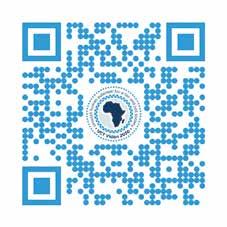
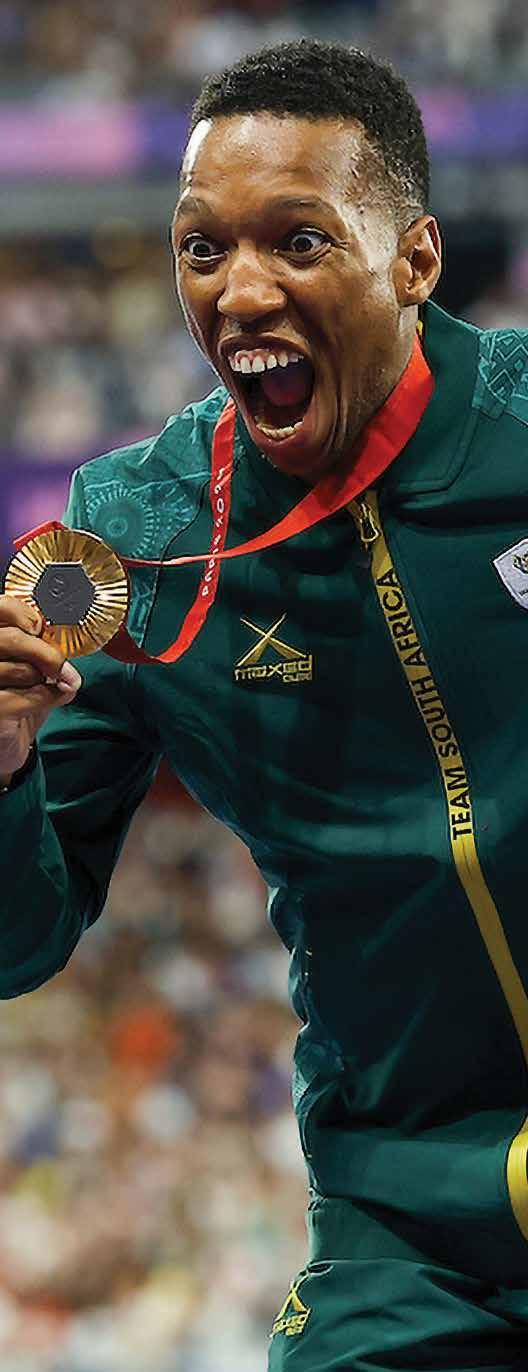
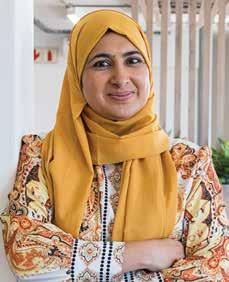
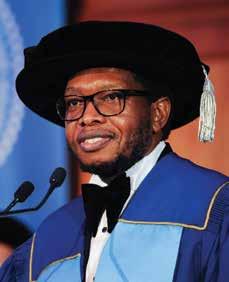

Message from the UCT President of Convocation: Naadiya Moosajee
ALUMNI PROFILE
Meet the new UCT VC: Professor Mosa Moshabela
42 FEATURE UCT bids farewell to a blue-blooded UCT giant – Royston Pillay 10




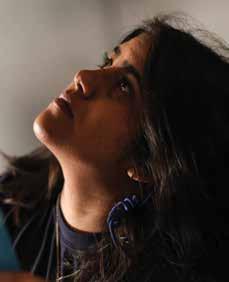
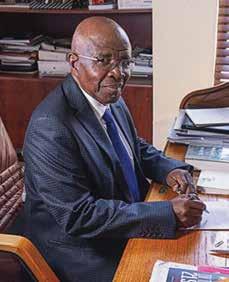
Neville Isdell: take it to the limit one more time...
ALUMNI
Santi Naidoo –film producer making her mark in
Nkuhlu:

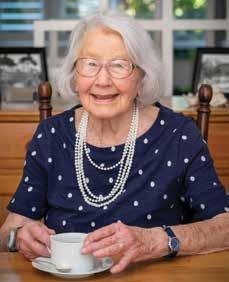
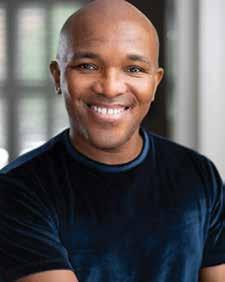
86
ALUMNI PROFILE
Keith Boyd: On foot from Cape to Cairo in 301 days
98
MAIL & GUARDIAN TOP 200 UCT’s recipients of the M&G 200 Young South Africans awards
95
ALUMNI PROFILE
Jocelyne KaneBerman – maverick, groundbreaker 110
ALUMNI PROFILE
Sandile Gotsana’s musicl journey
119
RHODES SCHOLARS UCT’s Rhodes Scholarship recipients for 2025
122
EVENTS UCT Day: building a spirit of generosity
CONTRIBUTORS
WORDS
Chris Mitchell
Kamva Somdyala
Katherine Wilson
Lisa Templeton
Niemah Davis
Rebecca Crowie
Selomina Phekelela
PICTURES
David Fisher
Je’nine May
Lerato Maduma
Nasief Manie
Robin Thuynsma
Robyn Walker
DESIGN & LAYOUT
Kite brand agency
PRODUCED BY UCT Development and Alumni Department
COVER PHOTO
Vice Chancellor Mosa
Moshabela at UCT Day
Credit: David Fisher
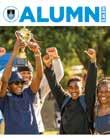

UCT aspires to become a premier academic meeting point between South Africa, the rest of Africa and the world. Taking advantage of expanding global networks and our distinct vantage point in Africa, we are committed through innovative research and scholarship, to grapple with the key issues of our natural and social worlds. We aim to produce graduates whose qualifications are internationally recognised and locally applicable, underpinned by values of engaged citizenship and social justice. UCT will promote diversity and transformation within our institution and beyond, including growing the next generation of academics.
UCT is a global university in Afrika unleashing human potential to create a fair and just society. UCT’s Vision 2030 has three core pillars: Excellence, Transformation and Sustainability. Find out more at: https://uct.ac.za/transformation/vision-2030

As the newly installed 11th Vice-Chancellor of the University of Cape Town, I greet you all. I am honoured and humbled to take on this role and responsibility and appreciative of the measure of trust and confidence bestowed upon me.
It is with great pride and a deep sense of connection that I address you in this edition of our alumni news magazine. Whether you graduated last year or decades ago, you remain an integral part of the rich tapestry of the University of Cape Town.
UCT continues to stand as a beacon of excellence, resilience, and transformation on the African continent. Over the past year, we have made significant strides in research, innovation, and social impact. Our scholars have not only pushed the boundaries of knowledge but have also applied their expertise to tackle pressing global challenges, from climate change to health inequities.
At the heart of this progress is our unwavering commitment to fostering an environment that nurtures excellence, inclusivity, and diversity. This commitment reflects the vision that has guided UCT throughout its history and that continues to drive us toward building a just and sustainable future.
The bond between UCT and its alumni community remains one of our greatest strengths. Your achievements inspire current students, your support bolsters the university’s endeavours, and your voices remind us of the impact a UCT education can have across the globe. Together, we are shaping not only the future of this institution but also the communities and industries we serve.
UCT announced Vision 2030 four years ago, the central mission of which is to unleash human potential to create
a fair and just society. I look forward to the future as we journey together, consolidating the three missions and exploring the fourth mission – positioning UCT as a catalyst for change in Africa, while embracing our African values of ubuntu – “I am because you are”, lifting others as we rise and leaving no one behind. And doing this with compassion.
UCT is not just the bricks and mortar, but all of us – past, present and future generations! We encourage you to stay engaged with us, whether through mentorship, collaboration, becoming a donor, or simply sharing your own journey. Let us continue to build a network that spans continents and changes lives.
I invite you to enjoy reading this issue of UCT Alumni News and hope you find inspiration and delight in celebrating the many and varied achievements of students, staff and alumni across the globe. As you read through these pages, I hope you will feel a sense of pride in your alma mater’s achievements and the enduring legacy of UCT alumni. From groundbreaking research to stories of resilience and success, these narratives reflect the spirit of possibility and purpose that defines UCT.
This is your community and you have a valuable part to play in all that happens here. Thank you for your ongoing commitment to UCT. Together, we are rewriting the story of what is possible.
May 2025 be a fruitful and enjoyable year of growth and progress.
Sincerely
Professor Mosa Moshabela Vice-Chancllor
Alumni News interviewed Naadiya Moosajee, President of UCT Convocation about her role as president and her vision for convocation and what she would like to achieve while she holds this position. Naadiya has come up with ten goals she would like to achieve.
Naadiya, who completed a BSc and Masters’ degree in Civil Engineering at UCT, is a serial social entrepreneur by passion, co-founder of WomHub and many other businesses. She has a passion for fostering female-led innovations in STEM and equitable tech. During her Masters’ degree at UCT, Naadiya started WomEng programmes on campus to attract and support more female students in the field of engineering. Naadiya won third prize for her programme in an Outstanding Leadership awards. The prize was an international university exchange and she chose to go to Stuttgart in Germany, a place she didn’t even know existed on a map. When she arrived there in late August, she was expecting it to be really cold and was equipped with boots and a warm coat, only to discover that it was 35 degrees. She had an amazing different worldly experience there for eight months as part of her masters, before returning to graduate at UCT.
Alumni News (AN): Please tell us about your role as President of Convocation?
Naadiya Moosajee (NM): I lovingly refer to it as a position where I kiss babies and wave and smile – it is a way of galvanizing people, not a political role. As convocation we have little say over what the university governance looks like, however we are accountable to the voice of the alumni and
I would like to be able to bring alumni back to the university and this is the space where we can do it. From my position, I can write to the vice chancellor and the minister with that voice.
AN: What are you hoping to achieve while President of Convocation from 2023 to 2027?
NM: I have ten things I would like to leave in my legacy as president, which are as follows:
1. One of my most important goals is to connect the university with its alumni, to re-engage alumni and bring them back to the university. It is about finding opportunities for UCT to connect with alumni, who also really want to connect with each other.
2. Plugging and filling the gap that prevents students from graduating and getting their degree. Often students can’t graduate because they owe a small amount of money, which could range from a few hundred rand or from R10 000 to R25 000. We need to support current and future students in being able to graduate and overcome challenges. We don’t want students to feel that ‘I was privileged enough to go to UCT, but I wasn’t privileged enough to graduate because I don’t have the money.’
3. Prosper for success: leveraging the strong alumni networks for the next generation so that everybody prospers. Providing young graduating students with mentors, finding first jobs or creating job opportunities.
4. Recognising incredible alumni around the world who are doing amazing things. We have the president of convocation medal which we award annually but we need to be thinking about broader awards for multiple categories. For people doing amazing things in their personal and professional capacity. This will elevate the status of the university.
5. Connecting alumni to a broader legacy that they leave behind with the university. Encouraging others to bequeath money to UCT in your will, through the Legacy Society. We need to ask, ‘What do I want to leave behind?’ When I had Covid and was really ill, I realized I wanted to put something in my will and make sure that a girl like me can go to university and study engineering.
6. I want to have people more engaged at the university and not just at the AGM of convocation. We need to ensure we connect alumni back in-person for a variety of tasks/activities - prioritising connection. The leadership series where we travelled around the country connecting with people did this well.
7. We need to look at alumni who are beyond our borders here in South Africa. How do we create engaged alumni who proudly affirm their affiliation to the university.
8. We make UCT merchandise (SWAG) available to everyone, possibly partnering with a retailer like Pick ‘n Pay, who is as proudly homegrown as UCT is and who has been a loyal supporter of UCT.
9. Because I have kids – I think about how I make sure my kids want to choose UCT as their university of choice. How do we all become ambassadors of the university. We need to think about the idea of generations going to UCT and how we can bring this prestige to future generations.
10. Lastly, I would like alumni to be a voice of support and balance for UCT in the tumultuous world we find ourselves in. At this moment the university is under a lot of pressure from funders. We need to protect freedom of speech for all on campus – that our students have the freedom to have robust debates and discussions and that they have a voice. We need to ensure that there is academic rigor and teach students to question everything. As alumni we may not agree with everything that happens at the university, but we need to have academic discussions about it. UCT has had challenges around transformation, black academics and how they feel, the idea of belonging and inclusion, but we need to move forward in a way that speaks to the idea of creating an inclusive society and a better world. We need alumni to participate in that process.
AN: Why is it important for alumni to attend the AGM of Convocation annually?
NM: The AGM is their moment of voice and also my moment to give feedback about what has been taking place. At a special meeting of convocation, we agreed that we would embark on re-forming convocation: not creating more work
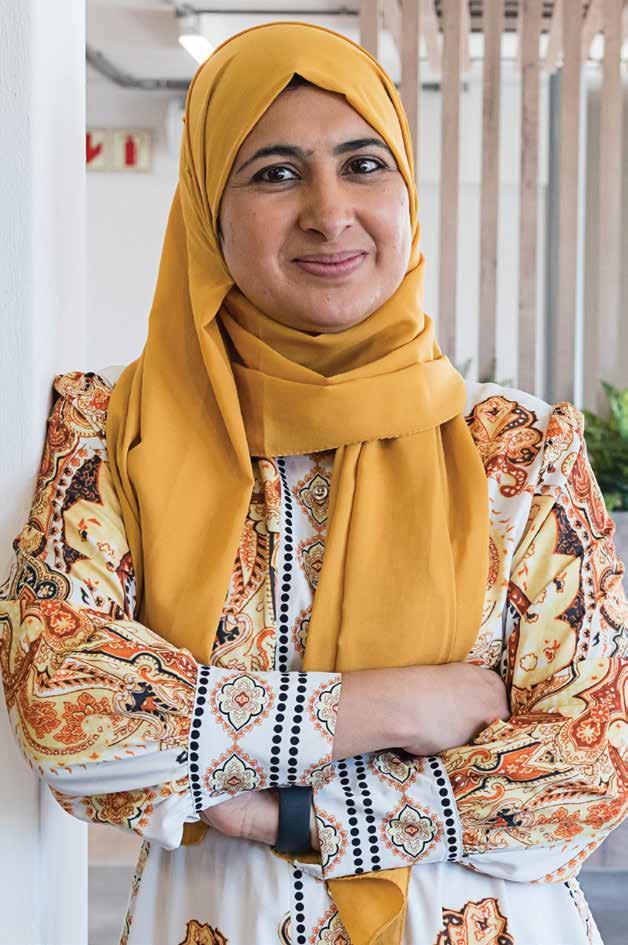
but creating more engaged alumni. Offering more events that alumni attend, getting alumni to support UCT Day, to come out and support the Ikeys rugby team, proudly wearing our UCT SWAG!
Naadiya’s final message: the way forward – with great power comes great responsibility
Come back and be part of the university’s very exciting journey! We need to close a chapter on what has happened before – we need to be looking forward and can’t stay in the past. I like the quote from Spiderman (originally penned by Voltair) ‘with great power comes great responsibility’. It is powerful to be at a world-class university like UCT – not everyone gets that chance and so we need to recognize our privilege and power and do something about it.
1st in Africa
1 Times Higher Education (THE) World University Rankings 2025
2 Quacquarelli Symonds (QS) World University Rankings 2025
3 US News & World Report Best Global Universities Rankings 2024–2025
4 Center for World University Rankings (CWUR) 2024
5 ShanghaiRanking’s Academic Ranking of World Universities 2024
6 Quacquarelli Symonds World University Rankings: Sustainability 2024
Times Higher Education (THE) World University Rankings 2025
271st in the world
Center for World University Rankings (CWUR) 2024
Quacquarelli Symonds (QS) World University Rankings 2025
116th in the world US News & World Report Best Global Universities Rankings 2024–2025
ShanghaiRanking’s Academic Ranking of World Universities 2024
Top 20
DEVELOPMENT STUDIES
15th in the world
QS World University Rankings by Subject 2024
Top 50
INFECTIOUS DISEASES
24th in the world
US News & World Report Best Global Universities Rankings for Subjects 2024-2025
PUBLIC, ENVIRONMENTAL AND OCCUPATIONAL HEALTH
44th in the world
US News & World Report Best Global Universities Rankings for Subjects 2024-2025
ENVIRONMENTAL SCIENCE & ENGINEERING
33rd in the world
ShanghaiRanking’s Global Ranking of Academic Subjects 2023
PUBLIC HEALTH
36th in the world
ShanghaiRanking’s Global Ranking of Academic Subjects 2023
SPORT SCIENCE SCHOOLS AND DEPARTMENTS
31st in the world
ShanghaiRanking’s Global Ranking of Sport Science Schools and Departments 2023
Top 100
CLINICAL AND HEALTH
81st in the world
THE Subject Rankings 2024
EDUCATION8
92nd in the world
THE Subject Rankings 2024
SOCIAL SCIENCES
100 in the world
THE Subject Rankings 2024
ANTHROPOLOGY
51-100 range
QS World University Rankings by Subject 2024
GEOGRAPHY
51-100 range
QS World University Rankings by Subject 2024
IMMUNOLOGY
51st in the world
US News & World Report Best Global Universities Rankings for Subjects 2024-2025
MEDICINE
89th in the world
QS World University Rankings by Subject 2024
MARINE AND FRESHWATER BIOLOGY
69th in the world
US News & World Report Best Global Universities Rankings for Subjects 2024-2025
ATMOSPHERIC SCIENCE
76-100 range
ShanghaiRanking’s Global Ranking of Academic Subjects 2023
CLINICAL MEDICINE
76-100 range
ShanghaiRanking’s Global Ranking of Academic Subjects 2023
ECOLOGY
95th in the world
US News & World Report Best Global Universities Rankings for Subjects 2024-2025
GEOGRAPHY
76-100 range
ShanghaiRanking’s Global Ranking of Academic Subjects 2023
OCEANOGRAPHY
51-75 range
ShanghaiRanking’s Global Ranking of Academic Subjects 2023
METEOROLOGY AND ATMOSPHERIC SCIENCES
92nd in the world
US News & World Report Best Global Universities Rankings for Subjects 2024-2025
MICROBIOLOGY
97th in the world
US News & World Report Best Global Universities Rankings for Subjects 2024-2025
NEUROSCIENCE AND BEHAVIOR
86th in the world
US News & World Report Best Global Universities Rankings for Subjects 2024-2025
SOCIAL SCIENCES AND PUBLIC HEALTH
78th in the world
US News & World Report Best Global Universities Rankings for Subjects 2024-2025
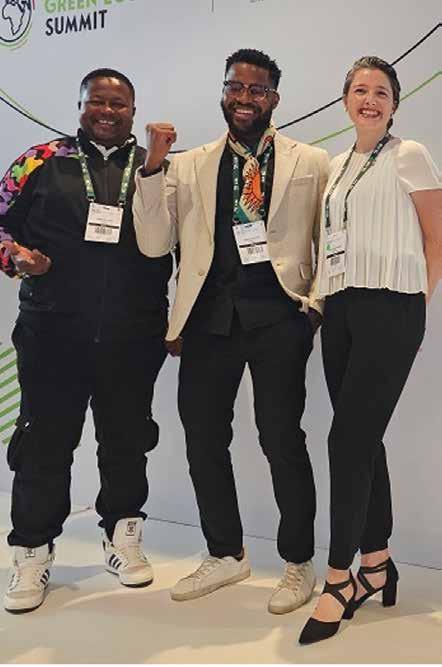
One of Van Rooyen’s highlights is having met and spoken to US pastor, author and filmmaker TD Jakes.
“This conference is crazy – it draws some of the biggest names,” said Van Rooyen. “We have even bumped into TD Jakes and walked past the likes of Boris Kodjoe, Chris Tucker, and Will.i.am in the hallways!”
Recalling the moments before the winners were announced, Kabuya, a young engineer from the Democratic Republic of Congo, said he was very tense, “knowing that I pulled some of my best friends into this competition with no guarantee of what the outcome would be and whether the past 12 months would lead to an acknowledgement of all our efforts.”
Aftrak, an initiative based out of the UK and Malawi, were announced the winners of the $1 million (R18 million) grand prize. The solution uses solar microgrids and solar-powered tractors in deep-bed farming, helping to triple agricultural yield and increase farmer incomes while providing electricity to rural communities.
Being named runner-up, however, was still a worthy achievement for Omnivat. “I feel such a great sense of validation and accomplishment, especially for the speed at which we did this, having started from zero just 10 months ago,” Kabuya said.
Compared to other teams, Kabuya said they did all the work without any company backup or access to resources.
approached us, and we hope that winning more than R4.5 million in the MilkenMotsepe Prize will demonstrate Omnivat’s credibility and capability. We are open for business,” said Van Rooyen.
The team hopes to innovate community-based revenue models that see communities having a say in their service delivery and infrastructure.
“We will explore partnerships with healthcare facilities in the Eastern Cape as pilot sites for our project,” Van Rooyen said.
On a personal level, Van Rooyen said that the recognition of being runnerup had fuelled their motivation and commitment to the project:
“We are now more motivated on two levels – one, we are all that more committed to this vision and confident in our ability to make it happen; two, we recognise how much room we have for growth and innovation in a space where there is so much opportunity and so much innovation taking place.”
The team says being part of the competition has been an amazing experience, with so many panel discussions on almost any topic.
“In a competition with over 3 800 applicants, we are humbled and encouraged by the fact our idea has found global recognition and merit, and we just want to push the boundaries further,” said Kabuya.
Omnivat, a renewable energy startup founded by five University of Cape Town graduates, are the runners-up of a prestigious energy innovation competition backed by billionaire Patrice Motsepe.
Omnivat founder and team leader Randy Kabuya and co-founder and civil engineer Deney van Rooyen were flown to Los Angeles for the awards ceremony and conference this week.
They found themselves in the company of key players in philanthropy, finance, and innovation.
“It was our initiative and idea, accomplished by our efforts,” he said.
Omnivat described its solution as an integrated package of solar panels, batteries, and hydrogen technology, all pre-packaged in a shipping container.
The future looks green
With more than R4.5 million in prize money and increased credibility, the team is eager to seek additional funding and partnerships to move their project forward. “We will need additional funding and partnerships to realise this dream – potential funders have already
When asked when they plan to return home, Kabuya and Van Rooyen humorously replied: “We’re not jumping on a 40-hour journey right away! We’ll be exploring LA and making additional connections before returning to South Africa towards the end of May.”
The team says all this experience is a testament to what they can achieve and accomplish going forward.
“It takes a village to make an Omnivat,” said Kabuya.
Ateam of Master of Business Administration (MBA) students from the University of Cape Town’s Graduate School of Business (UCT GSB) has claimed victory at the Geneva Challenge 2024, a global competition spotlighting groundbreaking solutions to pressing societal challenges. Competing against 222 teams from 94 countries, the UCT team’s project, Mntase Cares – Mobile Clinics for Youth Empowerment, emerged as the winning innovation, addressing the critical issue of teenage pregnancy in South Africa.
The Geneva Challenge, now in its 11th year, is hosted by the Geneva Graduate Institute with the support of Ambassador Jenö Staehelin and under the patronage of former United Nations SecretaryGeneral Kofi Annan. This year’s theme, “The Challenges of Youth Empowerment”, drew over 850 participants, underscoring the global urgency of empowering young people to shape sustainable futures.
Global recognition for UCT GSB
The winning project was presented at a gala in Geneva, Switzerland, where the all-female UCT team – Dr Marisse Venter, Vaylen Kirtley, Noludwe Ntsangani, Dr Genevieve De Ponte, and Lynette Tasaranarwo – received international acclaim. Representing diverse professional backgrounds in healthcare, media and finance, the team epitomises the interdisciplinary excellence of the UCT GSB.
“This remarkable achievement highlights the UCT GSB’s commitment to addressing critical global challenges with African-born solutions,” said Dr Catherine Duggan, the director of the UCT GSB. “Our students continue to demonstrate the power of innovation and collaboration on the world stage.”
This accomplishment adds to the UCT GSB’s recent recognition in the Better World MBA rankings, where its

MBA programme ranked 7th globally for sustainability. Dr Caitlin Ferreira, the programme director of the Modular MBA at the UCT GSB, said: “Empowering youth is essential for building sustainable futures – not just for Africa, but for the world. This win showcases the transformative impact of our programmes.”
Innovative solutions to complex challenges
The UCT team’s winning initiative proposes deploying mobile clinics equipped with reproductive health services, educational resources and telehealth technology to underserved communities. By integrating healthcare and education, the project aims to combat teenage pregnancy, reduce health risks, minimise educational disruptions and promote gender equality, thereby contributing to South Africa’s socio-economic development.
“This recognition allows us to shine a global spotlight on the crisis of teenage pregnancy and the urgent need for solutions,” said Dr Venter. She elaborated: “Our initiative seeks to empower vulnerable girls, offering them a safe space and the tools they need to build brighter futures. Guided by ubuntu – I am because we are – we aim to break cycles
“This recognition allows us to shine a global spotlight on the crisis of teenage pregnancy and the urgent need for solutions.”
of hardship with the support of leaders, communities and partners.”
The project’s name, Mntase Cares, derives from the isiXhosa word for “sibling”, symbolising a supportive network for young people in need. Inspired by a successful Rwandan programme that significantly increased contraceptive use among young women, the project adapts global best practices to South Africa’s unique challenges.
Addressing a global challenge
South Africa faces one of the highest teenage pregnancy rates globally, with nearly one in four girls becoming pregnant during their teenage years. This often results in school dropouts, genderbased violence and cycles of poverty.
The UCT team’s project emphasises prevention through early education, access to healthcare and emotional support, addressing root causes, while offering tangible solutions.
“This competition reflects the importance of interdisciplinary collaboration in tackling complex challenges,” said Dr Sebastian Kurten, a collaborator on the project. “By prioritising youth empowerment, we can drive meaningful, sustainable change for future generations.”
The Geneva Challenge continues to spotlight innovative ideas that inspire action, and UCT’s achievement underscores the potential of African-led solutions to impact global change.
Professor Ntobeko Ntusi, the chair and head of the Department of Medicine at the University of Cape Town and Groote Schuur Hospital (GSH), assumed the role of president and CEO of the South African Medical Research Council (SAMRC) from July.
“Principled”, “a servant leader” and “wise” are the perceptions that the introductory speakers of the night had of Professor Ntusi. In his valedictory address, titled “Many people, one voice”, Ntusi reflected on his tenure as a leader in times of real-world complexities such as healthcare austerity measures, the rising disease burden in South Africa, personnel shortages in healthcare and achieving transformation in the workplace.
“When I reflect on the many achievements during my leadership, the single enabling and enduring factor has been how [my colleagues and I] have used our diversity to bear on our common purpose, and unity in action,” he said.
Ntusi was born and raised in Mthatha in the Eastern Cape. He studied biology and medical sociology at Haverford College in the United States of America. Haverford was a formative experience for him: the college had an honour system where students would write exams unsupervised and be trusted not to act dishonestly. This principle of being accountable for one’s actions informs much of what Ntusi has done since. He returned to South Africa to train as a medical doctor at UCT and then went on to complete a PhD in cardiovascular medicine at the University of Oxford in the United Kingdom.
Feeling the urge to acquire work experience, Ntusi stopped studying and set his sights on securing a job — his first job, in fact. And the only job available was “chair and head of the Department of Medicine”. Impressively, he was only 39 when he secured this post in August 2016.

Why leaders fail, and the antidote “Why do [certain] approaches fail even when logic indicates they should prevail?”, Ntusi interrogated. His answer was that a certain level of predictability and order exists in the world. This belief encouraged simplifications that are useful in organised circumstances.
However, Ntusi cautioned: “Circumstances change, and as they become more complex, the simplifications can fail. Good leadership is not a one-size-fits-all proposition. Many of the tasks that leaders are called on to do in complex situations … require fundamentally different leadership and personal capacities than the ones they had spent a lifetime cultivating.”
He continued: “Becoming clear about purpose, direction and boundaries is a large part of the work of leading strategy in complexity.”
In the second part of his lecture, he chronicled 10 takeaways from his tenure as a leader.
1. Our greatest resource is our people. Ntusi said that he has had the privilege of being surrounded by the most intelligent, caring colleagues. Over time, a huge part of his work as a leader has focused on how an organisation forges a sense of belonging where all people can meet their personal and professional goals. He has also learnt that people have shortcomings,
and a leader needs to be sensitive to these.
2. Always believe in the importance of aesthetic. Maslow’s Hierarchy of Needs has been expanded to include three additional needs: cognitive (when one becomes curious and desires to acquire knowledge), aesthetic (appreciation and the search for beauty) and transcendence (going beyond the self, which includes experiences in nature, sexual experiences and service to others). Flourishing organisations have an abundance of people whose cognitive, aesthetic and transcendence needs are constantly met.
3. Invest in leadership at an organisational level. Succession planning in leadership is vital. Organisations must identify early on what kind of candidate they want to apply to ensure stability.
4. Abandon firefighting as a leadership strategy. It is wiser to strategically avoid problems rather than try to solve them as they arise.
5. Humility goes a long way. Ntusi’s conclusion was that UCT has a culture of preoccupation with rankings. It would serve the UCT collective well to be less status minded and focus on areas for improvement.
6. Focus on impact, not reputation. A reputation lasts for a very short time. A greater focus on impact would not only establish a legacy but is also likely to preserve a good reputation. Focusing on impact would automatically provide a perspective that would reduce one’s arrogance about the importance of one’s place in this world.
7. Have the courage to question. UCT and GSH have progressed from being places of moral darkness at the height of apartheid, to welcoming, diverse environments. It was courage that produced this. Therefore, constantly questioning our beliefs is essential to securing justice.
8. Building public trust is essential. In an age where access to the internet is ever-present, everybody has become
an “expert”. By virtue of it being a leading department, the Department of Medicine has a duty to restore the public’s declining trust in the value of public health and science.
9. The burden on black leaders is unmatched and comes at a cost. Black leaders are often tasked with being at the forefront of diversity, inclusion and equity. They are expected to sit on multiple committees to ensure sufficient representation. This is both an individual and organisational challenge, and it must change immediately.
10. The work of transformation should not be tokenistic. We have good reason to embrace transformation: when different ideas and perspectives collide, it leads to enrichment and learning. However, in the words of Nelson Mandela, transformation must not be an act of charity but an act of justice.
In closing, Ntusi saluted his successor, Professor Mashiko Setshedi, on being the first female chair and head of Medicine. “Like her predecessors, I have no doubt she will face her fair share of challenges. But I also know that she will prevail.”

TheUniversity of Cape Town’s (UCT) Professor Kelly Chibale is set to be awarded an honorary doctorate by Leiden University in the Netherlands on 7 February 2025 during the institution’s 450th anniversary celebrations.
In a significant recognition of his groundbreaking scientific contributions, Professor Chibale’s award highlights his pivotal work in developing innovative medicines to address endemic diseases in Africa.
Chibale has dedicated his career to creating new drugs that target critical health challenges facing Africa. His most notable achievement includes leading an international project team that discovered a small molecule antimalaria drug candidate, the first small molecule drug candidate for any disease researched on African soil by an African-led international team and advancing it to the clinical development phase.
Beyond his scientific breakthroughs, Chibale has demonstrated exceptional leadership through the establishment
of UCT’s Holistic Drug Discovery and Development Centre (H3D) in 2010 and the associated H3D Foundation in 2019. Both the centre and foundation are crucial in training and supporting African scientific talent, embodying a commitment to advancing research capabilities across the continent.
The honorary doctorate represents more than a personal accolade. It is a testament to Chibale’s remarkable contributions to science, education, and societal development. Notably, the nomination originated from three prestigious departments within Leiden University, the Faculty of Science, the Faculty of Social & Behavioural Sciences, and the Leiden University Medical Center (LUMC).
“I would like to thank God, my team members, past and present, as well as research and funding partners for their support and contributions to this recognition.”
“This honorary doctorate is special on two levels. First, my nomination was jointly initiated by three different entities at Leiden University: Faculty of Science, Faculty of Social & Behavioural Sciences, and the University Medical Centre. Second, it will be given on the university’s 450th anniversary. I would like to thank God, my team members, past and present, as well as research and funding partners for their support and contributions to this recognition,” Chibale said.
Professor Gilles van Wezel, a professor of molecular biotechnology, will personally present the honorary doctorate to Chibale during the anniversary celebrations, further emphasising the significance of this recognition.
Asclimate change wreaks havoc globally – leading to less (or more) rain and an increase in droughts in usually arid regions – it has become increasingly important to diversify South Africa’s long-term water strategy. Step one is ensuring that it includes unique, innovative water sources to guarantee a sustained supply of this precious commodity.

This is crucial to ensure that South Africa’s growing population has enough water for drinking and sanitation purposes for generations to come, said the UCT’s Teboho Mofokeng. Mofokeng is a lecturer in the Department of Civil Engineering and a PhD candidate in the department’s Water Research Group – a subsidiary of the Future Water Institute. Her research interests include water management and reuse in the context of drought; water security; and water, food and energy nexus.
“As a nation, it is critical that we start viewing and managing water differently. Equally importantly is that water users are educated on sustainable water-use behavioural practices to be able to make informed decisions,” Mofokeng said. She was discussing her latest research study, focused on residents in two communities in Cape Town and Durban, that examined South Africans’ behaviour towards water.
Are South African open to using alternative water sources to flush toilets? South Africa is permitted to dispose of up to 300 million litres of wastewater into the sea every day. Although it’s largely considered “waste”, Mofokeng said this water can be treated – using a process that removes harmful bacteria – and put to good use. While treated wastewater cannot be used for drinking, she said, it can be used for flushing toilets, which accounts for roughly 20–30% of households’ total water consumption. Are South Africans open to using alternative water sources to flush their toilets? Mofokeng wanted to understand whether her research participants’ choices were based on an understanding that using lower-grade flushing water reduces the demand for high-quality drinking water; and whether they’ve adopted proenvironmental behaviours because they’re willing to prioritise the shared and longterm interests of the community and the environment over immediate, personal gain. “We wanted to understand people’s thinking around a shared responsibility towards the use of sustainable water sources, with the potential to benefit future generations in the long term,” she said.
Hout Bay vs The Bluff
Mofokeng focused on two seaside suburbs – Hout Bay in Cape Town and The Bluff in Durban – for this research study. To solicit a response, she presented participants with the following scenario: “The cost of drinking water has increased. As a result, would you opt to use seawater, recycled water, or expensive drinking water to flush the toilet?”
Interestingly, she noted that Hong Kong has been using seawater to flush toilets for decades and this continues to form part of the region’s long-term water strategy. Why can’t the approach work for South Africa, especially in suburbs where wastewater is discharged into the sea without treatment? Mofokeng’s research was designed to test participants’ preferences in colour, smell, cost,
water stains and disposal practices for alternative water supply options.
Respondents in Hout Bay were open to using recycled water to flush their toilets, being aware that water is a scarce commodity and having a sense of responsibility to accept and embrace alternative sources. The proenvironmental behaviour, was prevalent among non-white heads of households. She found that households with an income of R12 800 and more preferred to continue flushing their toilets with drinking water at an increased cost; while households headed by women (who held university degrees or diplomas) preferred using the seawater alternative.
The Bluff residents felt differently. While respondents agreed that it is important to adopt pro-environmental behaviours, heads of households (who earned more than R12 800 per month and had lived through a recent drought) preferred to continue using drinking water to flush their toilets. However, homeowners between the ages of 18 and 34 years old who shared their homes with three or more people were comfortable with using recycled water.
“Generally, our research shows that residents in both communities, although hesitant in some cases, are willing to accept alternative water sources for flushing, if necessary,” Mofokeng said.
Mofokeng said awareness campaigns were effective to ensure residents develop water-conscious behaviours. Both the City of Cape Town and the eThekwini Municipality implemented successful water-wise awareness campaigns during their recent national droughts.
Mofokeng said her findings show that respondents’ water choices stem from their pro-environmental behaviour – demonstrating the longterm success of the city’s water-wise awareness campaign. These campaigns recognised and encouraged watersaving efforts – using water maps that
highlighted households’ attempts to save water; and leveraging community engagement programmes to contribute to adopting long-term pro-environmental behaviours among residents. However, the eThekwini Municipality’s campaign was less interactive and centred primarily on education. So, while 86% of residents there indicated that they understand the importance of being water savvy, they had not yet developed pro-environmental behaviours.
“So, while awareness is important, it alone will not lead to increased proenvironmental behaviours. That would require integrating those behavioural nudges to have a total mind shift,” she said. Adopt dual supply water networks
Mofokeng said her research and participants’ responses come at just the right time – as discussions and work get under way to review and potentially replace the country’s dated sanitation
pipe network infrastructure, which was built in the 1970s. Replacing or upgrading the pipe infrastructure presents an opportunity to rethink conventional water supply systems and consider dual supply networks where feasible, especially considering its success in Hong Kong. With dual water supply networks, Mofokeng explained, high-quality water is provided for household activities such as drinking water, bathing and cooking, and a separate lower-grade water quality network is provided for other uses like flushing the toilet and watering the garden.
“It is clear that participants’ choice to adopt alternative water sources are influenced by the quality of the water, conservation and environmental protection benefits, as well as cost and an understanding and awareness of water systems,” she said. “This study contributes to this knowledge, especially from an
African perspective where very little research has been done to understand preferences towards alternative water use.”
Mofokeng said her work demonstrates that South Africans are willing to use alternative water sources. She hopes the results will benefit decision makers and planners as they work towards improving the country’s water supply and infrastructure development, and enhance the design of awareness campaigns, for the long-term benefit of all South Africans.
At the time of writing, residents of the Atlantic Seaboard in Cape Town welcomed the city’s proposal to construct a wastewater treatment plant in Green Point. Residents said that the plant would reduce pollution and waterborne diseases.

Collaborating with multidisciplinary teams and applying theoretical knowledge to solve real-world challenges have been fulfilling aspects of my academic career.”
University of Cape Town Faculty of Health Sciences student Prosper Magara had this to say, as he summed up his latest academic achievement – being one of the recipients of the 2024 Google
PhD Fellowship announced last month to pursue his interests in biomedical engineering with a focus on developing innovative technologies for surgical applications. The Google PhD Fellowships directly support graduate students as they pursue their PhD.
“My research integrates AI [artificial intelligence] and telementoring systems to address challenges in laparoscopic surgery, particularly in resource-limited settings. I am also involved in real-time intraoperative bleeding monitoring systems designed to enhance surgical safety and improve surgical outcomes,” said Magara in introducing his focus area.
“Initially, I focused on engineering and pursued a BSc in Electrical Engineering. However, while working as an Internet of Things (IoT) engineer for SolidarMed in Zimbabwe, I was exposed to hospital environments and saw how engineering could directly solve healthcare challenges.
This realisation inspired me to specialise in biomedical engineering and later pursue a PhD. The experience showed me how impactful technology could be in improving healthcare, and I wanted to be at the forefront of these innovations.”
Magara’s academic journey is not merely summed up by this coveted fellowship. He specialised in medical device design and medical imaging for his master’s. His undergraduate project, titled “Development of a smart egg incubator”, won a best innovative project award at the University of Zimbabwe Research Week 2019.
“This fellowship was a result of my commitment to addressing critical surgical challenges using innovative technologies. My research proposal, which focuses on using AI and AR [augmented reality] in telementoring systems, aligned well with the objectives of the fellowship. I also had invaluable support
from my supervisors, including Dr Bessie Malila (UCT), Dr Lamees Ras (UCT) and Professor Ahmed Biyabani (Carnegie Mullen University). Being selected for the programme was an honour, and the mentorship provided by Google has been invaluable in refining my research and overcoming challenges.”
Cherry on top
With his journey now continuing in earnest, Magara said: “I am most looking forward to testing and deploying my solutions in real-world settings, particularly in underserved regions where they can have the greatest impact.
Collaborating with global experts, learning from my Google mentor, and contributing new technologies to the field of biomedical engineering are also aspects I eagerly anticipate.”
What’s more, this Google Fellowship has dispensed the anxiety of financial constraints, which are prevalent in academia. “The guidance from Google will enhance my research and ensure I am equipped to navigate the challenges of my project effectively,” added Magara.
Looking into the proverbial crystal ball, the ultimate goal, he said, is to become a leader in biomedical engineering innovation, creating technologies
that improve surgical outcomes and healthcare accessibility in resourceconstrained environments.
“I also aspire to become a lecturer and researcher and take part in policy development for medical equipment, mentoring the next generation of biomedical engineers while continuing to develop impactful solutions for global health challenges.”
The cherry on top, Magara shared, is that he will be a father soon, which is something that inspires him to contribute to a better future, not only for his family but also for the global community.
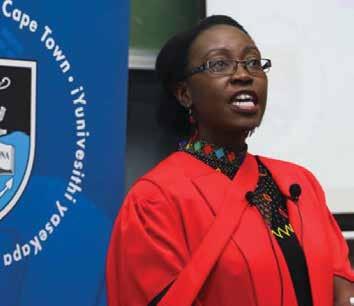
Professor Caroline Ncube, from the University of Cape Town’s Faculty of Law, was announced as the Department of Science and Innovation’s (DSI) 2024 Distinguished Women Researchers: Humanities and Social Science winner on Thursday, 15 August.
A flagship event of the DSI, the annual South African Women in Science Awards (SAWiSA), which was held in Mpumalanga this year, recognises and rewards excellence by women scientists
and researchers, and profiles them as role models for younger women.
Professor Ncube’s primary area of research is in intellectual property (IP) law, focusing on innovation and development aspects, specifically on how it can be used to better lives, particularly in relation to education, health, climate change and economic development.
The theme for the 2024 SAWiSA was “Transition towards an innovation economy: The role of women leaders in science, technology, engineering and mathematics (STEM)”. The innovation economy is an inclusive concept encompassing various sectors, namely, creative and cultural endeavours, energy and environment, water and ocean management, caregiving and assistance, the social sector and public services, and the often-overlooked contributions of unrecognised work, among others.
After receiving her award, Ncube said: “Being among all the finalists of the 2024 SAWiSA awards was a great affirmation. Just looking around and seeing generations of women in science all on a mission to heal the nation and world
with their work was so inspiring. It shows us what women in science and academia can achieve and what those following us can also achieve. Igama lamakhosikazi malibongwe (Praise be to womankind).”
Truly remarkable women
Commenting on an evening of success, UCT’s acting deputy vice-chancellor for Research and Internationalisation, Professor Jeff Murugan, said: “We are proud of the recognition received by so many of our women in science for their outstanding work in their respective fields, especially as we celebrate Women’s Month.”
He added: “A concerning gender gap persists worldwide in STEM fields where women are still under-represented. By supporting their success and highlighting their achievements, we contribute to strengthening the presence and influence of women in STEM disciplines.”
Dr Linda Mtwisha, the executive director of research at UCT, said this recognition is a powerful reminder of the brilliance, dedication and innovation women bring to their work every day.
“Their achievements remind us of
the indispensable role women play in shaping the future of science and technology. UCT is home to some truly remarkable women who are trailblazers across various fields and are driving impact in the world. We remain steadfast in our commitment to inclusivity and to empowering diverse research voices that enrich our understanding of the world while leading the charge in STEM research and innovation.”
Next generation of women scholars UCT’s commitment to inclusivity and diversity extends beyond celebrating the achievements of its current women scholars. Through initiatives like the Emerging Researcher Programme (ERP), the university has made significant strides in transforming the demographic profile of its academic staff to be more inclusive and diverse.
“We recognise the importance of empowering early-career research, particularly women, to enhance their research capacities and ensure their voices are just as prominent in the global academic community. This support will ensure that the future of academia is
more inclusive, diverse and reflective of the world we live in,” added Dr Mtwisha. Several UCT postgraduates were also presented with master’s and doctoral fellowships. They are:
Kathleen Charlton: MSc, specialising in astronomy with a focus on galaxy evolution, active galactic nuclei (AGN) and neutral hydrogen gas (HI). In her current research, she is investigating the relationship between HI and AGN by searching for HI absorption within these galaxies. She is undertaking this research using observations from the MeerKAT telescope in the MIGHTEE survey, using new techniques to blindly search for the absorption.
Kelebogile Gasealahwe: is currently enrolled for a PhD with a focus on Stellar astrophysics - X-ray binaries. In her current research, she is investigating low mass neutron star X-ray binaries with a focus on the radio wavelength, using the MeerKAT telescope. She is studying the physical mechanisms responsible for the relativistic outflows (jets) of these objects during X-ray outbursts. She hopes her research will help expand the knowledge of neutron star X-ray binaries and the
processes involved when the jets of these systems are produced during outburst events.
Pearly Joubert: is pursuing an MSc in neuroscience, investigating the impact of adjunctive acupuncture on brain structural–functional connectivity (SC–FC) coupling and motor performance in ischemic stroke patients. Her findings are pivotal, considering the limited research on acupuncture’s effect on SC–FC coupling and motor performance in this space. She hopes her research will underscore the significance of combining acupuncture with physiotherapy to enhance brain structural and functional changes and motor function in ischemic stroke patients, ultimately improving their quality of life.
Philadelphia Ngobeni: Her PhD research focuses on modelling and kinetic study of nitrogen species removal in tannery wastewater post-treatment using microalgae-based treatment. The aim of the study is to simulate a model that will be used as a tool to aid decision makers when upgrading and improving the sustainability and efficiency of wastewater treatment systems.
UCT’s Graduate School of Business’ (GSB) Master of Business Administration (MBA) programme has been ranked number seven globally and number one in Africa in the 2024 Better World MBA ranking by Corporate Knights magazine. The annual ranking assesses 174 top MBA programmes worldwide for their focus on sustainability and alignment with the United Nations Sustainable Development Goals (SDGs).
This achievement underscores UCT’s growing prominence on the global stage and highlights Africa’s expanding role in sustainable business education.
This year’s ranking marks a significant leap for the UCT GSB, improving by 20 places from the previous year and placing ahead of notable institutions.
The school’s curriculum is designed to empower students with practical insights on sustainability, strategic thinking, and adaptive leadership – skills vital for navigating complex global challenges.
“We are proud to be an African business school setting the pace for programmes around the world,” said the director of the UCT GSB, Dr Catherine Duggan. “Understanding impact and sustainability is increasingly a requirement for global business leaders. It has always been an integral part of doing business in Africa and a core
element of who we are at the UCT GSB.” Programme director for the fulltime MBA at UCT, Wayne Moodaley, said: “Our students increasingly view sustainability as central to their careers and purpose. Our graduates leave with a comprehensive understanding of sustainability principles, leadership skills, and strategic problem-solving abilities that set them apart and equip them to drive positive change in their organisations and communities.”
The UCT GSB’s reputation for excellence is underscored by its recent performance in the 2025 QS Global MBA rankings, which placed its programme first in Africa and among the top 100 MBAs worldwide.
The Hasso Plattner School of Design
Thinking Afrika (d-school Afrika) received the 6-Star plaque from the Green Building Council South Africa (GBCSA) in a ceremony held under its impressive glass dome atrium. The accomplishment was a culmination of a long-standing goal.
With sustainability and green building principles core to the university’s Vision 2030 and central to any University of Cape Town new builds and major refurbishments, which must meet a minimum 4-Star Green Star certification, the 6-Star plaque – was the first to be awarded to a new academic building on the continent. The project achieved a 6-Star rating via the GBCSA’s Green Star Public & Education Building v1 standard, which is the green building standard for new buildings and major refurbishments.
“Having set a 6-Star rating as our target, we have gained invaluable experience in pushing green boundaries so much further than any other academic institution on the continent, and it has moved us that much closer to our ability to deliver on UCT’s goal of being net-zero carbon by 2050,” said Manfred Braune, UCT’s director for Environmental Sustainability.
Six stars is the highest rating a building can achieve within the Green Star standard, a rating system which exists to encourage and support environmentally sustainable buildings that are kind to both people and planet. The Green Star standard consists of a variety of benchmarks that are addressed during the design and construction phase of a project, including project and construction management, energy consumption, water consumption, waste, emissions from the site, acoustics, renewable energy production, transport and accessibility issues related to the site location and health and well-being of people in the building and during construction.
It is an ethos well matched to that of
d-school Afrika founder, philanthropist and entrepreneur Professor Hasso Plattner. It was the Hasso Plattner Foundation which enabled this project to push the envelope on green building innovation. Plattner’s first d-school is at Stanford University in the United States and the second at the University of Potsdam in Germany.
It takes a team to co-create
“The d-school is an iconic building for UCT, and very different to anything we have done in the past,” said Mughtar Parker, the executive director of UCT Properties and Services. He is also the global chairman of the Real Estate Cluster for the International Alliance of Research Universities. This is a network of 11 research-intensive universities, including Singapore, Tokyo, Cambridge, Berkley California and Yale, which share goals and values.
“It’s seen as a leading project by these universities, set apart by its design and location,” Parker added. The school sits on a triangular site on middle campus, easily accessible to pedestrians via a footbridge and Woolsack Drive, from which the building’s north-east side is visible.
“It inspires universities, both on the continent and beyond, in three ways: sustainability, design methodology, and the manner in which we collaborated with the City of Cape Town, internal stakeholders, GBCSA, the Hasso Plattner Foundation, KMH Architects and Leaf Structures, among others.”
It is fitting that this was such a standout team effort from the concept stage, as d-school Afrika, which was initially housed in the UCT Graduate School of Business before moving to its current site in October 2022, exists to teach designled thinking towards understanding challenges, identifying opportunities and innovating solutions.
Built upon the premise of collaboration, co-creation, empathy, and valuing the input of every player, d-school Afrika opens the world of design thinking to students from all fields of learning. Together, in small multidisciplinary teams, students learn to come up with innovative solutions to complex problems.
In fact, d-school Afrika’s five-step approach to problem solving – empathise, define, ideate prototype and test – were applied to the conceptual visualisation of the project.

Ultimately it is all about our students
The d-school Afrika has been purpose built to harness the power of space and flip traditional academic hierarchical structure on its head with open, mobile, shifting spaces which foster collaboration, creativity and innovation.
“That can’t be taught in traditional environments,” said Richard Perez, the director of the d-school Afrika. “It takes the kind of space that gives students and educators automatic licence to think differently and collaborate. And that’s what this building stands for.”
“I love that this building is all about students,” said Jenni Lombard, the technical manager of GBCSA, looking about the atrium, and pointing out innovative features such as the large electronic dashboard which broadcasts green updates on the building. She noted the natural light, cool comfort thanks to open windows high up under the atrium, the outlook on trees and nature, and devices to dampen acoustics.
She also pointed out the QR codes in different sites, where students can log in to learn about an interesting green feature within the building.
“The d-school Afrika is groundbreaking. What I love most is that it’s a teaching institute, which uses devices to get information across in a really cool way.”

Other honours awarded to d-school Afrika
In addition to the 6-Star Green Star rating, the school claimed the 2023 South African Institution of Civil Engineering (SAICE) Technical Excellence Project of the Year Commendation Award, thanks in large part to the vast glass dome that tops the atrium.
It was also named overall winner at the South African Property Association’s annual awards, thanks to its innovative design, functionality and environmental sustainability features, as well as taking further awards for innovation and sustainability.
“Personally, these awards fill me with immense pride,” said Parker.

“It impacts the visitor on a different level, allowing them to take on board principles in a way that other buildings don’t. I hope students, even if they don’t consciously realise it, will take some of these principles on into their places of work and lives one day, even if it is only the 360-degree views.”
“This building is the culmination of a collaborative effort, and it says we are the best on the continent. We are UCT.”
And plans going forwards?
“We have an opportunity to embrace getting tech smart for sustainability. This is just the beginning.”

The University of Cape Town’s Drug Discovery and Development Centre (H3D) will play a pivotal role in supporting the Grand Challenges African Drug Discovery Accelerator (GC ADDA) network as they advance nascent drug discovery research through the support of LifeArc and the Bill & Melinda Gates Foundation.

Through a US$7.2 million joint investment, the collaboration will support five African drug discovery projects over three to five years. Launched in 2018, the GC ADDA programme was developed to identify and support exciting new drug discovery projects in Africa, strengthen the continent’s drug discovery capabilities and create a project-driven virtual African drug discovery network.
The H3D Foundation will lead the formation of the GC ADDA network, which will work together to attract increased investment and strengthen the research infrastructure. The network will provide a framework for greater collaboration, shared training initiatives, and increased community engagement and public outreach.
“This is an important step towards expanding the drug discovery ecosystem and community in Africa so we can benefit from economies of scale and seed a continent-wide innovative pharmaceutical industry that will contribute to a global pipeline of medicines, create jobs and retain talent on the African continent,” said Professor Kelly
Chibale, the founder and director at H3D.
“The centre has grown from five postdoctoral scientists in chemistry in 2011 when research programmes started to a 75-person organisation today.”
Professor Chibale’s area of expertise is in the early stages of the discovery of new medicines and the development of tools and models to contribute to improving treatment outcomes in people of African descent. The centre he steers has created an integrated platform that brings together scientists from the disciplines of chemistry, biology, and pharmacology.
“These did not exist when I joined UCT 28 years ago. The centre has grown from five postdoctoral scientists in chemistry in 2011 to a 75-person organisation today, representing multiple scientific disciplines, project management, business development, operations, and finance.”
Translational research
Head of research operations and business development at H3D, Dr Susan Winks, said: “Building on the success of the GC ADD programme over the past five years, Africa can take the next step forward in creating a sustainable innovative drug discovery ecosystem and solving the biggest infectious disease burdens faced by the continent.
“This investment in drug discovery research is an inflection point for the African drug discovery community and will allow us to shift the emphasis from academic research projects into translational research. These consortia include all the different disciplines to support drug discovery and are supported to deliver lead candidates that could feed into pipelines for new treatments for malaria and tuberculosis.”
Chibale said H3D will capacitate the network in multiple ways. They will provide:
• access to H3D drug discovery platforms, services and data
• mentorship: participation in the H3D Global Health Mentorship Programme
• drug discovery training: preferential
access to drug discovery workshops and webinars
• opportunities for scientific sabbaticals: researchers and students can spend a period of time at the H3D laboratories to learn particular techniques or access equipment
• project management support: bi-monthly meetings to identify and reduce bottlenecks, share challenges and learnings around operational issues; identify and support additional grant initiatives
access to H3D networks: important linkage to accessing external discipline specific knowledge and access to opportunities through the broader H3D global network.
“The focus is on executing projects and in the process build capacity. It is building capacity while getting the job done. This is the model pioneered by H3D in Africa. Scientists from multiple countries across Africa have been brought together through a network of research and funding partnerships,” he noted.
Dr Winks added: “The vision for the GC ADDA network is to formalise the community of practice to leverage the drug discovery research expertise, capabilities, infrastructure, and resources across the continent to support infectious disease drug discovery research. Together, the GC ADDA network will jointly prosecute disease centred flagship projects to boost the pipeline of innovative therapies for the major infectious diseases relevant to the continent.”
Some of the flagship projects include the discovery of novel antimalarial lead candidates in Africa (University of Ghana); pursuing targeted protein degradation as a new strategy for antituberculosis drug development (Stellenbosch University); the African DMPK Research Network (African Institute for Biomedical Research, Zimbabwe) and building a natural product library (Buea University, Cameroon).
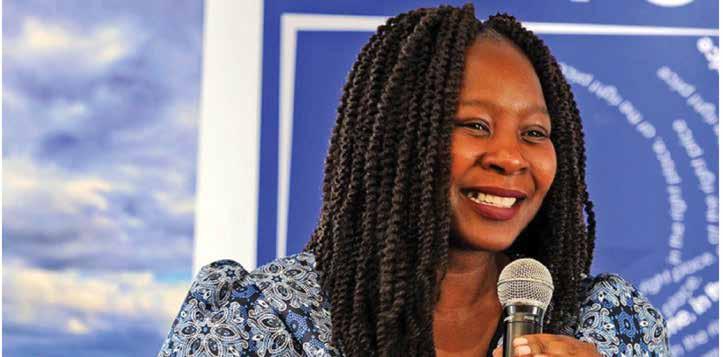
The University of Cape Town’s Professor Salome Maswime has been selected to lead the World Health Organization’s (WHO) Collaborating Centre for Integrated Clinical Care, which will be based at UCT and will support countries pivot their health systems towards universal health coverage.
Professor Maswime is the head of UCT’s Division of Global Surgery in the Faculty of Health Sciences. As the centre’s director, she will ensure that it delivers on its mandate: to prioritise effective organisation, planning and patient movement across health systems, to ensure timeous access to quality care that aligns with users’ needs.
She said she is excited about the appointment and noted that the WHO’s decision to partner with UCT stems from the division’s commitment to advancing health equity, particularly in Africa. Maswime will be supported at the helm by deputy director, Associate Professor Willem Stassen, from UCT’s Division of Emergency Medicine.
Maswime said the teams involved in the centre are known for working to improve healthcare for vulnerable populations and collaborating with international
institutions, non-governmental organisations and governments to get the work done. What’s more, this work aligns closely with the WHO’s Clinical Services and Systems Unit objectives, which focus on optimising health service delivery across the continuum of care.
Assoc Prof Willem Stassen is the deputy director of the WHO’s Collaborating Centre for Integrated Clinical Care at UCT. Photo supplied.
“[This] is a powerful recognition of the work we have been doing at UCT and the potential it has to impact the future of healthcare globally. Personally, this is the culmination of over 10 years of collaboration with the WHO and I am excited about the opportunities this formal partnership brings. It’s a new beginning for us to influence global health positively, especially in Africa,” she said.
The WHO has established collaborating centres in 80 member states. And these sites work alongside the organisation on key priority areas, including nursing, occupational health, communicable diseases, mental health, chronic diseases and health technologies.
Described as a multi-disciplinary centre, Maswime said it will engage a range of experts across several departments, including Surgery, Family Community and
Emergency Care, and Anaesthesia and Perioperative Medicine.
“Our work has always been about improving access to care, especially for those who need it most.”
It will also support the organisation’s mission to strengthen timely access to people-centred, primary, emergency, critical and operative care – with a particular focus on improving healthcare in resource-constrained settings. Further, she said, the centre will engage in cuttingedge research and evidence generation to support the implementation of highquality, integrated clinical care globally.
“Our work has always been about improving access to care, especially for those who need it most. The divisions represented in the collaborating centre are deeply committed to understanding how healthcare systems can be enhanced across the world. I believe our alignment with the WHO’s objectives made us a strong candidate for this designation,” she said.
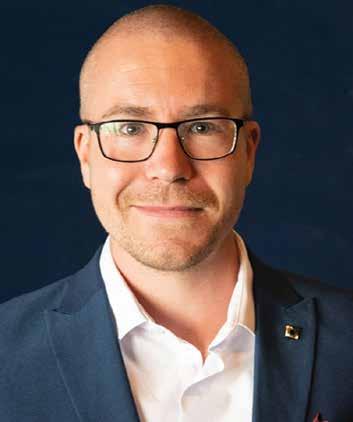
Thank you for warmly welcoming me as this university’s 11th Vice-Chancellor. The song “Ngena ngonyama, silindele wena”, (“Enter, lion, we are waiting for you”), echoed in the Sarah Baartman Hall on Monday, 25 November during my installation.
The song speaks of strength, leadership, and anticipation. You have waited in anticipation, and I believe that for us to build a strong university, we have to lead UCT together and unite to carry on its legacy of excellence. The beautiful rendition of the song filled me with immense gratitude especially for those whose shoulders I stand on, those who walked the journey before me, and those who are embarking on this journey with me. This profound event marked a new chapter for UCT and for me personally. I look forward to building a brighter future for UCT, our continent and the world with you.
First 100 days in office
I don’t know about you, but I always wish for a soft landing when taking a new job – time to settle in and adjust to Cape Town and UCT. But my first day set the tone for my first 100 days in office, where ‘tough’ became the normal way to characterize my days and the job as a whole. However, there have been wonderful moments that felt like rays of sunshine sufficient to make me look forward to the next day. Some of the brightest days were the ones where I hosted inaugural lectures, where academics promoted to full professor told their stories of success, breakthroughs, sorrows and hardships. These events showed me the breadth and depth of the science that makes UCT the prestigious institution that it is.
The graduation ceremonies also gave me great joy, reminding me why we do what we do every day in the life of the university and that it matters to our students, their parents and families in attendance. Further rays of sunshine
came from engaging with students living in our residences, during their year-end academic, leadership and sports excellence awards dinner; hosting distinguished and related teachers’ awards, enjoying music at the Baxter Theatre and celebrating long service awards.
We have inherited a wonderful institution, a legacy of decisions made 30 years ago, from which we are benefiting today. The question is, what legacy is our generation of leaders going to leave for the generation that will be standing here 30 years from now, to ensure they too inherit a great institution that will serve their needs?
Who is Professor Mosa Moshabela?
Everyone needs someone who believes in them completely. My grandmother was that person for me. She believed in me completely, without holding back, and she helped me to think like a mature person early on in my life.
What was extra special, was that Elizabeth Ramadimetja Madisha (Koko-Mma as the grandchildren called her), did not attend school, yet she believed in the power of education. She was not privileged to travel and explore the country and other parts of the world, yet she encouraged me to go out there and pursue a career that would take me places.
She inspired me into studying medicine and was my biggest cheerleader. In 1996, as I was writing my final exam as a first-year medical student, Koko-Mma crossed over. Though physically no longer here, she has remained my guiding light, my voice of reason. And today, the values she instilled in meinfluence and guide every decision I make. It’s safe to say that Koko-Mma is never far away.

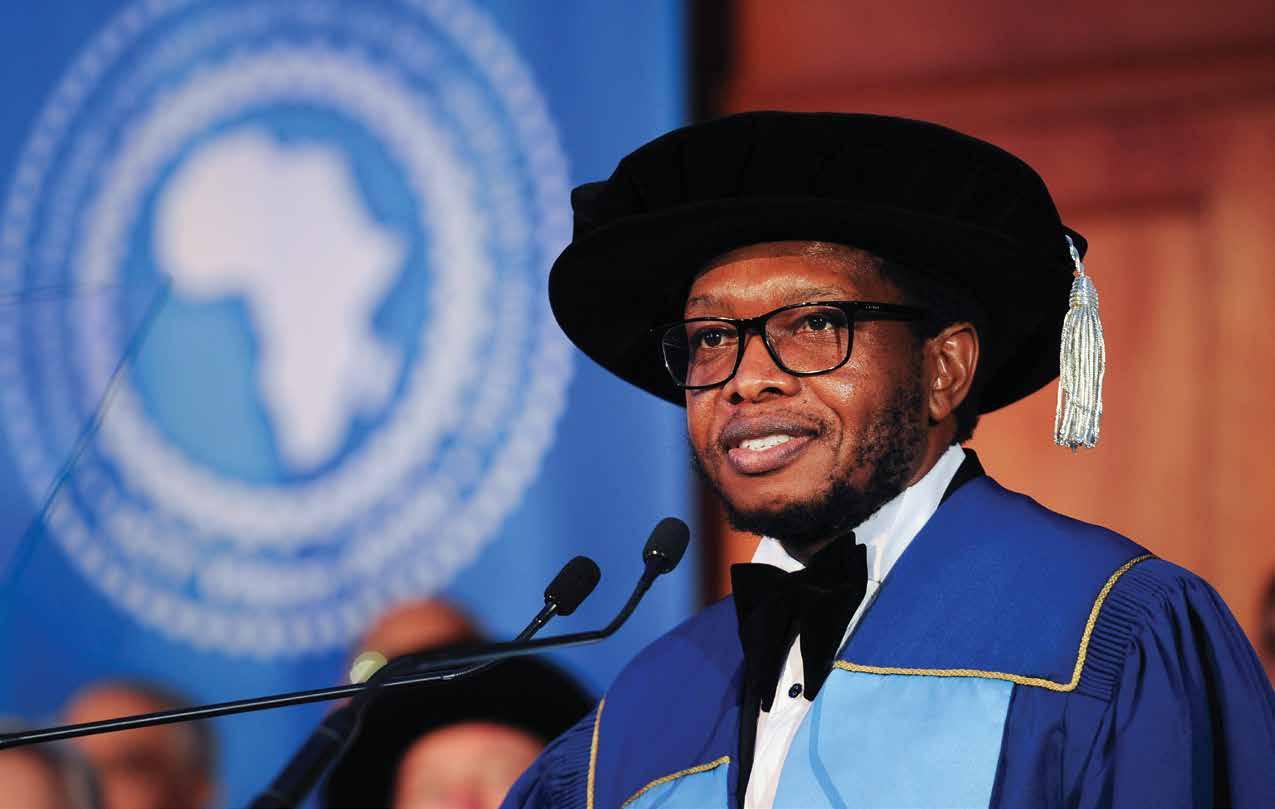
Developing a value system
I grew up in Mapatjakeng village in Zebediela, Limpopo Province. I was in Grade 4 when I moved back there from my parents’ house in Modjadjiskloof (formerly Duiwelskloof). I loved life in the village – spending time in the forest, climbing trees and playing soccer in the fields.
Best believe I also had my chores. Despite her paralysis following a severe stroke, which left her bedridden, Koko-Mma taught me how to herd the goats, sheep and cattle. She also schooled me on how to milk the cows. She nurtured my cando spirt and served as a constant motivation that nothing is impossible.
She was not mobile, she could not walk, yet she believed in the beauty of the world. Every time I came home from school, she was willing to listen to my stories. And would always ask: ‘what else happened? She told stories I felt were meant for adults. But they helped to teach me so much and gave me so much wisdom about the world and how to navigate it. During that stage of my life, I developed my value system.
Learning the value of respect
As a young boy, Koko-Mma taught me to show and value respect, to embody kindness and to treat those I encountered with dignity. Despite the massive age gap, she treated me like her equal, which is probably why today I choose not to believe in hierarchies of any kind. That’s why, when I look at young people, I look at them as people. They may not be the size and the stature of an adult. But I don’t necessarily believe that your number of years in life determine your humanity and dignity. Dignity is a given. It’s not something that one has to fight for or earn. The moment I understood that, I could not let it go. Whenever I encountered people who did not treat me with dignity and respect, I did not welcome that. I value respect because of the foundation that’s been set for me. And that’s why foundations are really important.
As a woman who embodied generosity of spirit, Koko-Mma ensured that I understood the meaning of selflessness. And thanks to these teachings, I also learned the true meaning of a win-win situation and how generosity of spirt influences it. Typically,when there’s a winner there’s also always a loser. But this doesn’t apply in a win-win situation. Why? Because win-win situations are underpinned by generosity of spirt. Generosity of spirit means you help someone win, and while you do that, you win in the process. It’s quite selfless and I like that foundation. I hope that in leadership [at UCT] we can continue to transmit that, teach and demonstrate that to other people. In fact, generosity of spirt also symbolises the values of ubuntu
that South Africans speak so fondly of, which, in hindsight, is what Koko-Mma stood for. In South Africa we talk a lot about ubuntu. Yet, it’s still hard for us to live the values of ubuntu. It’s hard for us to express what ubuntu means in reality and in practice. But if you really unpack it, it’s actually about the generosity one person shows to another. But we can’t seem to go back to that and make it part of our way of life.
In our conversations at UCT I hope that we can go back to talking about what that means and learn how to do that every day in the ways we relate to each other.
One of the biggest life lessons I learned from Koko-Mma is the importance of people, community and building lasting relationships. That’s why I love people and listening to their stories because people are not defined by who they are and what they’ve [achieved] in life. They are also defined by the experiences [that accompany] the stories they tell. And you have to learn this [lesson] from someone you trust. My grandmother did that for me.
Leadership style: generosity of spirit
With leadership you have to learn the values, the principles and the framework. And each encounter that you need to lead is different because each story is different. But you need to have that value system, those principles that guide your leadership. For me, it’s generosity of spirit. If you don’t have that, you can’t lead people.
Most of us are selfish and we can do well if we are looking out for ourselves. But if you really want to help other people do well, you need to have that generosity of spirit. And that is something that you learn very early on in your life, just like I did. You need to embody it, and to embody it, it needed to have been instilled in you very early on in your life. Generosity of spirit characterises my leadership style. You can call it servant leadership; you can call it many things. But it’s the kind of leadership that inspires us.
Destressing, unwinding and coping with the demands of being VC
For me, the best way to wind down after a long day is with exercise – spending time in the gym. I enjoy running; it’s the best form of exercise for me. And while I prefer road running, the reality is, sometimes it’s not easy or feasible because I often finish work too late. So, being in the gym is good, especially if I can get onto the treadmill, just mind my business and keep going.
I also unwind by engaging in conversations with colleagues and friends and just listening to different stories. Those evening conversations inspire me, and they’re not possible to have during the day because it’s not easy to sit down and converse. So, I enjoy unwinding this way too.
What legacy is our generation of leaders going to leave for the next generation?
We have inherited a wonderful institution, a legacy of decisions made 30 years ago, from which we are benefitting today. The question is, what legacy is our generation of leaders going to leave for the generation that will be standing here 30 years from now – yes, in 2054.
So, what decisions are we going to make today, to ensure they too inherit a great institution, one that will serve their needs then? Can we leave an inheritance for the next generation befitting of the privileges we are today enjoying because of the foresight of those who came before us? I believe they challenge us to exercise foresight in ways that will sustain UCT into the future – sustainability of UCT. This is a legacy we must create for future generations.
Four years ago this very month, UCT announced Vision 2030: an ambitious initiative that was created in consultation across the entire university community. The central mission, of course, is to unleash human potential to create a fair and just society. That is a worthy goal. I look forward to the future as we journey together, as we consolidate the three missions of UCT, and begin to explore the fourth mission of UCT, and position UCT as a catalyst for change in Africa, whilst we embrace our African values of ubuntu – “I am because you are”, lift others as we rise and leave no one behind. And we do this with compassion.
Remember, UCT is not just the bricks and mortar, but all of us at UCT, past, present and future generations. All of us!
Words of welcome from UCT Chair of Council Advocate Norman Arendse
Describing the significance of the occasion of the installation of the new vice chancellor, UCT Chair of Council Adv Norman Arendse said: “Today marks a truly momentous occasion in the history of UCT. It is not just another day at our great institution; it is a milestone that signals the beginning of a new chapter – one that holds the promise of growth, transformation and innovation. This is a moment of great pride for UCT, and we are confident that his leadership will elevate this institution. The road ahead is one of great promise, and we have no doubt that, under his guidance, UCT will continue to shine as a beacon of excellence, innovation and positive change.”
Endorsement by UCT Chancellor Dr Precious Moloi-Motsepe UCT Chancellor, Dr Precious Moloi-Motsepe expressed similar sentiment. “This occasion is one of celebration and renewal as we embark on a new chapter in UCT’s storied journey. It is an opportunity to reflect on our past, affirm our present, and embrace our future with optimism and purpose. For over a century, we have stood firm in our commitment to academic
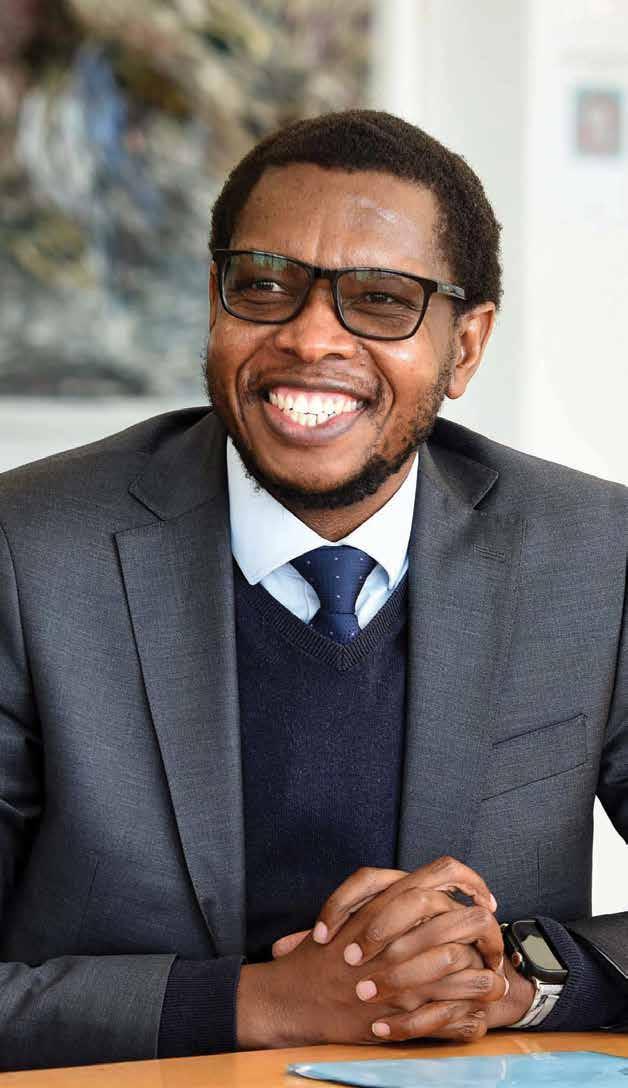
distinction, breaking boundaries, and pushing the frontiers of knowledge. At the heart of all that we do lies our shared vision: to unleash human potential to create a fair and just society. This vision is not only a guiding light for our institution but also a call to action for everyone who is part of the UCT community. Today, we reaffirm this commitment as we welcome a leader who exemplifies these values.”
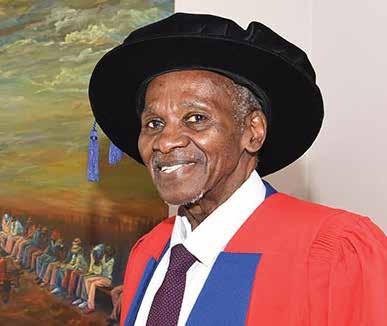
Lehlohonolo Burns Banda
Jiyane Machobane – Doctor of Social Science (honoris causa)
Professor Lehlohonolo Machobane is a trailblazing scholar and stateman who embarked on a remarkable academic journey from Lesotho to the United States. His travels culminated in a groundbreaking PhD from the University of Edinburgh. He then returned to Lesotho, where he served in various educational and governmental
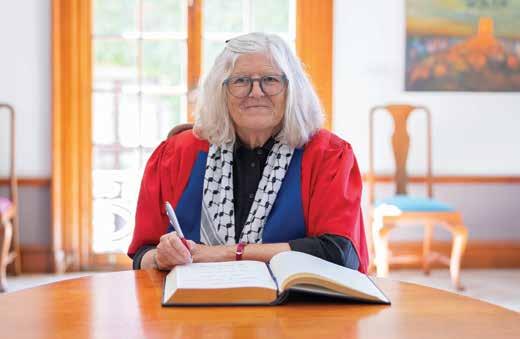
Professor Brian John Huntley – Doctor of Science (honoris causa)
Professor Brian Huntley’s impactful career in biodiversity research spans over five decades, beginning in Angola as a government ecologist. His work includes spearheading major programmes in ecosystems, fostering integrated research and management initiatives. He was appointed the chief executive officer of the South African National Biodiversity Institute (SANBI) in 1990 and his legacy includes founding the Thicket Forum and enhancing botanical gardens regionally. Leveraging post-apartheid opportunities, he secured funding for SANBI, significantly advancing conservation biology. His leadership led to the establishment of SABONET, promoting cooperation among African botanists.
Professor Huntley’s scientific contributions, including numerous publications and infrastructure enhancements at SANBI, have earned global recognition. His transformative efforts extend to the establishment of national parks and cultural initiatives, leaving an enduring impact on biodiversity conservation and research.
roles, leaving an indelible mark on both fronts. Proficient in African and Basotho history, his seminal work, Government and Change in Lesotho, 1800–1966, remains pivotal in understanding the nation’s political evolution.
His contributions extend to cultural preservation and community development, earning him acclaim as a multifaceted leader and scholar revered across Southern Africa.
Shirley Gunn – Doctor of Social Science (honoris causa)
Shirley Gunn, a UCT alumna, epitomises dedication to social justice and transformative work, closely aligned with the university’s values. Her activism can be traced back to the 1970s, when she was involved with the African National Congress’s (ANC) Umkhonto we Sizwe armed wing. Having suffered detention during apartheid, she has not faltered in her advocacy. Gunn has advocated tirelessly for the rights of marginalised groups, focusing on empowerment and human rights protection. Her efforts extend globally, aiding vulnerable populations in post-conflict regions. As the executive director of the Human Rights Media Centre, she conducts extensive research, collaborates on projects, and liaises with stakeholders, showing exceptional leadership.
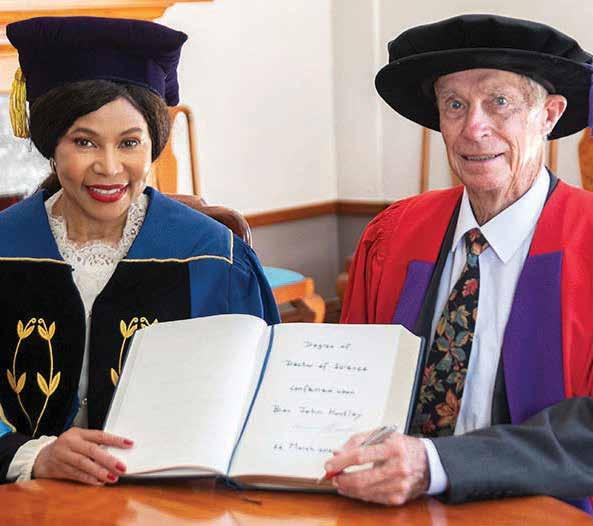
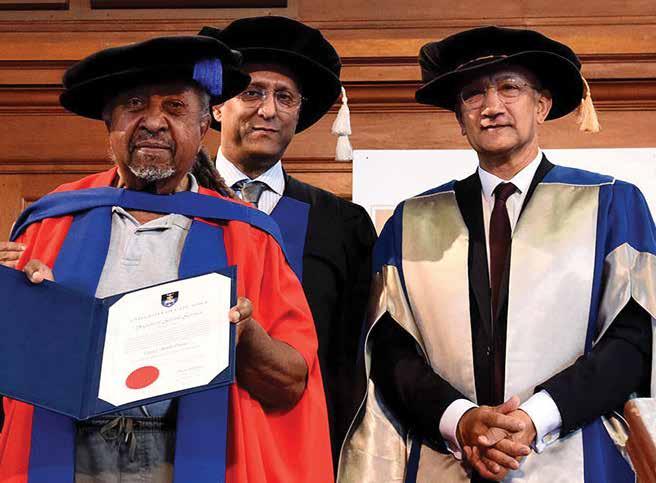
Dr Debbie Bradshaw was awarded with a degree of Doctor of Science (honoris causa) in recognition of her outstanding contribution to the field locally and abroad. A globally recognised biostatistician and epidemiologist who is regarded as South Africa’s foremost expert in the field, is an individual worthy of this honour. Even in retirement, she remains research-active and has been honoured with the South African Medical Research Council’s (SAMRC) highest accolade, the President’s Award for Exceptional Contributions to Medical Research. Dr Bradshaw embodies UCT’s values by advancing public health and societal well-being. With a rich academic

Mr Davis was honoured with a Doctor of Social Science (honoris causa). Born in District Six, Cape Town, Davis endured apartheid’s injustices, serving time on Robben Island for sabotage. Unbothered by the restrictions placed on him, he taught art at the Community Arts Project. He later co-founded the CAP Poster Workshop – an integral anti-apartheid activismfocused grouping.
A UCT alumnus, Davis went on to become a respected artist whose work has been celebrated nationally and internationally. Recognised with a Lifetime Achievement Award by the Arts and Culture Trust, he merges art with activism, preserving the history of District Six and Robben Island. The honorary degree awarded to Davis aligns with UCT’s values, honouring his indelible impact on South African society.
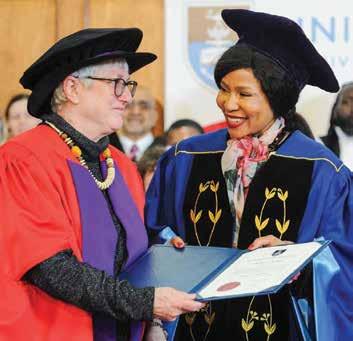
background and extensive research experience, she established pivotal units and led ground-breaking studies on South Africa’s health landscape. Her
Professor Michael Hayden was awarded the degree of Doctor of Science in Medicine (honoris causa). Professor Hayden, a UCT alumnus, excels as a clinician-scientist, entrepreneur and humanitarian, inspiring colleagues globally. Having graduated with first class honours in MBChB in 1975 and later obtaining his PhD from UCT, he pursued research in medical genetics abroad, notably at Harvard Medical School. He
contributions, recognised internationally, include mentoring future experts and shaping health policy through evidencebased approaches.
Throughout a career spanning nearly 50 years, Dr Bradshaw has tirelessly advocated for the marginalised and vulnerable, she fearlessly engages in dialogue with authorities to drive positive change. Her expertise and public contributions to health policy debates in South Africa highlight her ability to collaborate with all stakeholders, including national and provincial governments, to promote evidence-based health policies that improves the lives of all South Africans, epitomising UCT’s ethos of African identity and societal engagement.
is renowned for his contributions to this area, including pioneering work in Huntington’s disease. He has published over 1100 articles and mentored numerous students. His leadership in translational research has led to breakthroughs in neurodegenerative diseases. He co-founded successful biotech companies, earning accolades such as the Prix Galien. Professor Hayden’s humanitarian efforts include endowments in global health and mental health, exemplifying his commitment to societal betterment.
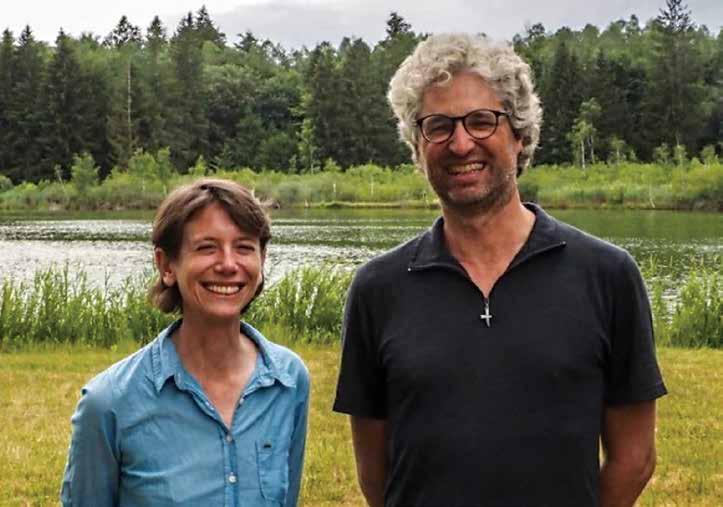
Professors Claire Spottiswoode and Bart Kempenaers Photo: Sabine Spehn
The University of Cape Town has launched a new research centre: the Max Planck–University of Cape Town Centre for Behaviour and Coevolution, a collaborative venture of the FitzPatrick Institute of African Ornithology and the Max Planck Institute for Biological Intelligence (MPIBI). The new centre joins the Max Planck Society’s 17 other virtual centres of excellence around the world, but stands out as the very first in Africa and only the second in the Global South. The centre will be jointly led by Co-Directors Claire Spottiswoode at the Fitz and Bart Kempenaers at the MPIBI in Germany.
The new centre’s research focus will be the ecology, evolution, and conservation of species interactions, mainly in Africa. It will strengthen existing research partnerships in countries such as Zambia and Mozambique, as well as forge new ones. Priorities for the centre will be to support
the development of young, emerging biologists in Africa and to encourage scientific collaboration within Africa and between Africa and Europe.
The centre was officially opened with a ceremony and scientific workshop at the MPIBI at Seewiesen, in the Bavarian foothills of the Alps in Germany, in midJune. A cohort of Fitz staff and students travelled for the opening and had the opportunity to meet and further plan collaborations with our new partners.
Most of life’s diversity on Earth is found in the tropics and such as occurs on the African continent. Stable climatic conditions have allowed many species to coexist and fine-tune their behaviours and interactions over long periods of time. This richness in biodiversity, both in terms of species and adapted behaviours, allows researchers to study how interactions between species function and evolve in their natural environment.
Professor Claire Spottiswoode from UCT, who will be one of the two directors of the new research centre, said: “Africa offers us
unique opportunities to ask and answer questions that cannot be addressed in research conducted in the Global North. Moreover, our research is enhanced by the knowledge and talent not only of young African scientists but also of local communities.”
Developing synergies and fostering talent
Max Planck Centres are virtual centres of excellence that are located at the participating institutes, usually one or two Max Planck Institutes in Germany and a partner institution in another country. The centres are initially funded for a period of five years to enable scientists at both locations to carry out complex research projects, combine different approaches, and tap into existing resources.
The new centre at UCT will be the first in Africa. It brings together the scientific and technical expertise, field research skills, and avian study systems from the two partnering institutions. The centre will also involve and expand existing partnerships with collaborators in other African countries including Zambia and Mozambique, who provide exceptional skills and resources for field research, and forge new co-operations.
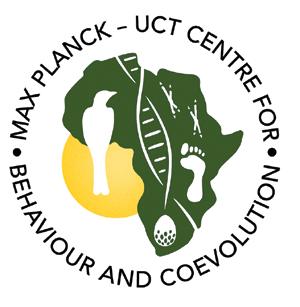
The logo of the Max Planck–University of Cape Town Centre for Behaviour and Coevolution, designed by David Lloyd-Jones and Jess Lund.
“Together, we can address and hopefully answer questions that go beyond what we could achieve on our own,” says Bart Kempenaers, scientific director of the Department of Ornithology at the Max Planck Institute for Biological Intelligence, who will co-direct the new centre with Spottiswoode. The collaboration will foster scientific partnerships between the South and the North and help train the next generation of African and Africanoriented scientists.
“One of our main goals is to support the development and retention of scientific talent in African research communities,” explains Bart Kempenaers. “We want to foster cross-country and cross-disciplinary collaboration within Africa and between Africa and Europe, strengthening research in our field on both continents.”
Egg colours, honeyguides and changing habitats
Research in the new centre will revolve around three topics. First, the scientists will study the behavioural interactions
between brood parasites, birds that trick other birds into hatching their eggs and raising their young, and their hosts. In these relationships, the parasites try to mimic their hosts’ eggs, while the hosts develop strategies to detect parasitic eggs, for instance by evolving visual ‘signatures’ of identity on their own eggs. The genetic and social factors that shape egg colour and pattern, as well as the learning processes that shape their recognition by hosts, are not yet fully understood.
Second, the centre will study the interactions between wild birds known as honeyguides, and humans in different regions across Africa. The partnership is the only known example to date of a twoway communication between humans and free-living animals, facilitating a common endeavour: birds help humans to find honeybee hives and profit from the technical capabilities of the humans to access the honey inside. “In collaboration with honey-hunting communities, for the first time we will be able to study the mechanisms by which cultures coevolve
by reinforcing each other’s cultural traditions,” says Spottiswoode.
“The mutualistic relationship between honeyguides and humans is fading away as Africa’s cultural landscape rapidly changes. With our research, we hope that we can help to predict and safeguard its future.”
Third, the researchers want to understand how interactions between species adapt to changing environmental conditions, such as higher temperatures and drier seasons. For example, the scientists plan to study how egg patterns and egg colours change when temperatures increase, as birds have to find compromises between protecting their eggs against overheating, predators, and brood parasites. They will also ask how the annual cycle of tropical birds may be shaped by the microbes they interact with, whether as partners or as enemies, and how these relationships may be reshaped in a rapidly changing world.
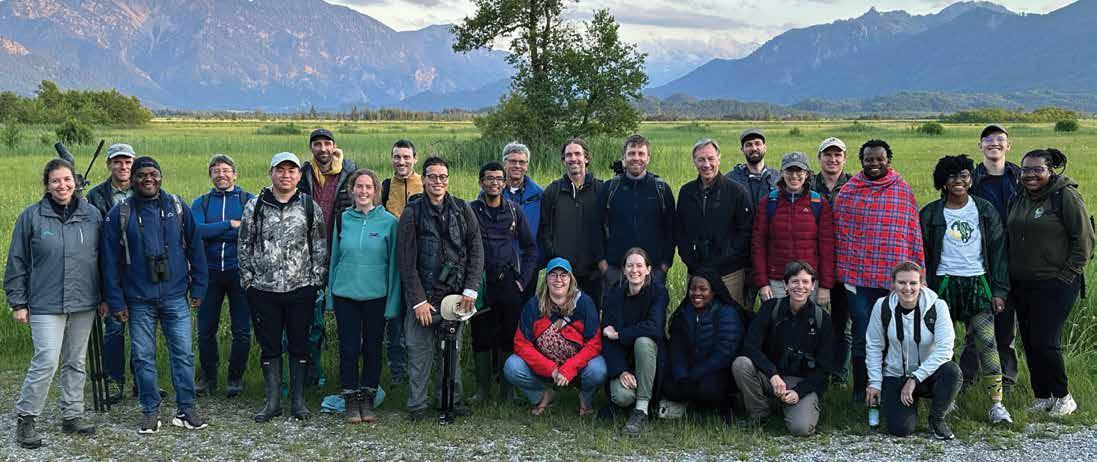

Five global science and technology projects have been selected to join the Ocean Biogeochemistry Virtual Institute (OBVI) to address gaps in ocean data and modelling efforts by improving the breadth of research in the field and expanding capacity to understand ocean resources.
University of Cape Town’s Associate Professor Sarah Fawcett will spearhead an effort to investigate oxygen and biogeochemical dynamics along the west African margin, as the OBVI pledged US$45 million to fund research over five years, with US$9.5 million awarded to support Associate Professor Fawcett’s project. Fawcett is based in UCT’s Department of Oceanography and the Marine and Antarctic Research Centre for Innovation and Sustainability (UCT-MARiS).
Through OBVI, Schmidt Sciences will bring together 60 scientists from 11 countries to conduct research to advance our understanding of ocean chemistry and the resilience of marine ecosystems in a rapidly warming world.
Fawcett explained: “Ocean oxygenation and productivity are particularly consequential for ocean biota and human welfare. Their future is highly uncertain;
however, particularly for tropical waters and coastal upwelling systems such as [those that] occur on the west African margin. Climate models suggest that hypoxic zones (low oxygen waters) will expand in response to global warming, yet the extent of suboxia (extremely low oxygen waters) may decline.”
Projections and mitigation
She added: “The coastal zones will be strongly affected by changes in oxygenation in neighbouring offshore waters, changes in local physical and biogeochemical processes, and by the increasing supply of human-derived nutrients that enhance biological production and drive local and regional deoxygenation. Poorer communities whose livelihoods depend largely on coastal ecosystem services will be most vulnerable to this uncertain future.”
The five teams will make up a global research network and receive financial support from Schmidt Sciences and access to the Schmidt Ocean Institute’s research vessel, Falkor. Through this research, the teams will develop accurate models at a variety of scales that will simulate ocean system responses to predicted climate changes and support the development of mitigation strategies.
“Through a coupling of measurements and modelling, we aim to determine the inter-related controls on oxygen and productivity along the west African margin, from the tip of South Africa to the equator, and to identify implications for natural resources. This margin hosts several socio-economically important ecosystems characterised by different oxygen conditions and levels of productivity. We seek to identify the organising principles underlying the margin’s oxygen dynamics to develop predictive capacity for the region – with regard to oxygen and productivity, and to the biogeochemical and ecosystemlevel implications of changes in these parameters,” said Fawcett.
The research will investigate the following questions:
• What are the controls on hypoxia and suboxia along the African margin? What are the respective roles of primary productivity and ocean circulation? What interactions arise between offshore processes such as the largescale tropical circulation and margin processes such as wind-driven coastal upwelling, coastal currents, and (sub mesoscale dynamics?
• How do these processes affect the African margin ecosystems, from planktonic assemblages to benthic and pelagic communities, at higher trophic levels, including species harvested by Africa’s coastal nations?
• What are the basin and global scale consequences of west African margin processes?
“The ocean plays a profound role in regulating Earth’s climate and acts as a vast repository for carbon and heat. Ocean biogeochemists have developed a broad understanding of how the ocean influences climate, [but] we lack a deeper fundamental and mechanistic understanding of the physical, chemical, biological, and geological processes that govern carbon cycling and storage. We have much to learn about the connections between carbon and other elemental cycles, and the specific roles that marine life plays in shaping those relationships,” Fawcett concluded.
Fawcett will lead a team consisting of fellow UCT colleagues: Dr Kelly OrtegaCisneros, Dr Moagabo Ragoasha and Professor Lynne Shannon, as well as Dr Sarah Nicholson (Council for Scientific and Industrial Research), and professors Laure Resplandy, Daniel Sigman, Curtis Deutsch, Bess Ward (all Princeton University). They are also joined by Stellenbosch University’s Professor Alakendra Roychoudhury and Namibian Ministry of Fisheries and Marine Resources senior scientist, Anja van der Plas.
The Global Media Index for Africa (GMI) – a pioneering initiative that tracks how 20 of the world’s most influential news providers report on news related to the African continent – revealed that there is room for improvement when it comes to covering new, progressive narratives on Africa.
The GMI is an initiative of the University of Cape Town’s Centre for Film and Media Studies and was carried out in collaboration with Africa No Filter – a non-profit organisation (NPO) that works to challenge and change harmful narratives on Africa; and the Africa Centre, New York – a multidisciplinary NPO that provides a gateway for engagement with contemporary Africa. Compiled by a team of leading UCT researchers, the index was officially launched in report form on Monday, 27 May, and emphasises the trends and biases that relate to global media narratives about Africa.
“Our research provides not just a snapshot of current media practices, but a call to action for global media to critically examine their storytelling about Africa and understand its impact,” said Associate Professor Wallace Chuma from UCT’s Centre for Film and Media Studies.
An extensive media evaluation
Described as an extensive media evaluation, the GMI analysed over 1 000 online news articles from top media outlets, including CNN, Bloomberg, The New York Times and The Guardian, over a six-month period. The yardstick used to assess news outlets’ content looked at the number of African countries covered in their coverage, the diversity profile of sources interviewed and quoted and whether news topics covered were broad-ranging and inclusive. The depth of coverage, which measured balance, context and stereotype avoidance were also closely surveyed.
According to the research results, The Guardian ranks in first place on

the index when it comes to its overall coverage of the continent, with a score of 63%. AFP and Reuters agencies rank in second and third place – scoring 61% and 60% respectively. Meanwhile, three leading United States powerhouse media organisations – The New York Times, The Wall Street Journal and the Washington Post – rank lowest on the list in 18th, 19th and 20th place – scoring just 51%, 48% and 47% respectively.
“The index serves as a baseline from which we can push for more nuanced and equitable media narratives. This study marks an important step towards challenging the status quo and enriching global understanding of Africa,” said Associate Professor Chuma.
Reassuringly, most media outlets surveyed scored high on the “depth of coverage” indicator. This indicator assessed balance, stereotype, context and framing, and proves that the most well-funded media organisations in the world are aware of the tenets of a good news story.
“Media narratives shape the perspectives that determine how global decision makers engage with Africa. Media coverage of Africa has become more balanced over the years, largely due to the advent of social media that offers
first-person counter-narratives to biases in journalism based on antiquated beliefs,” said Dr Uzodinma Iweala, CEO for the Africa Center.
“The GMI shows that there is room for more voices, more experiences, and more coverage that reflect the shifts happening across the continent, which will encourage greater opportunities for African people, and ultimately, for the world.”
Moky Makura, the executive director for Africa No Filter, described the index as a bold move, and said the influence global outlets have on how the world sees Africa and how Africa sees itself cannot be ignored.
“It is in our interest as concerned Africans to track and monitor what and how they write about us. But it’s important that we see the index as a carrot, rather than a stick. We are highlighting what is working and showing what is possible when it comes to reporting on Africa,” Makura said.
The GMI is the largest manual study of media analysis ever conducted for an African media index.
UCTresearchers and South Africa’s MeerKAT radio telescope have made a monumental discovery of a rare giant radio galaxy, “Inkathazo,” helping astronomers further understand the largest structures in the universe. This groundbreaking study, published in the Monthly Notices of the Royal Astronomical Society, features contributions from researchers and scientists worldwide.
Giant radio galaxies (GRGs) are extraordinary cosmic phenomena— massive galaxies emitting plasma jets millions of light-years across intergalactic space, powered by supermassive black holes at their centres. While previously considered rare, a surge of GRG discoveries has been made possible by cutting-edge telescopes like MeerKAT, transforming the understanding of these cosmic behemoths. “The number of GRG discoveries has exploded in the past five years thanks to powerful new telescopes like MeerKAT,” said Kathleen Charlton, a Master’s student at UCT and the first author of the study. “Research into GRGs is developing so rapidly that it’s becoming hard to keep up. It’s incredibly exciting!”
The discovery of Inkathazo is particularly significant as it has revealed an unusual giant radio galaxy with plasma jets extending 3.3 million light-years, more
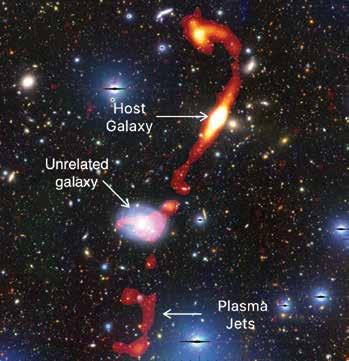
The newly discovered giant radio galaxy ‘Inkathazo’. The glowing plasma jets, as seen by the MeerKAT telescope, are shown in red and yellow. The starlight from other surrounding galaxies can be seen in the background.
than 32 times the size of the Milky Way. The name Inkathazo means “trouble” in isiZulu and isiXhosa, and Charlton said it was chosen because the galaxy’s features have posed challenges for researchers attempting to understand its peculiar physics. “It doesn’t have the same characteristics as many other giant radio galaxies,” said Charlton. “For example, the plasma jets have an unusual shape. Rather than extending straight across from end-to-end, one of the jets is bent.”
The researchers used MeerKAT’s advanced capabilities to create high-

resolution spectral age maps of Inkathazo, which track the age of the plasma jets across different regions. These maps revealed unexpected energy boosts in the electrons within the jets, likely caused by collisions with hot gas between galaxies in the cluster. This discovery challenges existing plasma physics models and highlights the complexities of these extreme cosmic objects.
Dr Jacinta Delhaize, a researcher at UCT, emphasised the importance of MeerKAT in these discoveries. “The fact that we unveiled three GRGs by pointing MeerKAT at a single patch of sky shows

A spectral age map of ‘Inkathazo’. Cyan and green show younger plasma, while purple indicates older plasma.
that there is likely a huge treasure trove of undiscovered GRGs in the southern sky,” she said. MeerKAT, operated by the South African Radio Astronomy Observatory, is a revolutionary tool for exploring the southern sky. As a precursor to the Square Kilometre Array (SKA), it offers unmatched sensitivity and resolution, making it a key player in uncovering cosmic mysteries like Inkathazo. “We’re entering an exciting era of radio astronomy,” said Dr Delhaize. “While MeerKAT has taken us further than ever before, the SKA will allow us to push these boundaries even further and hopefully solve some of the mysteries surrounding enigmatic objects like giant radio galaxies.”
Linda-Gail Bekker, CEO of Desmond Tutu Health Foundation, from UCTs Department of Medicine and the Institute of Infectious Disease and Molecular Medicine, is the lead scientist on a breakthrough drug trial which shows that an injection twice a year is 100% effective against infection. A large clinical trial with 5000 participants in South Africa and Uganda has shown that a twiceyearly injection of a new pre-exposure prophylaxis (PrEP) drug gives young women total protection from HIV infection. The randomised controlled trial was sponsored by drug developers Gilead Sciences.
The trial tested whether lenacapavir, administered just under the skin, once every six months, would provide better protection against HIV than two other drugs, both daily pills. In eastern and southern Africa, young women are the population who bear the brunt of new HIV infections. They also find a daily pill taking regimen challenging to maintain. During the randomised phase of the trial none of the 2,134 women who received lenacapavir contracted HIV. There was 100 percent efficiency.
The significance of these trials
This breakthrough gives great hope that we have a proven, highly effective prevention tool to protect people from HIV. When Professor Linda-Gail Bekker heard the results, she could not contain her emotions. “I literally burst into tears, I’m 62, I’ve lived through this epidemic … I had family members who died of HIV, as did many, many Africans – many people around the world,” she said. The drug could give young women greater agency over their lives and sexuality, she hopes, and potentially eliminate mother-to-child transmission of the virus.
In a comparison part of Bekker’s trial, women were asked to take daily pills
as PrEP against HIV. They continued to become infected – because, Bekker explains, many of them did not in fact take the pills daily. It illustrates why the results for a drug that only needs to be injected twice a year have generated such excitement. Leaders in the field of HIV prevention describe the drug as a ‘miracle’ with the potential to be a gamechanger. “We know that adherence to anything is more challenging for younger people –and that’s because they’re busy, their lives are full, they have things to do, places to be,” Bekker said.
HIV scientists and activists hope that young people may find that having to make this “prevention decision” only twice a year may reduce unpredictability and barriers. For a young woman who struggles to get to an appointment at a clinic in a town or who can’t keep pills without facing stigma or violence, an injection just twice a year is the option that could keep her free of HIV.
In a policy that remains relatively rare for drug trials, becoming pregnant did not exclude women, and 193 became pregnant while on lenacapavir. There are so far no signs of drug-related problems. Bekker and her team will follow the mothers and babies for longer to confirm that the drug can prevent mother-tochild transmission during pregnancy and childbirth, and while breastfeeding. A tenth of new HIV infections come via this route.
Offering women with a newborn child an injection as she leaves hospital is likely to have far greater impact than expecting her to remember a daily pill, Bekker said, and raises the “exciting” prospect of eliminating mother-to-child transmission.
When will the drug be rolled out?
Gilead Sciences have said that within the next couple of months the company will submit the dossier with all the results to a number of country regulators, particularly
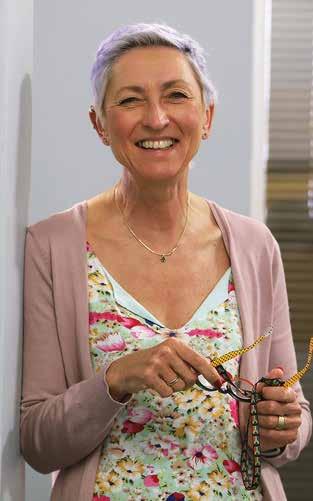
the Ugandan and South African regulators. The hope is that this new drug will be adopted into WHO and country guidelines and that the drug will be tested in more studies to understand better how to incorporate it into real world settings. Price is a critical factor to ensure access and distribution in the public sector where it is badly needed. Gilead Sciences has said it will offer licences to companies that make generic drugs, which is another critical way to get prices down. In an ideal world, governments will be able to purchase this affordably and it will be offered to all who want it and need protection against HIV.

It is with immense sadness that we learnt of the passing of Emerita Professor Lynette Denny (66), former head of the University of Cape Town’s (UCT) Department of Obstetrics and Gynaecology. She passed away on Sunday, 9 June 2024, following a long period of ill health.
A steadfast, kind, selfless and fearless leader and a champion for women’s health in the country and on the continent is how family, friends and colleagues described the renowned cervical cancer researcher at a thanksgiving celebration in honour of her a few years ago.
Professor Denny retired in 2023 and was appointed on a one-year postretirement contract from January 2024. An outstanding teacher, trainer and researcher, she is globally renowned for her work in cervical cancer. During her illustrious career, which spanned
almost four decades as part of the fabric of UCT and Groote Schuur Hospital, she made giant strides in the fight againt cervical cancer. Her unwavering spirit led to ground-breaking research that has improved and saved the lives of thousands of women.
Her relationship with UCT began as a student, graduating with an MBChB in 1983, after which she began her specialist training as a registrar on joint appointment conditions with UCT and Groote Schuur Hospital in obstetrics and gynaecology in 1989, including 18 months as senior registrar in sub-speciality training in gynaecology oncology until January 1993. She thereafter served as specialist (February 1994 to January 1997), senior specialist (1997-2007), principal specialist (2007-2009), and chief specialist from 2010 until she passed away.
Professor Denny was the recipient of many awards, including the 2006 Department of Science and Technology Award for Women in Science in the category Distinguished Scientist Award and the CANSA AG Oettlé Memorial Award in 2015 in recognition of her remarkable
contribution to reducing the impact of cervical cancer on women. A career highlight was the Order of the Baobab (Silver) received from President Cyril Ramaphosa in recognition of her work as a leading global researcher in cervical cancer and its association with the human papillomavirus (HPV).
She has been described as a remarkable woman, colleague, mentor and friend, but above all, a humanitarian with uncompromising values. Colleagues in the Faculty of Health Sciences remember her for how she gifted her department, faculty and university and the people of this country unmeasurable dedication and love, and for remaining a stern and unwavering advocate for the most vulnerable women in society. She served with extraordinary distinction and provided exceptional vision, steer and leadership – and she conducted this with admirable humaneness, humility and servient dedication.
Professor Denny’s legacy will forever be engraved in the rich tapestry of the faculty of Health Sciencs, UCT and beyond South Africa’s borders.


It was with sadness that UCT learned of the passing of Henry Blumberg (UCT LLB Class of 1966). He passed away peacefully, on Saturday, April 27, 2024, at North York General Hospital in Toronto, Canada. Beloved husband of Marcia, and loving father and father-in-law of Jonathan and Pam, Mark and Lisa, Kevin
and Alisa, and the late Sean Blumberg, Henry was also the devoted grandfather of Ethan, Matthew, Theo, Kate, Mia, Evie, Julian, Bram, and the late Sasha Bella.
Henry was born in Hoopstad, South Africa, and studied law at the University of Cape Town. He met his wife Marcia Sacks on the steps of Jammie Hall and was active in the SRC while a student, protesting against the injustices of the apartheid struggles. They moved to Port Elizabeth, where their four sons were born and then emigrated to Canada in 1980 with their children. Henry was a lawyer in South Africa and Canada, a real estate developer, a genealogist and a writer of two powerful memoirs.
Henry was also a stalwart donor and supporter of UCT in Canada, having
It was with sadness that UCT learned of the passing of the legendary Madi Gray, who played an active role at UCT and in South Africa as an anti-apartheid activist. Madi was an editor on the UCT student newspaper Varsity, and was a leading participant in the 1968 Archie Mafeje sit-in in the Bremner Building. Later, Madi worked for the SA Institute of Race Relations in Soweto.
Madi Gray was born in Cape Town, where she grew up, attended school and went to university. Her parents were immigrants from Germany, who came to South Africa during the inter-war period. As a child, Gray became aware of the difference in the treatment of people, based on colour. She enrolled at the University of Cape Town, where she studied for a Bachelor of Arts degree, studying sociology, psychology, anthropology and German. She then went on to do an honours degree in psychology. She got a bursary for a couple of years but had to find part-time work so that she
could continue to study. As a result, she did not have very much time to do more than sign the odd petition and participate together with many others in political demonstrations.
Her interest in journalism led her to join the editorial board of the university newspaper, Varsity. In 1968, the year that she was the news editor, the students had a sit-in and occupied the administration buildings for ten days. At the time, Gray was a member of the National Union of South African Students (NUSAS).
During the 1970s Madi helped feminist demonstrations in London for the right to abortion. She helped run the ANC representative office in Stockholm, Sweden. Her phone was tapped by the Swedish secret service, and she was the object of attention of apartheid spies. Madi volunteered with many solidarity groups such as the Committee for Freedom in Mozambique, Angola and Guinea Bissau, CFMAG. Madi and Bertil
set up the UCT Foundation in 1993 and played a crucial role in fundraising for UCT initiatives.
In 2011, together with Marcia, Henry was awarded the Vice Chancellor’s Medal from UCT in recognition of his countless hours of volunteer work for the benefit of the University. He received the Humanitarian Award from the South African government in 2009.
Since 2007, Henry funded the Henry & Marcia Blumberg Prize, for service to the student community. This prize, which is awarded annually to an LLB student who has worked hard both academically and in service of the wider student community. The faculty of Law is honoured to be able to continue in perpetuity the endowed annual prize.

also spent a period working in newlyindependent Mozambique.
After democracy came in 1994, Madi returned to South Africa, and re-invented herself as a tourist guide, specialising in Swedish tourists. She took a leading part in organising the Spirit of ’68 sit-in’s 40th reunion and helped set up the Spirit of ’68 Bursary fund which the sit-in veterans established.
After holding a combined 80th-81st birthday celebration, Madi passed away from a relapse of cancer. She is survived by her daughter Nandi, and two granddaughters.
who was passionate about being a doctor in Africa

The family of UCT alumnus Douglas Shennan, who studied medicine at UCT and who recently passed away at the age of 96 found a story of his life on his computer, which they share with us. Like his father, his medical studies were interrupted by fighting in the war. He practiced medicine in Zimbabwe, Malawi, Barbados, Transkei, Ciskei, England, Scotland and Wales. At the age of 88, he decided he needed to find a new profession, so he studied accounting and followed that path. He was an avid cyclist, winning his age category of over 85 two years in a row. He was part of what is now four generations of doctors. His daughter Carmel is an anaesthetist, his son Andrew is an obstetrician and his two grandchildren are doctors.
Origins
My father was born in Edinburgh in 1893 and went to Edinburgh University to study medicine. When the Great War broke out, he had completed four of the five years of his degree but went off to the Royal Artillery. He was wounded twice and earned the Military Cross and then returned to his degree. I was born in Scotland, but my father developed pulmonary tuberculosis and was advised to live in a warm, dry climate, so we set sail for Cape Town when I was four years old.
A start at Smuts Hall and medicine at UCT and then off to the army
I was accepted to study medicine at UCT and lived in Smuts Hall residence. After my second year, I volunteered for the army and was called up for occupation duties in Burma, going to Nairobi and then to Nakuru for jungle training up and down the Rift Valley lakes. We sailed from Mombasa to Bombay in an adapted cruise ship, followed by a slow railway journey to Calcultta. From Calcutta we sailed to Rangoon to release some of the officers and sergeants who had been through the war. Thereafter we went to Payagi where we had to guard a large surrender camp of 13 000 Japanese soldiers. Later we were moved to a prisoner of war camp before returning to Mombasa by ship, where we embarked on a 10-day overland journey by trains, coaches and ships back to Salisbury.
Returning to Cape Town and meeting interesting people such as Irma Stern Finally, I returned to Cape Town to continue my medical studies. After lodging with a family in Rosebank for six months, I moved into Medical Residence near Groote Schuur Hospital. At a friend’s party I met up with Morag Chisolm, whose father, Eric Chisholm was a prominent Scottish composer, conductor and Professor of Music at UCT. I met numerous interesting people in their home, including Irma Stern, the artist, Albert Coates, the composer, Eugene Goosens, the conductor and Lili Krauss, a virtuoso pianist who had fled Hitler’s Germany and was on the staff of the College of Music.
After graduating from UCT, I took a trip to Shabani, where I was eager to take up a house job at the same hospital where my father had first worked when we first arrived in Southern Rhodesia. I worked there with Peter Brain, who had an office full of blood samples we used to determine the distribution of the sickle-cell trait from miners recruited
from the local area and neighbouring countries. After a stint back in Cape Town, I set off for Britain to do two courses, two more house jobs and three diplomas, in Tropical Medicine & Hygiene; Child Health and Public Health. At Bethnal Green Hospital, which was full of Irish nurses, I met Theresa who later became my wife. After six months at Southampton Children’s Hospital I applied for a post in the Southern Rhodesian Government Medical Services and was told to leave immediately if I wanted the public health position. This meant Theresa didn’t finish her nursing qualification and we were married in Wales before heading for Umtali (now Mutari) to start my new job. For the next five years my work was divided between statutory school medical examinations of white school children and an extensive tuberculin survey and BCG (anti-tuberculosis) vaccination campaign of all African schools in the province. Three of my children, Malcolm, Carmel and Catherine were all born in Umtali.
Tuberculosis treatment and control was a prominent concern and three effective drugs were discovered and made it possible to run national programmes and achieve control over the disease. I took the post of Superintendent of Mpilo Chest Hospital in Bulawayo, before
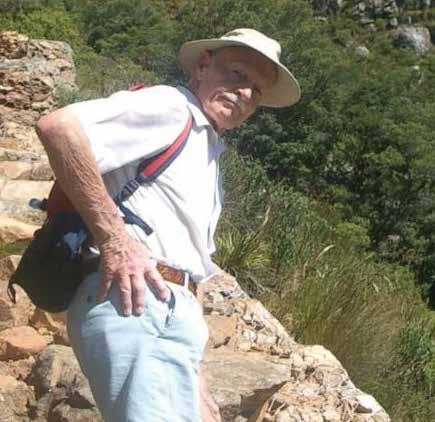
heading off to Penarth, near Cardiff, where I did another diploma, in TB and Chest diseases. I had originally planned to stay on so that I could study for the Membership of the Royal College of Physicians in Edinburgh, but Africa was calling, so we returned to Bulawayo. A TB specialist post was vacant in Nyasaland (now Malawi) and we moved to Blantyre, where my son Andrew was born. My work entailed running the national TB programme, taking responsibility for a central TB hospital or unit and visiting the district hospitals to consult with doctors. It was satisfying to combine my original career of public health, with hands-on work with patients. The great challenge in developing countries is to devise a system of administering drugs to ensure they will be taken regularly. At that time the course had to last for 18 months, while now it is down to six months.
Return to Rhodesia
We then went back to Rhodesia and I was posted temporarily to Gatooma (now Kadoma) which had a large TB hospital and then I moved to Salisbury to become a TB specialist. Dr Wallace Fox, head of the TB section of the British Medical Council approached us to run one of their drug trials in Rhodesia, which we did in several centers. In 1965 when Prime Minister Ian Smith declared independence and introduced a form of apartheid by creating two separate voters’ rolls for whites and blacks respectively, I resigned and we went back to the UK. In retrospect, I can see that it wasn’t purely a matter of principle, I was also driven by a quest for adventure and a desire to do something new.
We were allowed to leave Rhodesia with four hundred pounds so we packed up as much as we could, including our Austin Mini-Minor and shipped them through Cape Town to Southampton. The rest of the money we had to leave behind came in handy when our daughter Carmel opted to return to Rhodesia to study medicine and got married there the year after she qualified.
Living and working in the UK
I had an interview lined up at Edinburgh University, however, on the 3-day journey north with our four children, our Mini kept breaking down and I arrived too
late for the interview. I found a job as a lecturer in public health at Newcastle University, where I tutored post-graduate public health students. However, I did not have sufficient knowledge of British public health practice, having worked in Africa for so long. While there I wrote Tuberculosis control in developing countries, the only book I ever had accepted by a publisher.
Return to Malawi and off to Barbados
My two years’ residence in the UK qualified me to work overseas through the Overseas Development Agency (ODA) and I applied and was sent as TB specialist to Blantyre, Malawi. The programme had lapsed, so there was much development to be done but we had a contingent of high-caliber US Peace Corps volunteers who worked with us. Our three older children went to boarding schools in the UK and Andrew started as a boarder at the age of eight.
After the three-year contract in Malawi ended, I went to Barbados as Senior Medical Officer of Health, based in Bridgetown. The poor, ill and aged were looked after in a network of district hospitals reminiscent of British almshouses of the nineteenth century. I attended meetings in Chile, Colombia and Guyana. Our children came to Barbados for school holidays and did much sailing, but we eventually returned to the UK to meet the needs of our children’s education. I worked for a while in Cardiff, South Wales, which was the worst place in Britain for pneumoconiosis in miners – many disabled by progressive massive fibrosis of the lungs.
Itchy feet and new work in Swaziland, Umtata and King William’s Town I was once again afflicted by itchy feet and applied to the ODA for a TB job and was sent to Swaziland for two and a half years. From there I took up a post of TB specialist in Umtata in the Transkei, where I remained for five and a half years and met medical superintendents and district medical officers with a wide range of backgrounds, including missionary doctors. I was asked to write the section on tuberculosis for the fourth edition of the text Diseases of Children in the Tropics and Sub-Tropics and worked with
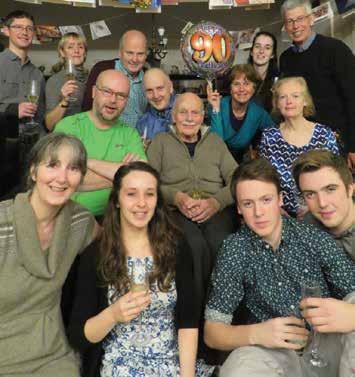
Professor Maurice Kibel from Red Cross Hospital. From there we moved to King William’s Town for me to take up a post in the Ciskei. While there I started cycling more seriously again and made frequent trips on my bicycle to East London (80km), returning by train. In March 1992 I went to Cape Town and did the Cape Argus Cycle Tour, which I thoroughly enjoyed. We then decided it was time to be more available to our family, so we returned to London. Theresa and I started playing bridge in Swaziland and continued playing in the Transkei and in Ealing in London, finding it a great way of making friends. A week after we celebrated our golden wedding anniversary with the entire family, sadly Theresa had a heart attack and died two weeks later. I still cycle regularly – having ridden the Cape Town cycle tour fifteen times and won my 85+ age category twice. By 2012 my balance was deteriorating and I thought I couldn’t do the cycle tour again, however in 2013, when I was 88, my two sons Malcolm and Andrew joined me for the ride and stayed with me the whole way, protecting me from any hazards! We even stopped to thank the volunteers at the top of Suikerbossie who had assisted me the previous year when I fell off my bike there. The following day, we followed the family tradition of climbing up Platteklip Gorge to the top of Table Mountain– something we did every year the day after the cycle tour.
In a late eighty’s career change, I did a course in book-keeping and took on volunteer accounting work, which provided challenging, yet enjoyable work beyond the world of medicine.
In his nine years of being UCT’s registrar, Royston has signed just less than 70 000 degrees/certificates. Not only will his presence at graduation and his signature on degree certificates be hugely missed, but the UCT community will miss his warm smile, his calm demeanor and his voice of reason that has helped to keep the UCT ship sailing through some stormy seas.
Who is this remarkable giant who spent nine years as a student at UCT (full time and part time studies) and 27 years as a staff member?
UCT Student and Educationist
Royston started as a student in the Arts Faculty at UCT in 1980, majoring in history and politics. His plan was always to go into education, and after his teacher’s diploma and B.Ed, he went into teaching and was a deputy principal of Grassy Park High School on the Cape Flats for four years. He enjoyed the school community and working with students and particularly enjoyed getting involved in sport at school. The combination of coaching sport and teaching subjects he was passionate about was particularly rewarding for Royston.
Going beyond the confines of the school grounds and understanding the changing South African landscape in a broader way
At the end of his four years in a management role at the school, Royston realised that he wanted to get beyond the confines of the school boundary fence and that he needed something else to challenge him. He comments, “UCT – a major institution in the country - had always been aspirational for me as a place at which to work. Now, having worked here for almost three decades, I realize just how major it is - not only for the country but also for the continent. An institution like this deeply impacts society and is a microcosm of what is happening around it. For me this was an opportunity to understand the changing South African landscape in a much more informed way. That has
been a huge gift and I was fortunate to have the opportunity to work here”.
Working my way through the many levels and layers of UCT
It is interesting when I look back, with my first job at UCT being in student affairs. Thereafter I became the first faculty manager of the Faculty of Humanities. The latter was borne out of the merged previously separate faculties of Arts, Social Science, Education, Fine Art and the departments of performing and creative arts. My next assignment was as the Director of Student Admissions, a short secondment to UCT’s Peoplesoft implementation project and from there I moved in 2004 to the Bremner Building, in many ways into to the belly of the beast, as the Director of the Office of the Vice-Chancellor.
Catapulted into the registrar position through leaders exercising the duty of stewardship of the next generation When I came to work at UCT, I never ever thought I would be the registrar. I would have been satisfied with the kind of work I was doing in the preceding years. When I look back on my journey to becoming the registrar, I am struck by two interventions without which I may not have had the confidence, the awareness or even thought about the possibility of becoming the registrar. Professor Njabulo Ndebele, former UCT vice-chancellor planted the seed in 2004, when he said to me – some ten years before it happened – that the complexity I would be exposed to through the role of director of the office of the Vice-
Chancellor, could potentially be a platform from which a career as registrar might follow. He was encouraging me to go beyond my comfort zone. Former dean of Health Sciences, Professor Marian Jacobs, called me one day in 2008 and said to me, ‘I think you need to up your game.’ I asked her what she meant, and she said I needed to do a senior leadership programme at the Graduate School of Business. I reflected on that and in 2009 I enrolled at the GSB and did a two-year leadership programme. Then in 2014 Professor Jacobs phoned again and said, ‘it has been decided.’ When I asked her what had been decided, she said, ‘The registrar’s position has been advertised, and it has been decided that you will apply. I asked her who had decided, and she said that she had.
I will forever be grateful to those two individuals who entered my life at a particular time at UCT and impacted my life so profoundly. Their sense of my possible future propelled me into the next sphere; they believed in me and wanted to see me succeed because they were invested in growing the next generation. Their influence and guidance opened up a professional path that unfolded and had a positive personal impact on my life, which has been momentous. These were individuals who expressed confidence in me, giving me an indication of what they thought of me and challenged me to think about what I thought about myself. My path to the registrar’s position wouldn’t have happened without their prompting. They had nothing to gain from this, no ulterior motive, they were just doing what good leaders should do. These are two iconic examples from my professional life. Njabulo Ndebele and Marian Jacobs exercised a duty of stewardship –they thought about the next generation.
Life in the Belly of the Beast
Being in the Vice-Chancellor’s office afforded me the opportunity to be present in senior management meetings and to gain a thorough understanding of the complexity of the university. I worked closely and productively with my predecessor Hugh Amoore to make the transition and in 2015 I was appointed registrar designate and assumed the position fully at the start of 2016. This is not a job you can just hand over. It is far too complex to be taken lightly.
Changing the profile of our student community – one of the biggest changes I have witnessed in my time at UCT
It has been phenomenal to see how UCT has evolved over the three decades I have been here – almost four decades if my student days are included. Most fundamentally, what you see and experience at graduation ceremonies today is a critically important marker of how UCT has changed. The profile of our student community is very different to when I was a student here. I believe this is a function of a number of factors, one fundamental such factor being a very deliberate effort on the part of university to expand its feeder school base. The direct results of this are very impactful and visible in the graduating classes today. Experiencing graduation ceremonies today and hearing the citations for the senior degrees, I am always blown away by what people are actually studying, the quality of work, the interesting subjects and new knowledge being generated.

UCT, its students and academics do very well in this regard, and society benefits as a result
Talent is randomly distributed across communities, but opportunities aren’t necessarily distributed the same way It is vital to understand that talent is randomly distributed across any community, but opportunity is not necessarily randomly distributed in the same way. What is remarkable to me is that the university has been able to play a role in making opportunities available that would not previously have been afforded to many students. It is critical to be deliberate about making opportunities available to students and thereby doing something about changing the historical imbalance between the natural distribution of talent and opportunities for such talent to be allowed to flourish. To UCT’s credit, it has created a more equitable distribution and alignment of talent and opportunities across society. UCT is much transformed – it may not have reached an end point – but it has certainly made much progress over a sustained period. This can be credited to the remarkable changes instituted by the university leadership, the council and the senate, and with major contributions of many staff who have helped the institution in that journey.
I started my role as registrar on 1st January 2016 and on 16th Feb 2016 the campus was on fire, quite literally This was truly a baptism of fire. The fact that the office of registrar was able to play a part in a process where it ensured the institution remained as stable as possible, and kept the wheels turning under those difficult conditions, is remarkable. The office needed to recognise that times were changing fast and to be adaptable to that, embracing change whilst also protecting the institution where it was necessary to do that.
The voice of reason, level-headedness and calm through flames
Royston describes how his mantra was to project calmness, rationality and reason. “This didn’t necessarily mean that inside my belly there weren’t knots. I recognised that this was a difficult job in a difficult environment. Calmness is absolutely critical – because the opposite of that is unhelpful and will inflame situations. Calmness became my armour as I strove to be rational and avoid being dramatic. Often it was about helping to keep the wheels turning whilst also being emotionally attuned to the fact that times were changing. I realized I needed to find the balance between doing what the job required me to do while not doing it in a way that I was just a channel for narrow bureaucracy. It was important to have emotional awareness and recognise there is a bigger picture. I often reminded myself that one of main reasons I wanted to work here, was to gain a better sense of broader society and what was happening here was a microcosm of society”.
Setting aside your own personal views
In an organisation of UCT’s pedigree, history, complexity and size, it is true that rules, policies and conventions are critically important, in particular those which have served UCT well and have stood the test of time. But it is not about enforcing rules blindly – it is about being creative and finding ways to interpret rules without necessarily breaking them. You need to discern where you have to give a little bit, where to hold firm and where you need to be informed in making decisions, realizing that you are discharging the duties of your role from an institutional perspective and not a personal one. A critically important role required of any registrar is to not be blinded by your view of the world. As the registrar you are required to adopt an institutional role and mantle that at times can test your own view on the world.
Royston quotes Douglas Bader who said, ‘Rules are there for the guidance of the wise, and obedience of fools.’ He explains what this lesson taught him: I thought about it often with regard to how you navigate the space which is rule-bound (what registrars typically are required to do). You need to find ways to use rules in a creative manner that are enabling but also have recourse to them when you need them, without being a slave to them.
Team support: Royston’s greatest learning while at UCT Royston reflects that the most significant learning for him is that you cannot achieve anything sustainable in this world, without the support of a team. “Successes at UCT are a direct function of what teams of colleagues are able to do. I have had so many examples over the years that confirm that it is not possible to achieve anything sustainable and worthwhile without the support of people around you. That means recognizing the value that others bring and recognizing that they have skills and expertise that I don’t have and that I need them, and the institution needs them. When you embrace such an approach, achieving goals becomes much easier.
I worked with five vice-chancellors directly and two indirectly and I have worked alongside numerous senior staff members across all portfolios, as well as with the UCT Council and Senate over three successive terms. Again, nothing sustainable would have been achieved without the support of teams. I had the
benefit of being part of numerous teams and grew from my experiences of working with so many talented people. Long may a spirit of esprit de corps continue. That is my sincere hope for UCT going forward.
Where multiple worldviews prevail, be empathetic and realise that ambiguity and contestation are part of the complexity of our environment today. It doesn’t make it easier. It’s about negotiation, putting forward data-informed positions and convincing others. It’s complex but can be done.
What I wish for UCT: Protect UCT’s brand so that it continues to be relevant
This institution needs to continue to be relevant. For that it has to be in a constant state of learning and renewal. As it repeatedly does that, it will continue to be relevant for the country and the continent. That is my wish for UCT – to continue to be relevant and impactful. The brand of UCT is massive and thousands of people (academics, students, PASS staff, alumni and generations of UCT supporters and friends) over many decades have contributed to building it and it needs to be protected. We need to protect the brand by ensuring that we do things so that the university continues to be relevant for all future generations. UCT has a rich history, but it is also about the next 100 years.
leading university
Our society is in constant flux and transition and UCT has also been transitioning, as it must. The UCT community is not homogenous, in fact it is the direct opposite of that.
This makes it imperative to focus on universal values that transcend the limitations of worldviews that may not be shared by all. The way through the challenges is to focus on universal values so that people find commonality, rather than playing up issues that rip communities apart. This was something I aimed for continuously. It is of course not a panacea, but it makes for a more constructive approach than the obvious limitations of other options.
The other thing I tried to do when I went to sleep at night, if I was worried about a decision that needed to be made, I would ask myself the question, ‘if I make decision X and tomorrow morning I will be uncomfortable with that decision, can I reverse it?’ If the answer was that I couldn’t reverse it and the consequence of that decision might be untenable, I would delay making that decision. This creates a fine line as you also don’t want to put yourself into paralysis where you end up not making decisions. Where a decision needed to be made and I could reach a comfort threshold with the consequences, I would make the decision. In this job, you cannot dilly-dally – you need to be considered, thoughtful, take advice and you need to not be scared to ask people for their opinion as part of the decisionmaking process. My advice to my successor is do not be scared to make a decision but don’t play loose and fast with the impact your decisions will have on people and students. Consider the consequences, be thoughtful, don’t be scared to ask for advice, be guided by principle and always consider what might be best for the institution.
Enduring memory: Loneliness counterbalanced by warmth and generosity of UCT community
As Hugh Amoore was leaving in 2015, he told me that at times being the registrar is a very lonely space. I found that to be true: there were many difficult moments, and it was a lonely space. What I’ve also found, however, was that the generosity of spirit and warmth that I experienced from many different colleagues (across all sectionalities), made it possible to cope with the loneliness. The warmth would often come when I least expected it – I would receive an encouraging WhatsApp, email, telephone call from out of the blue, someone whom I didn’t know would come up to me on campus and beyond and express appreciation for my role and what I do. That was very affirming and more of that needs to happen in our communities. That is why I am resolute about my enduring memory – that without people you can’t achieve anything meaningful that will last.
I have been blessed and very fortunate to have had the opportunity of a career at UCT and to be the registrar. I am proud of that. I have learned much more than I have taught, and a number of people have helped me along the way.
Magical moment that stands out of time at UCT Alumni News Magazine asked Royston if he could choose one moment from his career to relive what that would be. Such a magical moment that stands out for him, although that moment only emerged out of a very stressful period for the university. Without a moment’s hesitation he replied that in 2017, because of political disruptions in the higher education sector, UCT was at risk of not being able to transact its year-end exams in campus venues that it would ordinarily have used. A quick-thinking and creative team arranged for a massive marquee on the UCT rugby field as a university-wide venue for exams that year. Royston comments, “It was very concerning that we had to do that and it came with all kinds of issues and risks. UCT’s physical infrastructure and building footprint is extensive, but despite this the 2017 exams had to be taken in a temporary structure, a tent. The magical moment was what emerged from those three weeks of running the emergency operation in order to ensure that UCT’s core business could conclude for the year in question. We miraculously managed to get through the exam cycle and complete 2017’s academic program. The consequences and implications should we not have been able to conclude the exam component of the academic programme would have been disastrous for the university, for our students and for the future of UCT.
The magical moment was that with a team of colleagues from multiple UCT departments we pulled off this dramatic intervention. Overnight a massive marquee went up and the solution unfolded. The angst and anxiety of running the marquee venue was high, but it held and for all of us this was a great relief.
This position comes with huge responsibilities, long hours and amazing achievement which take their toll – has it been worth it?
The answer is yes, it has taken a toll. Would I do it again? I say a resounding yes. It is not an easy role, but nothing worthwhile is easy. Would I have been more satisfied doing something
else? I don’t think so because I wouldn’t have been pushed and stretched as I have been in this role. I have been able to be part of something meaningful during a time that UCT’s history will record has been most colourful - filled with challenge, not easy, while also showing what is possible. In current times it is not the kind of role you can do for an extended period. I think I have made my particular contribution at this time in (quite a turbulent) history. As a consequence of this journey, I think I may be a bit wiser. There is a fine line between staying for an appropriate period of time and overstaying. I have reached a time where it is appropriate for me to step back and to pass on the baton.
An ambassador for UCT and advice for alumni
I leave this institution as an ambassador for UCT. UCT is a major institution and will continue to be impactful for many years to come, and for the benefit of many people, and I am proud to be associated with UCT.
We need to be constructive about how we make a contribution to UCT going forward.
Support UCT especially during a time when complex issues confront the university. Remember this is your university. Continue to be an ambassador for it.
Retirement plans
I definitely need the first couple of months to be unencumbered, to lessen the load that I have felt for the past many years and recharge. To find time to reconnect with those who are close to me. In the time that I have been in this position, I haven’t had the opportunity to fully engage in my son’s life, because I was often too busy professionally. I will never forget when he was around 12 years old, I got home and there was a letter from him asking , ‘Dad, when may I have an appointment to see you’. I am looking forward to having the flexibility to make up for some of the lost time, even though today he is an independent 19-yearold who thinks that his father dresses funnily!
I would like to continue to contribute in spaces where I may be able to advise others based on the lessons I have learned during my journey thus far. I want to transition to the next phase of my life, on a personal and professional level. I am looking forward to reading for pleasure – and not reading complex legal documents to the extent that I was required to do so over the past years! And having time to catch up with friends.
If money was no constraint…
I really enjoy sport, and there was a time when I used to swim and play club soccer and squash. If money was no constraint, my dream would be to travel around the world watching the major sporting events.
I’ve studied at UCT for 9 years full and part time, worked at UCT for 27 years. I know only one university. UCT is my benchmark and yardstick. I am going to miss UCT.
AN: And UCT will certainly miss this amazing human being who walked through fire for UCT and impacted it with his wisdom, his calm demeanor and team approach. Go well Royston!

Professor Dizu Plaatjies retires at the end of 2024 after a stellar career spanning almost three decades at UCT’s South African College of Music (SACM). His musical legacy will live on though, as scores of local and international music graduates have benefitted from his vast repertoire of musical knowledge.
Internationally acclaimed musician and music educator
Professor Dizu Plaatjies retires at the end of 2024 after a stellar career spanning almost three decades at UCT’s South African College of Music (SACM). His musical legacy will live on though, as scores of local and international music graduates have benefitted from his vast repertoire of musical knowledge.
Aside from teaching African music as a theoretical and practical subject, Dizu has been a prolific recruiter of international students – particularly from the US – who are fascinated by African music. An average of 100 students enrol for a six month course and soak up all they can from their lessons during that semester. In turn these students act as great ambassadors for this UCT semester course. Often their friends and associates also enrol for the course. “I’ve been doing this now since 1995 and have been responsible for earning the university a lot of revenue,” said Plaatjies.
For most of his life Plaatjies believed he had been born in Lusikisiki in Mpondoland. However he recently learned that he actually was born in District Six, and at the tender age of three weeks moved to Luisikisiki where he spent his formative years.
His musical journey began immediately because his father was a traditional healer and used music as a healing modality. As an infant Plaatjies was exposed to numerous divining ceremonies where music forms the event’s foundation.
“Every Friday, Saturday and Sunday we’d have ceremonies, so it came into my blood, that music! I really wanted to be somebody, not a traditional healer, but somebody like either an instrument maker or an instrument player. That music [from the divining ceremonies] took me to a state whereby I realised that I needed to be a musician.”

It was after this realisation that Plaatjies began making the type of drums that the traditional healers were playing. “I started by imitating everything that they were playing, and making them by copying. That’s how I became an instrument maker.
This observational skill extended into his music playing too. “I was not taught by somebody, no, I learnt by looking and listening. The music of the diviners was just driving me crazy. Sometimes, you know, when I listened to all these songs, the way they were singing. and the drum and the dancing and so on – it was mesmerising. I could not always understand the process because nobody tells you why certain things are happening.
Growing up he fell in love with the sound of the trumpet and at age 18 a trumpeter friend taught him to play it. However Plaatjies’ father really discouraged him with regard to his trumpet playing. “I said, ‘Hey, I like this instrument!’. But my father discouraged me, he said most trumpeters never get married or have families. I was just learning just to understand trumpet, but my heart was not there anymore. I was not there anymore.”
This is when his musical tastes underwent a profound shift and he began charting a course towards African music. He first learned to play the kudo horn and then other African instruments were introduced and he also began learning how to read music.
“It was then that I started to fall very much in love with African music”, he said. His growing appreciation of African music was nurtured when he attended local music festivals in the Cape Town townships which ran from 1966 to around 1971. At the festivals he was introduced to local artists such as as
the internationally acclaimed Mahlathini & the Mahotella Queens.
“The musicians at these festivals were from all over South Africa, the Shangaan people, the Zulu people and all these other tribes. They would go to the stadium, where we would witness something that we’ve never seen in our life, traditional music with different instruments. That really inspired me more and more. Then I said that this is what I would like to do, because I liked those artists who were so full of energy and full of life. I then knew that this is the music that I would like to play.”
Honing his musicianship in the late 1960s and through into the 1970s Plaatjies absorbed all the music that he encountered. In 1979 he founded his marimba and percussion band, Amampondo. This band went on to release three albums and became world famous.
Initially the band busked on the streets of Cape Town and played the festival circuit. They made their first professional recording in 1983, The Heartbeat of Africa – Uyandibiza. This was recorded live in Cape Town City Hall and produced under the guidance of their first manager, Bruce Gordon. Later they joined up with another manager, Donald Graham, who guided and advised them through the release of their next two albums.
As Amampondo’s repertoire and reputation grew, the group decided to relocate to London. From 1986 to 1988 they were based in the world’s music capital at a time that world music was first becoming a prominent and celebrated genre.
Their popularity grew swiftly and as there were no other bands like Amampondo in London at the time, they became an overnight sensation with pictures of them playing in their traditional costumes appearing in many newspapers. Among their most memorable gigs was appearing at the Queen Elizabeth Hall in London where they performed for the Queen. They were also invited to perform for Nelson Mandela’s 70th birthday concert which was held at Wembley Stadium in 1988. Sharing the stage with Sting, George Michael, Jonathan Butler and Plaatjies’ childhood idols Mahlithini and the Mohotella Queens among a host of other well-known artists, the concert was viewed by a worldwide audience of 600 million people.
Their appearance at the concert however was not without controversy. In the run up to the concert, the ANC cultural desk demanded that Amampondo be boycotted. No clear reason was given and eventually Oliver Tambo intervened and said that Amampondo were part of the anti-apartheid resistance and should perform. However after the concert there was an orchestrated effort by the ANC cultural desk that the group not be allowed to perform in South Africa or overseas. Plaatjies puts the boycott down to jealousy, but the results of the boycott were severe as gigs dried up, a planned world tour had to be cancelled and the musicians’ livelihoods were threatened.
Eventually the reason for the boycott was articulated and it came down to the fact that Amampondo had toured in Israel and Taiwan. “I said that we’re not the first artists to travel there and other artists with the same touring schedule were never boycotted!” he said.
“In 1988 when we were boycotted. when we came back to Johannesburg . And you can imagine, when you’ve been an artist that you perform in all the festivals in Johannesburg. Now all of a sudden, you are boycotted because of something that you don’t know. And then the festivals of Johannesburg, it was difficult to have Amampondo because of that boycott. It was one of the saddest thing that ever happened. I’ll never forget. even though we can forgive about what they did, but I will never forget.
Plaatjies wanted to have a meeting with the officials who made this ruling, but his appeal to meet was never granted.
The reality of the matter was he and the other band members had to find other forms of income. Plaatjies turned to clothing production and textile design. “I had to go to Swaziland and Zambia to learn about textile designing and tie-dye and so on. Because we had nothing, we didn’t know where the next meal would come from. When I came back I used to make costumes for most of the groups from Johannesburg. He eventually became so proficient that he designed clothes for Bishop Desmond Tutu’s children.
Foray into music education
His love for music never abated during this time and eventually a friend of his suggested that he devise a music education programme for schools. It was at this juncture that Plaatjies other great love – education – came to the fore.
The first school he went to had hearing impaired learners and he recalled he thought of a way to get and hold their attention. Before entering the classroom he reversed his cap and jacket – putting them on backwards and took off his shoes. He then entered the classroom imitating a baboon. This caught the attention of the learners and they were convulsed with laughter – so much so another teacher looked into the classroom to see the cause of the commotion. Plaatjies then started teaching the fundamentals of rhythm through clapping which really captured their imaginations.
“The music programme took off and I was always doing demonstrations in different schools. Teaching became something that I really considered. I grew to love teaching because I saw these kids falling in love with the different instruments that I was demonstrating,” said Plaatjies.
His interest in education finally led him to UCT in the late 1980s were he began helping SACM lecturer, Paul Rommelaere, to teach the practical side of African music to Paul’s more theory based teachings.
“What I did was, I went to opera, classical and jazz and took two students from each genre and I formed a band which played together. That’s when people start to realise the beauty of music, when you are sharing all these different genres. After a while, I was supported by Professor James May.
While Plaatjies was visiting the US in 1994, SACM’s Professor May sent a fax to New York, asking him to come back to SA for an interview for a lectureship post. May sent his plane ticket to New York and he returned to Cape Town where there was an audition, followed by an interview with SACM professors. He was then offered a junior lectureship post.
Forging an academic path
“After some time Professor May said to me, Dizu, you’re the only one here without a degree, and I don’t want people to take advantage of you. So I started out by earning a Diploma in African Music and Dance, then my BMus in African Music, then Honours and finally my Master’s degree.
Plaatjies paid tribute to his fellow academics at the SACM and further afield whom he really feels he learnt from and benefited from their guidance in academia. He said ethnomusicologist Professor Andrew Tracey was a great role model for him and really helped him solidify his status as a leader in African music. “I learned so much from Andrew Tracey and he was very generous in sharing his knowledge. Gerhard Kubik, the renowned Austrian music ethnologist, is another role model. He taught me a lot about Ugandan music!” Dr Deidre Hansen from the SACM was a mentor to Plaatjies and she also willingly shared her expertise with him.
After a UCT career spanning 36 years, he said his highlights have been performing in the annual Vice-Chancellor’s Concert.
“Here at the college, the most beautiful thing that I always enjoyed was that when we performed for the Vice-Chancellor. These concerts really show that we are all part of the UCT community.
Another highlight was performing at the installation of former Vice-Chancellor, Dr Mamphela Ramphele which was attended by Nelson Mandela.
When he closes the door to his SACM office at the end of 2024, he will not be saying good bye to music or education. He will guest lecture internationally and keep performing with his band Ibuyambo, with which he has toured the world. “I would also like to be a bridge for those students who want to come to the university to do African music and I’m hoping to travel to as many universities as I can – especially here in South Africa.”

MIT Professor Klaus-Jürgen Bathe fell in love with South Africa when he was a student studying at UCT for his BSc in Civil Engineering and Engineering Mechanics in the 1960s, graduating as a gold medallist in 1967.
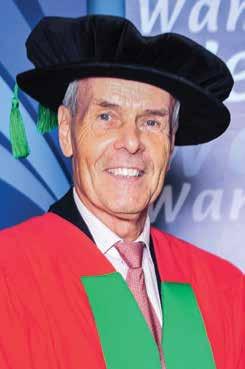
Having been a scholarship student himself, he is only too aware that financial and social support for talented students can make a huge difference in a person’s life, whilst having a positive effect on many people.
Generously funding the KJ Bathe Scholarships at UCT since the 1990s, Professor Bathe established the KJ Bathe Leadership Programme in 2014. On his visits to South Africa, Professor Bathe was concerned about the problems facing South Africa and the continent. He believes every country needs good leadership in key spheres of human activity to ensure a decent standard of living for all its citizens. He said “As a continent, Africa is blessed with abundant natural resources. However, to realise its full potential, the continent needs a critical mass of moral leaders committed to properly managing its wealth of resources, eradicating poverty and unemployment, and improving health and educational facilities for all”.
Thus, his idea of a leadership programme at the University of Cape Town was born. In early 2014, he made a generous donation to establish the Klaus-Jürgen Bathe Leadership Programme. The programme’s primary goal is to produce graduates with outstanding leadership qualities and a strong sense of social justice who would play significant roles in business, government, industry, and civil society in South Africa. Registered students from across all six faculties can apply for the scholarship.
“I love South Africa,” he said. “To ensure a prosperous and peaceful future for all its citizens the countries in Africa, as all nations worldwide, we need excellent leaders. With good leadership, the dream of prosperity and peace for everyone will be realised,” he added.
Heartwarming appreciation
For him, it has been heartwarming to receive thanks and appreciation from many of the KJ Bathe Leadership Scholars. There are now 71 KJ Bathe Leadership Scholars who are in, or have completed, the programme. In a letter one of the former recipients, Keabetswe Bonolo Skee wrote: “…on behalf of myself and my family I would like to thank you… As I venture off into the world, I will forever hold dear to my heart what this scholarship has meant in my life…”.
Another recipient, Ryan Hudson, wrote: “My family and I never would have been able to put me through university without the scholarship. Beyond that, the amount I have learned through university, its activities and networking opportunities, has grown me as a person substantially and particularly enhanced my desire to establish good, effective leadership in my future endeavours.”
Former KJ Bathe Leadership Scholar, Dr Amy Booth wrote: “…the support offered by your scholarship was pivotal in my academic journey. There was a point in my studies where my parents could no longer afford my fees and almost pulled me out of my medical degree. It was the KJB scholarship that allowed me to finish, and to go on to academic studies at Oxford. So, thank you!”.
Finite element analysis pioneer
Klaus-Jürgen Bathe is considered to be one of the pioneers in the field of finite element analysis and its applications. Finite element analysis means using numerical methods implemented on computers to provide solutions to problems in engineering and the sciences. It is part of computational engineering.
He mentioned that “This field now encompasses the use of computations in solid, structural and fluid mechanics. The methods and computer programmes of computational engineering are widely used in practically all of engineering and the sciences.”
“We find the results of computational engineering in our everyday life, in almost everything we work with, have fun with,
and need for our daily activities. Like the helmet we use when riding a bike, the motor car we ride in, and the cell phone we use daily – all these items have been designed using computational engineering.”
Southern African travels
He was born in Germany during the Second World War and was schooled there. He forewent his school graduation ceremony to travel to South Africa. Arriving in Cape Town, he hitchhiked to Namibia to stay with an uncle who owned a farm there. He soon realised he could not earn enough money in farming to save up for enrolment at a university. So after a about three months on the farm he travelled to Pretoria and got a job working for the road construction company, Labor, where he helped its surveyors on a road project in Nelspruit and thereafter the surveyors on a project near Pretoria. Within three months, he quickly learned how to use the surveying equipment – through a combination of learning on the job and studying surveying books. When the opportunity arose at Labor for a fully educated road surveyor, he was perfectly primed to take the job. He was asked to be the head surveyor back on the Nelspruit project. “In the evenings I studied books of pure and applied mathematics, because this material fascinated me. I also improved my English,” he said.
In late 1963, Klaus-Jürgen had saved enough money to return to Germany and pursue university studies, but when he told one of the Labor directors his plan, the director offered him a scholarship to study civil engineering in South Africa and the opportunity to work for Labor during his summer vacations at his current salary. “I thought that this was an excellent offer and I chose UCT. I was certainly thrilled to be able to study at UCT, the place I had visited about a year earlier and with which I had fallen in love already.”
UCT life
His study of applied mathematics while on the surveying job, equipped him well for his studies. “I enjoyed taking classes and studying at the university, the teachers and Professors at UCT were superb, and I enjoyed spending time at the pool or heading to the beach with friends in the afternoons. It was a wonderful life!” he exclaimed.
It was at UCT that he first became interested in automated structural analysis, which drove him to the library where he found many books on the subject. He recalled that through his reading he realised that automated structural analysis methods could be extended to include various other structures apart from beams. He became convinced that the computer would revolutionise the field of structural analysis and wrote an article about these ideas during his final year of study at UCT. “I felt that not only structural analysis would be revolutionised by the use of computers, but design in general, and in particular mechanical drawing, should surely be done through the use of computers,” he recounted.
He went on to study at the University of Calgary for an MSc and at the University of California, Berkeley for a PhD, where he attained a post-doctoral position.
ADINA is launched
As he stated “From the start of my research as a student, I was interested in the development of automated analysis procedures using finite element methods that would be reliable and effective, and which would ultimately be used in industrial applications.”
So in his last year at Berkeley, he planned for a new programme development. “I wanted to develop a new powerful finite element programme for linear and nonlinear, static and dynamic analysis..” This led to the new programme’s name, ADINA which means ‘Noble’ and ‘Distinct’.
Meanwhile he was headhunted from Berkeley by MIT where he went in January 1975. Before starting at MIT he completed his first book, which became an industry standard, Numerical Methods in Finite Element Analysis. His book Finite Element Procedures with its precursors is the most cited book in the field.
He thoroughly enjoyed his teaching responsibilities at MIT, especially two graduate courses that he had created on finite element methods, covering static and dynamic, steady-state and transient analyses of solids and fluids. Students from all engineering departments of MIT and also students from Harvard attended these courses.
His innovative teaching style was enjoyed by his students and he received three teaching awards, including the prestigious JP Den Hartog Distinguished Educator Award.
He was for over two decades, until December 2023, an Editorin-Chief of the International Journal Computers & Structures and is now an Editor-in-Chief of the International Journal Machine Learning for Computational Science and Engineering
For his outstanding research accomplishments, and his connecting academia with industry, he received many honorary doctorates, including an honorary doctorate from UCT in 2013.
His work on ADINA eventually led him to establish the company ADINA R&D incorporated in 1986. It remained a relatively small company with him at the helm and maintained his interest in teaching and performing research at MIT. Although a small company, it was successfully competing against much larger companies and did very well. In fact, ADINA was regarded to continuously offer the state-of-the-art computational methods. As a result, ADINA R & D was acquired in 2022 by the American software company, Bentley Systems, Inc.
In summing up his philosophy on life, Professor Bathe emphasised the complexity of finding happiness in life: “I have been happy all along in my life, even when I had to struggle. Indeed to manage challenges successfully can be very fulfilling in that we experience new heights and possibilities within ourselves, while developing strength and new understandings, so that many times we emerge from struggles being a happier person. I consider myself to have been extremely blessed, and for that I have thanked God all along.”
For more on his life, please consult Prof. KJ Bathe’s webpage at MIT. His autobiography To Enrich Life (second edition) is available on amazon.com
Amoore, who worked at UCT for 42 years, of which 29 years were as registrar, has been serving as President of the UCT Legacy Society for the last six years.
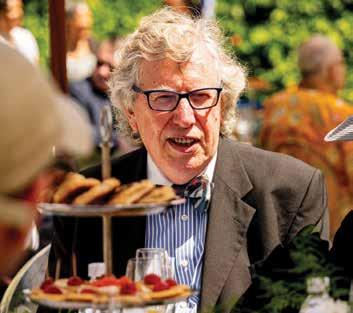
His trademark bowties and calligraphic handwriting are in itself a legacy and his signature on degree certificates on walls in offices and homes across the world link a community of alumni from the many years he was registrar. Despite retiring from UCT eight years ago, Hugh has remained active in higher education policy work as well as being president of the Legacy Society.
Alumni News (AN) interviewed Hugh (HA) about his involvement with UCT and the Legacy Society:
AN: What is the Legacy Society and why is it important?
HA: The Legacy Society was started by Stuart Saunders and carried on by Francis Wilson with a view to encouraging people to give back to and think about providing for UCT in their wills. One’s UCT experience would not have been possible were it not for the generosity of others
who gave money to UCT in the past. What happens to your material wealth when you die? We encourage you to think of UCT as part of that family that you leave a legacy for.
AN: Why does Hugh give back to UCT with time and money?
HA: I had a great time studying at UCT and have had a fantastic career here. I believe in UCT – it is a truly worthwhile institution that is worth working for.
UCT alumni and staff impact and influence on the world
Evidence of UCT’s far-reaching impact and influence across the globe, is reflected in many ways; take one example. In the last five years, four UCT staff or alumni Felows of the Royal Society. Being elected FRS is a tremendous accolade. As interesting is the work for which each of these alumni has been recognised: global concerns of medicine, engineering, science and climate change. Valerie Mizrahi’s work and research on the physiology and metabolism of tuberculosis and drug discovery and drug resistance has huge implications for the medical world. William Bond’s work on grassland and forestation is critical for climate change understanding Michael Thackeray made a significant contribution to battery science, putting lithium into batteries. Jonathan Knight’s research on photonics and photonic materials has made an exceptional contribution to fiber design and fiber optics, with diverse applications from healthcare to atomic physics.
A quite different example is UCT Opera’s impact on world opera. The world premier of the recently discovered Donizetti opera is taking place this month – not in Milan or Vienna, but at UCT!
Philanthropic and influential donors in the early years
Hugh, being the wellspring of institutional knowledge and history that he is, highlighted stories of a few invaluable donors in the early years.
HA: Mrs Jamison, was the first significant donor in the nineteenth century and gave money to build what is now the Little Theatre as the Chemistry Laboratory, as well as giving money to endow a chair in inorganic chemistry. Many sporty alumni will recognize that at the annual Sportsperson of the Year awards, the winner receives the Jamison Cup, which Mrs Jamison donated in the 1890s .
Mrs Jamison was important in UCT’s history, first because she was a significant donor and secondly because of her friendship with PD Hahn, whom she persuaded to propose the admission of women to study at UCT in 1878. Women were then allowed, as an experiment, to be enrolled for Botany and Chemistry. Another donor family – The Fuller’s –also made significant contributions to UCT. Mrs Fuller was one of the first class of women students allowed onto UCT campus on an experimental basis and was of the first women graduates. In 1918 when the South African College became UCT, the Council included five people
appointed by the Governor General Viscount Buxton. Buxton was given a list of names but said he wanted women on the council and wouldn’t only appoint men. Mrs Fuller was one of two women appointed to the council. In the 1920s Mrs Fuller persuaded the council to do two things which were ahead of their time
in the world: the first was to abolish the rule that women academics (who there weren’t many of) had to resign when they became pregnant; and the second was to ensure that women academics were paid the same as their male counterparts. AN: Encouragement to alum to give back and be involved with UCT?
HA: UCT is an important institution that has a significant impact on society and our world. It is at risk and needs support. I believe that alumni have an obligation to support it. We need to create a culture of philanthropy in South Africa and encourage all alumni to give back.
Dr Zena Potash, an adolescent psychiatrist and Dr Cyrus Mancherje, an interventional cardiology specialist share their journey from being medical students to generous benefactors funding medical students at UCT.
Zena and Cyrus started at UCT medical school in 1972. Cyrus initially got into medical school at Stellenbosch and was not happy but was finally accepted by UCT and was very delighted to be studying there. The couple met during their first year at UCT, outside the Physics laboratory. Cyrus comments, “I went up to Zena to talk to her as she had long wavy hair and was dressed in a purple leather pant suit from Carnaby street in London and looked different from and more attractive than all the other women medical students”. Zena’s take on meeting was, “Cyrus was one of the most handsome men I had ever seen, with a resemblance to Cat Stevens. He was definitely one of the most handsome in the medical school class. He was tall, dark and handsome with the most beautiful eyes and gentle manner and a contagious laugh”. For both of them, it was love at first sight…
Once they had started dating, they discovered that their families knew each other from a very long way back and that in fact their grandfathers had been neighbours in District Six.
On completing their medical degrees, Zena and Cyrus moved to the UK to do their internships and got married there. Cyrus highlights how the grounding and clinical training he received at UCT medical school was outstanding and equipped them with the capacity to work hard. In England while working as a locum, other professionals often said to him, ‘Wow you know how to do this?’ and commented on his capacity to do such a range of different things. He says his training at UCT really put him in good standing in the UK and USA. Zena echoed this,
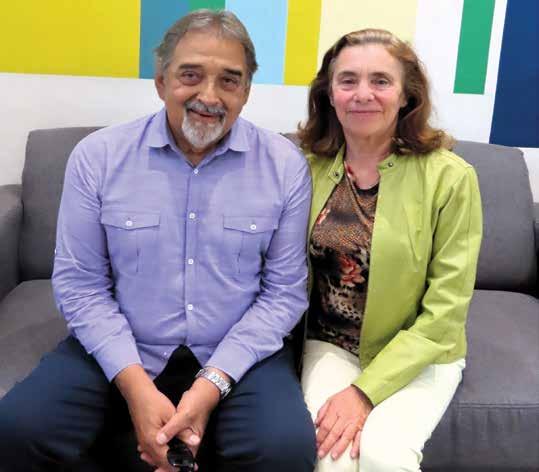
Dr Zena Potash, an adolescent psychiatrist and Dr Cyrus Mancherje, an interventional cardiology specialist, (pictured above) who are based in California, took time out of their busy holiday schedule in Cape Town, to share the story of their beginnings at UCT as medical students, to highly regarded medical professionals and generous benefactors who are making a significant difference in the lives of UCT medical students, who they are funding.
commenting that their clinical training at UCT medical school equipped then with the capacity to work hard and gave then a solid grounding. They decided the UK wasn’t going to be their future, so from there they moved to the USA and completed their specialization training in Boston. Thereafter they moved to the bay area in San Francisco in California, to be in an environment that reminded them of living in Cape Town.
Both Zena and Cyrus work part time in California, with retirement clearly a long way off. Zena works as an adolescent psychiatrist and is also very involved in the field of advocacy. She was president of the Northern Californian Psychiatric Association and is currently on the state psychiatric lobbying committee, working to improve mental health care for homeless people, many of whom were denied care when mental institutions were shut down. She is hoping her advocacy work will have impact on social situations in California.
Zena describes Cyrus as being a very logical person with excellent innate executive, organizational skills, a strong work ethic and capacity to work hard. He is very involved in his profession of interventional cardiology and is currently following 4000 of his cardiac patients. In the area where Cyrus was working, there was no full-service cardiovascular programme, so he started one up a decade ago and is very proud of the cardiovascular programme he set up, which includes surgery and acute myocardial treatment. He attributes much of his success to the excellent grounding he received at UCT, the strong clinical training and the logical and strong approach to facing clinical challenges.
Why do Zena and Cyrus donate to UCT?
“We come from privilege, we had a great education and want to share what we have. We both came from families that value giving back.” says Cyrus. Zena comments, “Both of our families have a tradition of doing that…we want to give back to the local community specifically the Cape Flats. It was inculcated in us from a young age that education was crucial. That is why we give back. We want to spread the opportunity for youngsters who don’t have the families and resources behind them. It takes eighteen years of opportunity, resources, education, values and building in order to be able to apply yourself at university. Medical school is gruelling both academically and emotionally”. Describing the circumstances in which her parents were raised, Zena comments, “my parents grew up in abject poverty and when they were able to develop resources, they always gave back. We were reared with the values that this is what you do when there is need around you. You can’t live in a world where there is extreme inequality and ignore how you can affect change that will impact everybody’s quality of life”. This attitude and approach to philanthropy learned from their parents clearly
provides a powerful impetus to be attuned to the needs of others around them and to share their wealth and privilege generously. Cyrus reiterates, “it is important to give back, to help people with the academic process and with resources. To assist students who academically and mentally have the capacity but don’t have the financial resources. We picked the in-between students who had academic potential but didn’t get scholarships and could possibly not make it through medical school because of the financial burden. It is extremely gratifying to see these students blossoming and succeeding”.
Surrogate parenting: Seeing students develop and blossom
Cyrus and Zena say it has been really fulfilling to see how the three medical students they have sponsored have blossomed and developed during the time they have been funding them. Zena describes, “When we first met them in 2021, the students were tentative, young and naïve. Last year when we met up with them, they were becoming confident and competent adults. It was amazing and fulfilling for us to see – almost as though we were surrogate parents! Being part of that growth is a wonderful reward for us. It inspires us to encourage our children to give back to others.
They started donating and giving back to UCT when Stuart Saunders, who was their lecturer, was the Vice-Chancellor. Then when Mamphela Ramphele was Vice-Chancellor, they continued to sponsor students. In the last few years, they have increased their giving and have been covering the full expenses of three students completing their medical degree at UCT. Going forward they are planning to make this an annual scholarship.
Cyrus and Zena explained how it is easier for them to give back now because they have finished putting their own three children through university. Their university fees in the USA were exorbitant, and now that that is behind them, they are in a better position of financial liquidity to give back to others. When they studied at UCT, the cost of medical school was R800 a year and now it is approximately R103 000 – which is a huge stretch for most families under the current financial crisis in South Africa. And this in a country that really needs more medical students.
Zena and Cyrus are highly invested in giving back and seeing UCT as an institution succeed, despite some of the many recent challenges it has faced. Zena explains how important it is for a university institution to feel like it is holding its students – to be a safe place for adolescents, who are vulnerable. They shared how they want to help UCT maintain its standing and reputation, which catapulted them successfully in their own careers. “We are disappointed at some people pulling back from UCT because of the recent challenges. We think a better way to deal with that is to encourage support and good leadership”, said Cyrus.
Internationally renowned wine entrepreneur and philanthropist, Bruce Jack, is using music to make a positive difference in children’s lives in the Overberg region of the Western Cape where he is based. His philanthropy also extends into the Cape Peninsula where he supports the False Bay Women’s Rugby Club. Both these endeavours illustrate how music and sport can profoundly influence the nation building process.

Jack initially studied for a BA at the University of Cape Town. He majored in English and Politics in 1992 and he went on to St Andrews University in Scotland where he was awarded a Masters in Literature in 1994.
Reflecting back on his undergraduate studies at UCT he fondly recalls the late Professor Stephen Watson acting as his most important mentor. He says Prof Watson did more than teach students how to write: “He taught us how to look at our country.
In his empathetic, quietly patient, softly honest way, he showed us our reflection in the drug-dulled eyes of children begging at traffic lights, just as clearly as we found ourselves in a Table Mountain stream.”
“Watson’s own struggle to piece together the puzzle of truth, distrust, beauty, baseness and longing was a shared and painful undertaking. For me it meant learning that it was okay to be as uncomfortable as I was passionate, and that I was not special in this regard – these apparently dichotomous forces anchor many a South African life.”
Early on in Jack’s undergraduate years he asked Prof Watson why he wrote. “We were sitting around a crackling fire late at night, high in the Cedarberg Mountains, eating olives and drinking red wine. I had gone to find him to talk about what I should do with my life, because I thought I was going to be a writer.
“’I write because I have to,’ he said, ‘You write because you want to.’ He didn’t mean it unkindly observes Jack, but it stung the young varsity student. “It was true, and it was the best insight I could have been given at the time.”
“There is always an upside to the pain that hard truths inflict on your ego. For me, I was freed from all sorts of expectations, including my own self-delusional ones. Thankfully it only took a few more years before I discovered what I had to do!” he exclaims.
A degree from Roseworthy
After completing his MLitt he worked for a UK wine importer in London and this was when the winemaking bug bit him. At last Jack had discovered what he had to do with his life and having decided to embark on winemaking as a career he enrolled for a postgraduate degree in Oenology and Viticulture at the renowned Roseworthy Agricultural College at the University of Adelaide. When he graduated in 1996 he became the first South
African to be awarded this degree from Roseworthy.
Fast forward three decades, Jack is now an established winemaker with numerous international award-winning wines under his belt.
Explaining a career choice of winemaking is a bit like telling people you are spiritually fulfilled and emotionally rewarded by being a diesel mechanic, Jack laughs wryly. “Only a few would understand. Let’s be practical… ‘winery’ is just another word for ‘factory’. Despite what wine consumer magazines portray, there is absolutely nothing enticing about working in wineries. They are dark, cold, wet, loud and dangerous places in which to find your calling. But wineries are my happy places and they have provided me with a very rewarding life.
His considerable success in the wine industry has been matched by his philanthropic work in helping poor and marginalised communities in the Western Cape.
In 2019, following in the footsteps of his mother, the late Elspeth Jack, the much-loved and respected music professor who taught at UCT’s South African College of Music, he established the HeadStart Music Trust. “Its goal is to unearth rare talent and mentor learners to stardom, or at least into tertiary studies,” Jack explains.
Elspeth moved to the Napier district from Cape Town some 20 years ago and began her mission of using music to stimulate social upliftment in the local community. This had a profound influence on her son. Initially her work involved teaching local children how to play the guitar, but this has now evolved into a fully-fledged music programme with its own dedicated curriculum, teachers and classrooms at multiple schools.
Jack’s involvement in music as an elixir not only stems from his mother’s example, he follows on from a tradition originally set by maternal grandmother, Elsie Fraser-Munn OBE. Fraser-Munn also taught for many years at the South African College of Music (SACM). She would stage annual musicals that involved the children of SACM’s professional, administrative and service staff, so channeling music’s magic to new generations.
“The HeadStart Trust’s philosophical foundation is about trying to stitch together a deep psychological wound.” Jack goes on to say this is an ambitious goal to aim for in any community, but because of South Africa’s unique past it is a particularly challenging one. “Many of our nation’s problems stem from relatively recent psychological trauma, some predate colonialism, it is true, but all are exacerbated by slavery, many colonial structures and of course, apartheid. During those processes, positive personal and family mythologies were systematically eroded, broken and sometimes destroyed. In their place a void is left – one too easily filled with negative mythologies like gangsterism, addiction and the subsequent spiraling social disintegration. It’s not a quick turnaround,” reflects Jack.
Jack believes that one way to heal from trauma is to replace the negative mythologies, or even the ‘void of self’, with positive mythologies. “To have half a chance of that you need to build
what I call positive mythology factories,” he says.
Nurturing positive mythologies
He cites church communities and mosques as examples of positive mythology factories in South Africa – basically religious belief structures that stand in for civil society structures in many South African rural communities.
“In these historically disenfranchised, and currently marginalised rural communities a stark choice is offered to the youth - the church/mosque or the gangs/drugs, a job or crime, and either hope or self-destruction.”
“It is clear cut – you either believe in a positive mythology or a negative one. Whatever way you go, everyone needs a mythology to cling to, to live by, to feel whole. This is demanded by our cognitive selves to make sense of our existence, no matter how denuded by circumstance.”
Jack observes that the education system has failed to provide young people with a firm foundation on which to build their self-esteem. Many children also lack the self-discipline required to excel as musicians. “We must first try to rebuild a sense of self. This, at times, is an overwhelming undertaking. Our staff are music teachers, not therapists, and all we can do is create a safe space in which children can be heard, belong and express themselves.”
Once the children feel supported, maintains Jack, their imagination and empathy can be stimulated. “From there opportunities can blossom naturally and hope returns. Then music flows.”
“Through music lessons we not only stimulate imagination, but teach listening skills, collaboration skills, eye-hand coordination and teamwork – self-confidence then grows. Depressingly, these are simple things most young, rural and impoverished kids would otherwise never be exposed to. It is staggering and humbling to watch them grow. The sense of self, inner peace and accomplishment reflected in their eyes and through the broadest smiles is extraordinarily to witness. I blame it on my Celtic blood, but I inevitably end up in tears witnessing the transformation.”
In 2020 more music staff were hired and more instruments acquired and the Trust was able to increase the number of learners receiving music tuition from 36 to 130.
The results of the music programme mirror international research findings which include significant improvements in mathematics and literacy skills. Perhaps the most telling is that on music days absenteeism plummets from an average of 20% to under 2%. Along with soaring school attendance rates there have also been corresponding improvements in general behaviour.
“These children are hungry for hope and they find a semblance of that nourishment in the music lessons. It’s so powerful and so humbling. It is simultaneously overwhelming and rewarding. And while it has benefited many children, over many years, it has also changed the lives of all of us who have been involved.”
“Our vision is still to build a standalone, self-funding
music academy in the Overberg, but we have decided to step back and plan something a bit more expansive and sustainable. We are busy raising the funds to do so, and I welcome any individual or organisation to reach out if they feel they can help.”
Women’s rugby weaves social fabric
Another obvious positive mythology factory in South Africa is sport and Jack supports the dynamic False Bay Women’s Rugby Club. “One Springbok, one Olympic medal, uplifts an entire neighbourhood – everyone walks taller and feels more positive about themselves in the reflected glory of talent and hard work. If you don’t believe this, you don’t know marginalised South Africa,” he says.
For Jack, funding the rugby club is all about supporting social fabric. Sports clubs are part of the social fabric of many South African communities. “You need social fabric to weave social cohesion, resilience and sustainability around that positive foundation. Civic structures and civil society, not government, nor big business, are the most powerful and useful agents we have to protect ourselves against the darkness of government abuse and
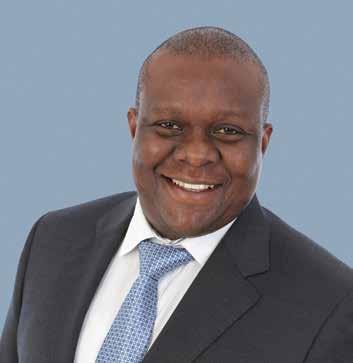
Meet Thabo Ntseare, a Chartered Accountant and UCT alumnus with a B.Com and PG Diploma in Accounting, who is CEO of Uhambo Reit. He is an avid ambassador for UCT, who really enjoyed his time studying at UCT and is generously giving back to ensure that deserving students are afforded the opportunity of studying at his alma mater.
Journey to UCT
Thabo grew up in the East Rand in Springs and went to school at CBC in Springs. For
the chaos sown by selfishness.
Women’s rugby held an additional attraction for Jack. “Because it is relatively new in SA, it is somewhat anti-establishment still and is even more representative of the wider community.
“In some ways the woman’s rugby club feels more like a family than the male teams, which are by necessity more exclusive, hierarchical and professional, while the women’s teams still demonstrate an uplifting sense of belonging as the driving force. That will change as the game develops, but, for a while still, it allows disparate individuals from wildly different backgrounds and abilities to knit strong bonds and create community strength.
Jack is proud of the advances made by the club but he believes these advances would have happened without his support. “The club has its own energy, resilience and momentum that has been nurtured and built up for decades by giants of civil society like the late Louis de Waal. It’s a great club with a very proactive Chairman in Kevin Lennett, and we are privileged to be involved as a supporter,” he says.
UCT alumnus Thabo Ntseare’s generosity transforms the lives of students in need at his alma mater.
his last two years of high school, he went to boarding school at Queens College. Being at boarding school eased the transition for him of moving all the way to Cape Town to study at UCT. He stayed in Leo Marquard residence and made great friends there – many of whom he still sees on a regular basis. He had two or three friends from his home town, who he had grown up with, who were at UCT, which is why it was a natural progression for him to choose to study there. Thabo describes how he felt at home at UCT and enjoyed the experience of being with people from
many different backgrounds.
Highlights of his time at UCT
Thabo made the most of every opportunity as a student, playing tennis and joining SHAWCO and teaching accounting to high school students on Saturdays. What shocked him was that when he asked one of the learners what they had covered the week before in school, the learner said that their teacher had not been there because he was studying at another university. He realized that his input was the only teaching
these learners would be receiving.
“Being at UCT was an amazing and interesting experience, being with like-minded people and meeting different personalities from such varied backgrounds. I went to the graduation of one of my friends and only discovered then that the first time this friend had seen a flushing toilet, was when he came to UCT. Ninety percent of my close friends are friendships I made at UCT. We were best men at each other’s weddings and see each other two to three times a month”, he said.
Forging a career after leaving UCT
After the successful completion of his degree and being placed on the Dean’s merit list, Thabo did his articles at Ernst & Young, followed by time at Rand Merchant Bank. He then felt drawn to going into property and building up his own business. This was capital intensive, so he partnered with an ex-client from RMB to build a property business and was instrumental in raising money for the business, and he was thankful for his time in the bank which had prepared him for this and speaking the language of the banks. He thoroughly enjoys what he does: the corporate focus, working with a large team and bringing in experts to assist with best practice and systems. No doubt very inspiring and encouraging to see his own vision brought to life and thriving as a business.
Disparities that moved Thabo to consider those less privileged
When asked what propelled Thabo to donate to UCT, he describes how the
disparities between students who have and those who don’t was made clear to him in a powerful way. He was walking past Student Affairs one day and he saw a long line of students queuing up for financial assistance and this really moved him. He could see and feel the desperation in their faces. In his mind, these were students just like him – who had got 6 A’s for their matric, had worked hard and done well to be accepted into UCT. Through no fault of their own, the didn’t have access to financial resources to afford their education and living expenses. Thabo says that to this day, that picture remains in his mind and is a motivator to support deserving students in need.
Why does Thabo give back to UCT?
Thabo was reading the list of donors at the back of a graduation booklet and realized that he didn’t see a single black donor’s name. This propelled him to become a donor and he gave R500, because that was all he could afford at the time. When he received a thank you letter from the alumni office for his donation, he was completely amazed and this had a lasting impression on him. He shared how being invited to a donor recognition event, where he was sitting next to big donors surprised him. That his contribution would be valued as much as that of a megafigure donation was illuminating to him.
From this point on, whenever he could, Thabo gradually gave more money to UCT because he wanted to change the experience for current generations of students who didn’t have the resources he had and deserve an opportunity to have access to fulfilling their potential and
achieving their goals and dreams. The stories of how funding has impacted and changed the lives of the students who are the beneficiaries of donor funding always inspire Thabo. He says that many people are worried about their own lives, educating their own children and providing for them and their families. However, he encourages others to make a contribution wherever possible. Thabo tells the story of a good friend of his who did not have calculators at his school when he was growing up – and now he donates calculators to the schools so that the learners can have access to this basic necessity for mathematics success. This initiative, like Thabo’s own contributions, pave the way for others to reach beyond the obstacles that limit their progression. What does Thabo do in his spare time? While he enjoyed playing sport and running, at the moment Thabo spends most of his time taking his children to their sports games and matches. He has three young children who keep him busy and running around. He used to run marathons and half marathons and hopes to find time to get back to that sometime! When asked where he will send his children to study one day - given that he lives in Johannesburg and that his wife is a WITS alumnus - he comments, “UCT without a shadow of a doubt”! UCT clearly runs blue in his veins!
Meet Noel McIntosh, UCT student graduate from the 60’s who is still giving back to UCT students, from across the oceans in Australia. In his eighties, Noel is still actively involved in giving time and funds to support students and the work of UCT.

Noel, whose 1930’s Depression era parents couldn’t afford to send him to university, was awarded a 4-year bursary to study engineering at UCT in 1960. This critical financial support for his studies, significantly impacted his life and launched a successful career and fulfilling life, as well as
motivating him to give back to others. Here he tells the story of his student years at UCT, his successful career and why he gives back to UCT financially and by serving on the Australian board.
Student years at UCT:

Student life was exciting in many ways, but it was also the time of social upheaval and strict suppression of academic freedom in South Africa. The Sharpeville massacre occurred in my first year. Some friends were jailed for demolishing power lines. We were involved in protests on De Waal Drive, police action at Hiddingh Campus, support for the USA in the Cuban Nuclear Crisis and the birth of the Republic. Having been brought up by Bechuanaland parents who didn’t believe in racial separation, I was a student activist - it was natural for me to be involved in the fight against injustice and I found myself in trouble with the authorities.
SHAWCO was central to student enjoyment and responsibility and I was involved in RAG procession of floats, which we built on big trucks and then paraded through town to raise money. This was followed by RAG Ball. My memories of the importance of SHAWCO in providing for the underprivileged motivated me to support the indomitable Professor Jackie Stewart when she asked for help to lift SHAWCO out of its darkest financial time in the late 2010’s.
I’m driven to help young people achieve and enjoy a similar life to mine, which all started at UCT. The bursary I received
lifted me above the financial constraints of my parents and gave me exciting choices and a successful career.
Highlights of Noel’s Career:
Although I studied Mechanical Engineering, I have been in the computer software business my whole life.
In 1965, I was selected by IBM’s new computer division to be trained as a business system engineer. Then two years later I joined Univac in Operations Research for 2 exciting years of our married life in London. After that an IBM colleague and I, started our own computer services company when I was 28 years old. This business grew into a computer service bureau doing payroll and insurance administration. We sold the company into a South African IPO float in 1987.
Move to Australia and developing new business ideas
In 1978, I took my young family and the insurance administration program we had developed, to Australia and settled there. The business didn’t work as we had misjudged the Australian factors which are different - the story of many migrants! After closing the business (fortunately without any debts), I invested in a Solomon Island resort which ended up as a dinner party joke.
At the start of the Personal Computer age, in 1982, I foresaw the need for touch-typing skills across all professions and occupations. It could be taught by the very keyboard itself, if a smart, engaging teaching program was available. I studied the two historical teaching methods – books and class guidance. The latest research using expensive mainframe computers revealed exciting interactive methods to teach this automatic movement skill in a fraction of the old time.
My Typequick Keyboard PC training course was developed over two years and reduced the learning time to one third. It grew into an exciting international business in eleven countries, in five languages. It is still the most widely used course in the history of Australian vocational training. As of 2024 it has trained over 6 million people around the world, including at UCT. Our Japanese language version had a 70% market share. Finally, in 2001, we sold the Typequick business to an Australian company wishing to list an IPO to take advantage of the dotcom boom.
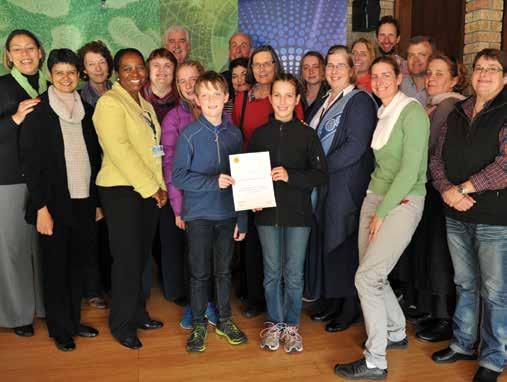

Family is really important to me. I met my wife, Donna, while we were working at IBM. She has been my life partner, my business partner and mother to our four very active children. She completed a BSc in computer science after landing in Australia, as she believed she needed to set a good example to our children. She was the technical director of our TYPEQUICK business for 17 years, managing a team of highly capable programmers.
Philanthropic Heartbeat
Marjorie McIntosh Midwifery Foundation
Noel’s family set up the Marjorie McIntosh Midwifery Foundation to train eight midwives at UCT every year. His family has travelled to South Africa to attend their graduation ceremonies wherever they can. He describes how in 2018 he tearfully listened to a daughter who had seen her mother study midwifery while her father cooked meat on corrugated iron in the township. And that girl had just matriculated and is going to study medicine.
In 2022 Noel committed to financing SHAWCO’S Mums & Bubs clinics for five years
Noel discusses the urgent need for student funding
What is on the mind of the student walking up to varsity today? Hopefully they are thinking about their studies and assignments and not about how student fees will be paid or buying food for the next week. If financial support is needed, hopefully they get it and it will continue for future years, as there can be nothing more crushing than to learn that donations have stopped because of troubles overseas.
This image encourages me every time a donor questions the wisdom of a donation and is concerned about corruption in South Africa. At UCT the money does get to supporting a deserving person, not a university. I encourage donors to think back to the advantages they received when they were at UCT. I can easily imagine the student’s joy and relief when they hear that they are being funded.
Highlights of car adventures - a significant part of life
Noel is a vintage car enthusiast who has embarked on some extraordinary trips across the globe in his vintage cars… Noel and his son William travelled half-way around the world in an 83-yearold 1913 Vauxhall car. After a farewell picnic at Westminster Abbey in London, they drove their painstakingly restored Vauxhall through Siberia to Vladivostok and then on to Tokyo, camping along the way. The same car was driven by Noel across the USA when he was promoting TYPEQUICK for the Blind.
Another adventure entailed driving my 1933 Rolls Royce 5000km around Japan promoting our Japanese keyboard course to our 350 university and college clients.
Paying in Forward
I’m driven to help young people achieve their dreams. My bursary lifted me above the difficult life of my parents, gave me exciting choices and a successful career.
Like many RSA migrants, we have taken our large family (of 22) back to see our South African heritage. They are fascinated by the young people and the lives they live. Their memories of animals and the beauty of Cape Town remind them of the children they met and played football and often wonder if they are also going to school and university. Now they want to help and ask if I can include them in our family’s estate plans.
Many of my generation followed a similar path to their successful achievements in Australia. For them it feels good to be reaching back to make a difference in the lives of South African youth of today. A small part of each donor’s estate, when multiplied by the exchange rate of 10, enables a student to complete a year’s study or a whole degree.
Your reputation and mine depends on the reputation of our university. We need to keep UCT’s reputation high, so that we have credibility.
Last words of encouragement to students: Keep your goal in your mind and you will find a path to achieving it.
Noel certainly is someone who has boldly pursued his own path, with an adventurous spirit and a desire to improve the lives of other, making his mark on the world around him and changing lives.
Not one to be idle, I am now active in many projects and innovations outside of paid employment. Some of the many initiatives and activities I am involved in are listed below:
• Director and Trustee of UCT Australian Trust 2019 - 2024
• Pinchgut Opera Ambassador for a new Sydney opera company and supporter for past 15 years.
• Served on Scouting and Car club committees.
• I am an inventor who sometimes sees opportunities to help and solve problems. I founded and ran “Tools 4 Tsunami”, an Australia wide project which collected 4 containers of hand tools for the 2005 survivors in Indonesia, Maldives, Sri Lanka and Malaysia.
As the sun sets today in sunny Sydney, I reflect on my exciting life and the fabulous contribution my four children are making to society. This journey all started with a bursary to study at UCT.
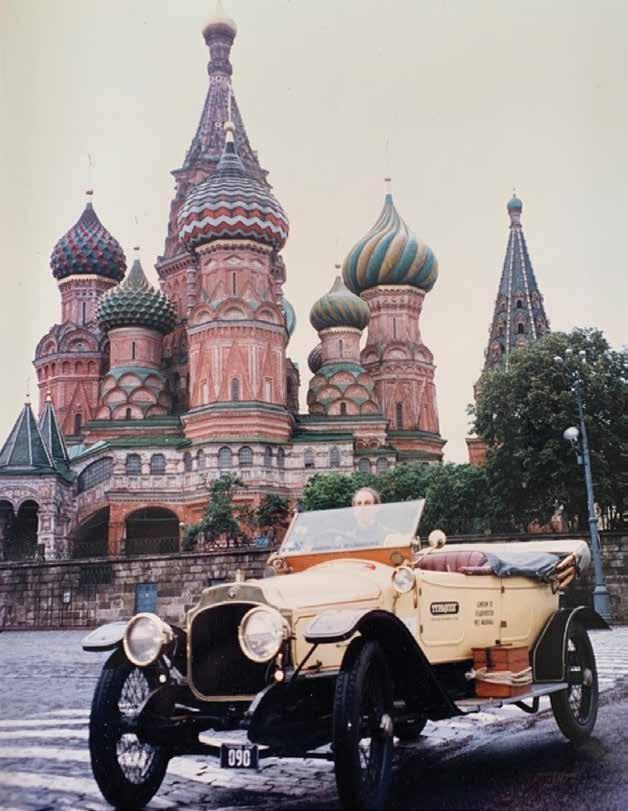

Neville, a UCT alumnus, previous CEO and Chairman of Coca-Cola, Chair Emeritus and generous donor to UCT rugby, the Neville Isdell Chair in African-centric Drug Discovery and Development and the Upper Campus Residence (formerly known as Smuts Hall) Neville Isdell leadership camp, met with Alumni News (AN) to share about his fascinating journey through life, why he is still working at the age of 81 and why he donates to UCT.
Neville was born in Ireland and when he was ten years old, his family moved to Northern Rhodesia (now Zambia) where his father went to run the fingerprinting and ballistics department for the Northern Rhodesia police. They arrived in Cape Town from Ireland, by boat, in 1954 and Neville was entranced seeing Table Mountain rising from the sea. The family spent four days in Cape Town before setting off on the three-and-a-half-day train journey to Lusaka. Neville describes his first experience of UCT, “I saw this building up on the side of the hill with red roofs and I asked my parents what that was and they told me it was the university of Cape Town. At ten years old I said, ‘Well, I am going to go to university there’.”
His father wanted him to go to an Irish rugby university, such as Trinity College in Dublin and my mother wanted me to go to University College in Harare so that she could have her son near home. However, Neville made my own choice and headed to UCT for his studies.
Life, learning and leadership at UCT
He chose to do Social Science at UCT. “My approach to people came from my father and I watched as he created the first fully Zambian department. Coming to apartheid South Africa from Zambia, I was aware of the inequality and quickly signed up for the National Union of South African Students (NUSAS) and was on the Student Representative Council (SRC) on an anti-apartheid ticket. My life soon became all about people, politics and social science. I was on the house
committee of Smuts residence, (and brought sheep into the quad of Smuts as a prank!) played first team rugby, edited Varsity newspaper, played first team basketball and had a really good social life at UCT. My degree taught me a great deal”, commented Neville.
He undertook case work in the townships and because only ten percent of the class was male, they got the tough cases to work with: children with burns, Friday night fights, etc. He also volunteered for the Cape Flats Development (CAFDA), which taught him that whilst you can tell people what to do, it often doesn’t work. Neville explains, “What you need to do, is to dig and find out what drives their thinking. This is the only way you will get any long-term change of attitude, where people no longer repeat the previous mistakes they have made. I spent an entire year there, qualifying as a social worker. My registration still hangs in my office”.
Developing management skills early on “My social work taught me one of the most basic skills of management – namely, start by understanding where people are coming from. That is a great skill in terms a skill transferable across many spheres. Courage, conviction and respect are all pivotal to leadership”, said Neville.
Experience of leadership – the people factor
He commented, “I am not a good status quo manager – I like challenges. If I look through my career, I have taken over

a number of poorly operating situations and turnarounds. At the end of the day, it is all about people. Three or four times in my career I was not the first choice for positions, other people were offered the job but because it was too difficult or too dysfunctional, they said no. That is where opportunity to bring about change lies.
When I was sent to the Philippines and took on that challenge, three people had turned down the job before me. In four years, I turned around the business where Pepsi was outselling Coke two to one and left for a new challenge with the ratio reversed. This turnaround made my career in Coca-Cola”.
Developing entrepreneurial skills
Neville had an entrepreneurial heart from a young age. When he was about six or seven years old, in Zambia, he would raid the family cupboards for canned goods and vegetables and play shop. He also grew mielies and worked with their gardener to take them into workplaces to sell them, splitting the money with the gardener.
Neville joined the Coca-Cola Company in 1966 with the local bottling company in Zambia. He went on to become general manager of Coca-Cola Bottling in Johannesburg, the largest Coca-Cola bottler in Africa. His meteoric path took him across the globe, working and living in eleven countries and five continents from Africa to Australia, the Philippines, Germany, India, Soviet Union, UK and USA.
Highs and Lows of career:
I loved working with people who had good, crazy ideas. In the Philippines we created the Tiger force and dressed in tiger gear and hyped up the sales team with the music ‘The Eye of the Tiger’. There was an element of fun, creativity and playfulness at work to counter the stressful day-to-day challenges.
Neville’s focus, clearly enhanced by his social work training, is the capacity for understanding other people. He shares, “how do you reach into the heart of people and inspire and motivate them? Take people with you. I get more out of engagement with others and creating excitement and fun than just plodding along.”
“There were not too many lows of my career. I worked for a few people I didn’t care for, but generally Coca-Cola is a great company to work for. It is all about people and communication as highlighted in the messaging of ‘Coke adds life’ or ‘It is the real thing’. The brand was first established in1886 and no brand has flourished as long as Coca-Cola, which is a result of the ethos within company, which has endured over time. It has had a few wobbles at times, such as when I was called back out of retirement to turn things around” explained Neville.
The serial failed retiree
He says, “I had just retired and was enjoying a relaxed retirement when I was asked to come back to Coca-Cola as CEO and Chairman in 2004. My wife Pamela calls me a serial failed retiree! After much discussion with Pamela, we made the decision that I would come out of retirement to take on the challenge. The job meant extensive travelling around world, being in meetings you never thought you would be part of, meeting presidents and prime ministers and representing the company across the globe”.
Involvement in environmental issues and conservation
About his career in conservation, Neille shares, “When I went back into Coke as CEO and Chairman, we had major issues about the use of water in India. People in the area said we were extracting all the water and depleting the aquifer, so we closed the plant and the aquifer went down at the same rate. The perception remained. Water is the largest ingredient in Coca Cola and so we needed to worry about our key ingredient. While exploring that, I linked up with WWF and Carter Roberts (President and CEO of WWF) who is still running WWF and is a good friend. My knowledge of the environment and climate change grew exponentially and when I retired the second time, Carter asked me to join the board of WWF. So now I have moved from one side of the argument to another. I was then asked to be chairperson on WWF, which was a great honour. I am also on the Peace Parks Board which creates transfrontier parks as an ecosystem, recognizing that when colonials came to Africa, they took out a map and drew straight line borders, which nobody told the animals about!!
“Where once I was a businessman, I am now in my private investments concerned about the environment and the planet.”
In November 2024 Neville and Pamela received the WWF Living Planet Award, which is awarded annually to exceptional people who, through their catalytic contribution, inspire people to live in harmony with nature. Congratulations to them for their commitment to these important causes in caring for our planet.
Irish Roots – Museum project in Dublin:
“During my retirement, the Irish Tiger died and the banks crashed. The Irish government took over many of the assets and had them up for sale on blind auctions. I thought this was a very good time to invest in property in Ireland, which I did. I purchased a 200-year-old listed building of old vaults. At this time, as I was getting back into Ireland and proud of being Irish, I discovered that when people ask where you are from, without even noticing I would shift accents. People couldn’t pin where I was from. I started asking myself what there is about being Irish that is different from any other nationality? Then I started discovering interesting things such as the fact that Che Guevarra’s father was Irish, that the first president of Chile was an Irishman and that twenty-one US presidents had Irish ancestry. The biggest export from Ireland is its people. The history of Ireland contained much sadness. It was colonized, experienced famine and civil war. However, nobody had been telling the story of the success of the Irish diaspora. Then when I bought the building, I asked myself how I could link these two together. I did some research, hired seven academics in Ireland to give me some direction in terms of history and we set in motion a project to tell that story in a museum. In 2016, we opened the museum, which is an interactive experience, using the latest technology. Covid impacted the museum initially, but last year we had 356, 000 people visit the museum – nearly 1000 people a day! We are the go-to place for the ministry of foreign affairs, who bring VIP’s through to hear the Irish story and I have escorted other dignitaries such as Harry and Megan through the museum” explains Neville.
Homes across the globe
“We have a busy life living in four different places across the globe: Barbados, France, Atlanta and Cape Town, but we love all four homes and countries and their different cultural milieus which gives a richness to our life. We have a set of friends in each of these places and some are there all year round and some are swallows like us. The fact that we are only in each home for 3 months is great. Pamela and I don’t enjoy winter, so we move with the sun. My daughter and son-in-law are in the USA and we pop in and out of there to spend time with their family. I love the island of Barbados. I am currently building a small-scale Cape Town Waterfront in Barbados, the capital city. This is a big project for island and my goal is to help transform the city which is rather run down. The new project will have 174 apartments, cafes, restaurants, shops and a beachfront. The city has a rich history. My aim is to create a hub in the port and turn it into something unique to Barbados, conserving the historic nature of the site and preserving its DNA while enhancing tourism, attracting yachting and serving the cruise ships which visit during the season. There is nothing stopping me. One only needs to consider how the Cape Town harbour area was rundown until the Waterfront development, as a model for this project”, he said.
The Rugby connection Neville came from a rugby family – he had a rugby ball in his hands as far back as he can remember. He explains, “As an eight/ nine-year old, I went to matches with my father and I would be running around with some friends with a rugby ball. Neville, a talented rugby player, went on to play rugby for the duration of his studies at UCT and for Zambia. Currently, Neville is the President of UCT Rugby club and has made a sizeable contribution to keeping UCT rugby at the top of its game. This included sponsoring the team for the World University Rugby Invitational Tournament (WURIT) in Bordeaux last year, where the team won the tournament for the third time in a row in 2023.
Neville emphasises how rugby as a sport is both formative and transformative. “Rugby is the ultimate team sport to me, where you can learn life lessons. The UCT rugby team is so integrated and inclusive, as well as being a group of academically strong players. The team prides themselves on the high pass rates of the players, and we invest in tutoring to support them. When there was a movement to lower entrance levels of universities generally after apartheid, Mamphela Ramphele challenged this saying ‘I didn’t fight for liberation for a second-class education’. That has been maintained at the rugby club – we have the highest academic requirement to be part of the club. We lose people who want to play rugby for UCT but don’t meet the academic requirement” he said.
Neville comments “We manage this holistic approach of education as well as team sport. We want to turn out great men and women (We now have a women’s team at UCT) and we want them to leave as great rugby players, well adapted socially and as good human beings. That is why I stay involved – they are a great team of people. Their results speak for them: winners of the WURIT three times in a row. Credit goes to former Ikey players who give a great deal of time to running the club.
Philanthropy as a way of life: giving back more to the world than I have extracted from it.
Neville and his wife Pamela are on a variety of Boards and complement each other in their involvement with various boards, which often cross over. He comments, “We believe in investing and giving people opportunities. What I strive for is to ensure that when I eventually die, I have given back more to the world than I have extracted from it.
“Out of giving comes a full life.”
We give to a variety of different projects. The major one is to Kelly Chibale, Professor of Organic Chemistry at UCT, and his Chair in African-centric Drug Discovery and Development. I got to know Kelly through Smuts (Upper Campus Residence) where he is the warden. I was fascinated with what he was doing with regard to African medicine. Together with a partner in New York, I had also been investing in malaria eradication programmes in Zambia, Malawi and Zimbabwe. I have had malaria twice and it is terrible that we still have half a million people dying from malaria when we know how to eradicate it. Kelly’s breakthrough work has taken the African genome and is developing drugs with higher efficacy against that genome.
Retirement not on the cards
AN: Living life at such a fast pace and being involved in so many initiatives, must be exhausting. What do you do to relax?
NI: “I travel too much. I have visited 145 countries. Together with Pamela (a very important part of the puzzle) we have lived and worked in eleven countries on five continents. I get tired – but I build stamina – it is like playing rugby. To wind down we go into the bush. I have lost count of the safaris we’ve been on. Pamela is an avid birder and has influenced me to enjoy this. I have done some walking safaris, and you realise when you are out in the wild how inconsequential you are. Another great interest is horseracing in the Cape where we own a number of horses”.
AN: Do you plan to retire/ stop working at any stage?
NI: “Working is a big part of the fun of life. I don’t see myself slowing down. I am always on the lookout for new projects. I believe that longevity and your chances of living a long and productive life are highest if you keep yourself physically fit and mentally engaged. When you give up – it transfers into the body. I take on all of these things and it keeps me young at heart.
On his way from Atlanta to Cape Town to receive the WWF award, Neville went with his brother to the Sphere in Las Vegas to an Eagles concert. Neville who thoroughly enjoys music and the power of songs, is a big fan of the Eagles and the song ‘Take it to the Limit’ conveys the essence of who he is – a man of diverse talents and skills, who lives life at full throttle, gives generously, invests in people and projects and takes on challenges with alacrity.
Thanks to the generosity of contemporary artist Carolyn Gad’s family, David and Millicent Gad, a significant art prize has been bestowed on UCT’s Michaelis School of Fine Art. This legacy prize is awarded to the top studio work and top art theory student.

Who was Carolyn? Carolyn Gad graduated cum laude from Cape Peninsula University of Technology (CPUT) in 2006, in the field of textile design. She then landed a unique two-year invitational artist residency position at the Institute of Molecular and Translational Medicine in the Czech Republic. Her mandate was to bring science to the masses through art.
Her distinctively playful, whimsical art was perfectly suited to illustrating a book called Dedicated Fairytales, the proceeds of which went to cancer research in the Czech Republic.
Driven and inventive, Carolyn also illustrated the Institute director’s talks, some of which were presented globally. This astute move away from staid bar charts and diagrams, showed how the power of imagination could enhance and simplify complex scientific themes.
“Her hard work and determination to follow her dreams and seize every opportunity paid off. Carolyn’s determined and exuberant approach to both her life and work meant that her imaginative art can be found in the Czech Republic, Germany, Poland, France, Slovakia, the United Kingdom, the United States, Australia and South Africa” said her mother.
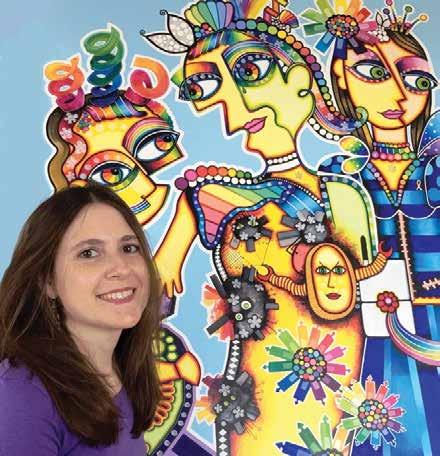
Sadly, in late July 2018, this young and fearless artist was diagnosed with an extremely rare cancer, perivascular epithelioid cell neoplasm and she passed away in December 2020 at the age of 37. She had achieved her dream of becoming an international artist and also motivated her peers to find their creative voice and preserve their imagination.
In a labour of love for her beloved daughter, Millicent Gad created a heartbreakingly beautiful mosaic on her daughter’s gravestone – a depiction of Carolyn’s favourite artwork: a rosycheeked, winged fairy with compelling eyes and fantastical hair. Above the artwork are the words: ‘A talented artist. She lived her dream’.
Her father, David, describes her terrific sense of humour which permeated her life and her artwork. He describes how when they were flying back with her from the Czech Republic after her cancer diagnosis and operation, she joked about the fact that at the airport signs said ‘Terminal’ and ‘Departure’ when this is what she was facing.
David and Millicent say she would have loved this legacy she has left and the joy this brings to others. Art inspired Carolyn and even when she was facing a grueling cancer journey, she said that her soul had chosen this path to help other people. They described Carolyn as their miracle child – who when she was given two weeks to live, lived for 16 months. Even when her health was at an all-time low, they described her positive outlook and approach to life.
Erin Grice, one of the beneficiaries of the prize:
To have been awarded the Carolyn Gad Memorial Prize was a great honour for me. It served as a reminder of the importance of authenticity, especially at this pivotal period in my life where I am finding my place as an artist. Carolyn’s testament to bravely expressing one’s unique artistic vision, has led me on a journey to understand my own. I have considered how I want to position myself in this world, and what it is I stand for. This has allowed me to better understand what I wish to contribute through my artistic practice.
I am an ecofeminist artist in search for ways to reimagine being of the world, sensitive to the vulnerabilities of a planet facing devastating impacts of climate change. I am developing my practice centered around sustainable means of creation, and am fascinated by the potential for discarded matter to take on a new life and speak to the interconnectedness of multi-species existence.
Now that I understand what my purpose as an artist is, I find myself making meaningful connections with likeminded people who also show an empathy of care for the environment in which we find ourselves. It is inspiring and
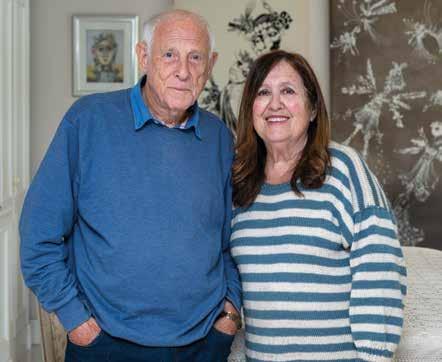
Carolyn’s mother Millicent Gad, also a trained artist who studied graphic design at Michaelis and worked in the creative world of advertising after graduating from UCT comments, “Carolyn was a very driven person, who had so many dreams for her future so we wanted to leave a legacy in her name to continue for many years, We felt the prize should be shared, to give two people an opportunity of winning the prize each year. The top student in studio work and the top student in art theory”.

motivating, what comes from taking actions aligned with your truth, and I am excited to see what the future brings. I hold my creative vision in Carolyn Gad’s courageous spirit, and I hope to make a difference in the world by sharing my story while encouraging others to share theirs.
High-powered marketing executive Mzamo Masito has recently stepped down from his position as Google Africa’s Chief Marketing Officer to dedicate more of his time and expertise to African Men Care (AMC) –an NPO he founded in 2013 to support and nurture young learners.
In order to identify learners in need, AMC partners with community ‘pillars’ including social workers, teachers, concerned parents and elders in villages and townships. Then through detailed assessments, AMC assesses learner’s barriers to self-sufficiency and helps them complete their schooling. “AMC removes barriers to education opportunities through offering holistic, quality wrap-around support,” Mzamo explained.
Mzamo describes himself as a UCT graduate ‘through and through’! He holds a BSocSci with majors in Statistics and Economics, a postgraduate diploma in marketing management and a PhD in Business Science, all from UCT. He was born in Gugulethu, Cape Town during the height of apartheid. He was supposed to be born at home with a midwife, however he was a breech baby and his mother had to be rushed to hospital. This is why his mother named him Mzamo, which directly translated means “Life is effort”. Reflecting on what has shaped his life, Mzamo highlights several factors.
Poverty causes trauma
He grew up in extreme poverty, in a shack in a community where violence, drugs and crime were constants. He maintains that poverty causes trauma. In townships the odds are stacked against one and the constant noise and poverty affects one’s cognitive bandwidth and individuals end up in constant survival mode, he said.
In Gugulethu, his family moved from shack to shack. When the riots began in the 1980s during his childhood, Mzamo’s mother sent him and his siblings to live with family in the Eastern Cape. This move came with advantages and disadvantages. Village life was a far more communal and
marked by interdependency. Here Mzamo fell in love with education and realised from an early age that education could provide a passport out of poverty. However the disadvantage was that he and his siblings were treated very badly by his hosts. After several years of complaining about being in the Eastern Cape, his mother eventually allowed Mzamo and his siblings to travel back to the Western Cape and go to school in Khayelitsha.
Gaining leadership skills
While living in Khayelitsha, his mother got married. His stepfather discovered Mzamo was selling drugs and decided to take action, taking him to join the Boy Scouts. According to Mzamo, Boy Scouts saved his life – it kept him busy and out of trouble. Scouts moulded and shaped him as he first became a junior scout master and later ended up leading a troop. These experiences helped hone his leadership and social responsibility skills.
Another element that helped shape Mzamo was religion. He served as an altar boy in the church and this participation played a vital role in his overall wellbeing. “People underestimate the role that religion plays in moulding a young person’s values. While religion often gets it wrong and isn’t perfect, it has an important place and it helped me,” he reflected.
Mzamo attended Luhlaza High School in Khayelitsha, where he completed his schooling. The family (his mother and nine siblings) lived in a one-bedroom house, sleeping on the floor and in the kitchen, surrounded by a violent, crimeridden community, filled with drug dealers and criminals. “You don’t actually see how dangerous the community is, until you leave it,” he observed.
Upon finishing his schooling, Mzamo received funding go to the USA to study conflict resolution and mediation. After returning to South Africa he worked for various NGO’s and then decided he wanted to be a teacher. He applied for a teaching diploma at the Cape Technikon and also applied to UCT, where he received a bursary through the Academic Development Programme (ADP). While he initially hated being put in the ADP’s extended degree programme he soon realised that he had had an insufficient secondary education and needed to develop his critical reasoning, inductive and deductive logic and writing skills. Fortunately, he had some incredible teachers, such as current minister Naledi Pandor and Professor Haroon Bhorat, who were caring and patient and helped nurture his talent and skills.
Another important mentor and role model was the late Professor Tim Dunne, the brilliant statistics professor. When he attended his Stats 101 class, Prof Dunne told the class that they would not be covering certain chapters in the textbook because they had already covered them at school. As his school had not covered this work, Mzamo plucked up the courage and went to speak to Prof Dunne. He told Mzamo that because of his courage in asking for help, he would teach him the foundations of maths and stats by meeting with him for an hour, twice a week, to help him catch up. In return he expected Mzamo’s full commitment – to do the work, to complete the assignments and to learn by using multiple textbooks. The sessions were soon extended to three times a week. Mzamo appreciated Prof Dunne’s commitment to such an extent that he decided he would major in statistics. For Mzamo the investment and care of Prof Dunne, Minister Naledi Pandor and Prof Bhorat illustrates what happens when someone has a calling and goes beyond the confines of just doing their job. “This is what happens when mentors genuinely see the person and their potential and go the extra mile to nurture it. Their collective impact is something I am eternally grateful for,” he said.
Another role model that has affected Mzamo’s life is his mother. “My Mom had been a domestic worker from the age of 14 till she was 38, and when I was in high school, she went to night school to complete her schooling. She then pursued a degree in Social Work at the University of the Western Cape, went onto complete her honours and qualified as a social worker, starting her professional career in her mid-forties. After completing various certificate courses, she was awarded a master’s degree at Stellenbosch. She continues to be an incredible role model to me.”
“I helped my mother to retire and bought her a house and moved my mother and sisters out of Khayelitsha into the suburbs of Cape Town. Handing over the title deeds of the house to my mother was one of the defining moments and highlights of my life,” he exclaimed.
Night school supports students
As much as the three UCT academics and his mother were role models to Mzamo, he in turn served as a role model to other

students while at UCT when he and a friend initiated a night school for students who were needing additional academic support.
“We realised that black students were failing, not because they were not smart, but because of the cultural insensitivity in the way they were taught which was more suitable for kids who went to private schools. The examples used in the classroom were very Western and white, which meant the black students were missing the cultural context in each lesson.”
The night school that Mzamo and his friend set up, made Statistics and Economics relevant to black students from townships and rural areas by giving them culturally relevant examples. UCT gave Mzamo and his friend classrooms to run their night school and the numbers attending grew exponentially. In class they would also on occasion switch from English to other languages when students were still unclear about certain concepts.
“This whole process made me realise that I’ve always wanted to be a teacher and that I have always had a passion for teaching. I love democratising opportunity and increasing transcendence for everyone,” said Mzamo.
Upon graduation Mzamo initially considered teaching, but changed his mind when he saw how poorly teachers were paid. “I wanted to buy my mom a house and move her and my sisters out of Khayelitsha where they did not feel safe with the gangsters and drugs. In order to fulfill these responsibilities
and send my sisters to Model C and private schools, I betrayed my calling and became more pragmatic by moving into the corporate world.” Mzamo worked for Unilever for more than a decade. He worked his way up the ranks to vice-president of the food business and finally becoming an executive board member.
How African Men Care was born
During the time that he was vice-president at Unilever, some friends and Mzamo went on a hiking trip. “During the hike we talked about gender equality, feminism, toxic masculinity and the stereotype that ‘all men are trash’. It was here that we realised that the majority of us had absent fathers during our childhoods and adolescence. None of us were sure what it was to be a man post-1994, so we decided to set up African Men Care.”
“I look for kids who grew up like me: poor, with absent fathers, gifted, hardworking, who happened to be black and poor. My criteria for helping was not just poverty – but children showing potential and prepared to make an effort.”
“I drew my mother into AMC to assist with the programme. She had worked at Valkenberg Psychiatric hospital and she has an in-depth understanding of mental health, psychiatry, social development and HIV and AIDS. In her work, she had worked with child-headed households and she knew the township well, so she is amply qualified to assist with managing the programme,” he said.
“We work with schools and partner with teachers and the principals – using their wisdom to select children for the programme. The teachers, who have been teachers for 20 to 30 years, can intuitively see talent and know the children’s plights and problems,” Mzamo explained.
“After starting with the high school I went to, we expanded the programme from Cape Town to Johannesburg and then to Malawi, Zimbabwe, Congo. I have put a great deal of money into the NGO and whenever I do public speaking engagements, I put 100% of that money into the NGO. In 2013, we registered the NGO and formalised it with board members, audited statements and got it tax exempted.”
In the first six years of its existence, AMC was largely funded by Mzamo. “I wanted to earn the right and to walk the talk –I believe that one needs skin in the game – if you are asking others to join your initiative. I am now raising funds for AMC from private donors and other sources.” AMC recently received a million-rand donation from a Dutch family to whom Mzamo is incredibly grateful.
“We are also partnering with corporates such as Woolworths, who take our kids for work internships. Imagine Digital, a company in Holland is taking some of the computer science second- and third-year students on formalized internships in computer science and digital technology, teaching them about
the world of work, how to communicate and present, and helping to get them jobs,” he explained.
The programme also supports children getting into private schools such as the Oprah Winfrey School for Girls and the Maharishi Institute. This expansion of AMC is constant, moving from just helping kids to democratising opportunity via education. Once they have their certificates, AMC supports the students in getting short-term and long-term jobs and securing internships. Currently there are close to 600 children and students in the programme.
Mzamo’s mother meets with the child and does a needs assessment, and then meets with the child’s teachers and parents and sets up a social contract with the parent and the child. The emphasis is on creating a partnership between AMC and the parents – as they don’t want parents to abdicate responsibility. They strive to help each child according to their needs, hence there is a customized approach to each individual. The needs analysis looks at the child’s requirements for school fees, uniforms, transport, nutrition, a place to study, solar lights for loadshedding and tutorials for educational support. If a child needs psychosocial support, they provide experts to meet these needs.
Some of the students have just completed their degrees at UCT in Computer Science, Law, Property Studies and Engineering and one has gone on to become a science teacher, which is a great joy to Mzamo. “The students at UCT are doing well – some come from Site B, informal settlements and the generosity of AMC means that they are given laptops, linen and student clothes so that they don’t feel shame while being at university.”
AMC also provides practical support and guidance to its students because many of them are first generation university students. AMC keeps in regular contact with students, enquiring as to their progress and if they need support. If they need help they contact Mzamo’s mother and AMC gets involved and intervenes.
Mzamo and AMC are now looking for partners to support this worthy initiative and hoping to work more with UCT to ensure that the organisation grows further and that the children they are working with have the opportunity to grow and develop. It is particularly important to him that black children from the Cape Flats and townships have a chance to make it and transcend the adverse effects of their poverty, associated trauma.
Looking to the future Mzamo sees himself teaching again. “I would prefer to teach at a Business School and maybe some undergraduate courses – but I would prefer to teach adults. I will also continue with AMC while doing some consulting and teaching. And who knows, maybe a North Star would be to become a minister of education, because I really do believe that education is a game changer.”
Ben Shaw and Lorne Hallendorff, both UCT alum and Allan Gray Orbis Foundation Fellows, met whilst studying Business Science degrees at UCT and have recently written and launched their book The First Kudu – an illuminating account of what it took
a
tech start-up in Africa.
The First Kudu is a story about their rollercoaster start-up ride and in Part II the authors share the lessons they learned along the way. There are very few entrepreneurial stories told in and from Africa, and they have made a valuation contribution to the ecosystem by sharing their collective insights and reflections in doing so.
The book has been well received and is written with humour, weaving together anecdotes and real-life experiences that equal hilarity to gut-wrenching horror. A strong thread of positivity shines through however, as the second half of the book is written as a valuable resource to others, focusing on where they got it right and where they learned hard lessons.
Who are Ben and Lorne?
Ben was constantly starting businesses while he was studying at university. He completed a B.Bus.Science
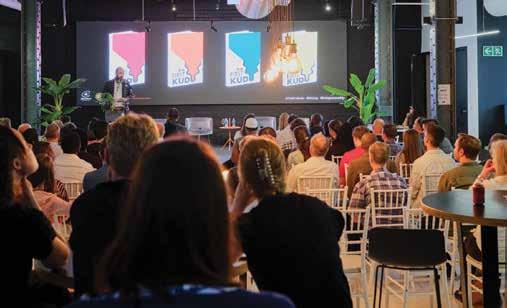
to
build
degree at UCT and had since school wanted to work in venture capital and investment. Advice on the way was that in order to get into venture capital one had to either (a) go into investment banking and gain investment credibility or (b) become a start-up founder. His career has led him through both! He now invests as part of EXEO Capital, with expertise across a wide range of domains, sectors and stages of business. He also co-hosts the show Shapers, Makers, Builders & Breakers with Riël Malan. Ben serves as an advisor to several small businesses and is passionate about mentorship and developing the entrepreneurial ecosystem across Africa.
Lorne is an experienced business leader, currently building and operating financial technology products in the education and retail financial services sectors. He has experience in technology start-ups and previously worked in management consulting in a range of sectors across the African continent. He studied a B.Bus.Science degree at UCT, where he was president of the SRC. His 2023 short story “Without a Single Curtsy or Cartwheel” won an honorable mention in the humour category of the 92nd Annual Writer’s Digest Awards and his flash fiction work “Villains’ Annual Strategic Planning” was shortlisted for the 2023 Bridport Flash Fiction Award.
HouseME – innovative property technology start-up
HouseME is the subject of the book; the award-winning Cape Town based property technology start-up that aimed to create a better world of long-term residential rentals - tackling unfair discrimination in the rental market and reducing intermediary fees whilst doing so. The core offering

was to find, match, contract and collect between tenants and their landlords’ properties, adding rental guarantees, deposit-free renting and a host of other interesting products along the way.
At the peak of the adventure, HouseME had a team of 34 as many as 50,000 users. Although, not everything went smoothly.
The team navigated Covid-19, the first of a myriad of headwinds, and write of the many other challenges – unique and otherwise – that had to be navigated in order to build well in Africa. Sadly, today HouseME is no more – and you’ll have to read more about why in the book!
What was your experience of studying at UCT:
Lorne: Being president of SRC in 2012/ 2013 was a fascinating experience - a unique window into how UCT operates. This contributed to a well-rounded university experience, and it was rewarding when we achieved wins as a council. Some examples of these were positive changes to financial aid policy, support for students facing financial exclusion, wins regarding admissions policies, the introduction of 24 access to study in the library, support for outsourced employees on campus, and re-introducing the Inter-Varsity sports tournament with Stellenbosch University.
Studying a Business Science degree in finance was a good experience and gave me solid foundations. Although, I changed my major a few times, swapping tax courses for economics – a legal form of tax evasion! I was in residence – in Rochester, and Woolsack – and enjoyed the res experience, and the student social life.
Ben: I very much enjoyed finance and accounting through my Business Science degree. Instead of doing PGDA, I chose to go directly into the world of investment banking, which was an
amazing experience. I had tried out three different businesses while at UCT but learnt completely different lessons from the biggest bank in the world. I didn’t stay in residence whilst studying, but felt I had a full experience during my time at UCT. I found myself in the library often and enjoyed being on campus. I was involved in the Student Y and some development programmes and mentorships.
How did you come to write this book?
After operations at HouseME shut down, we all needed some distance. The process of writing was cathartic – a good antidote to what had been a very draining and emotional journey. Morphing the business into a case study provided great value for our own personal learning and reflection. It also provided nuance – and seeing each other’s different perspective helped us learn more holistically from all that had happened. Reliving the journey in a different way provided an opportunity to acknowledge the positives and explore memories and recollections from what happened. The project of writing down the story and our own lessons learnt in a coherent way helped to order our thoughts and made them more useful for us - and we hope for others too!
Many funny things happened while running HouseME – at the intersection of tenant, landlord and services – and including these moments in what we wrote lightened the tone of the book. The dialogue between us (Ben and Lorne) borrows elements of fiction to bring non-fiction to life. The elements of fun were also true to our experience in building the business – they remain a critical part of how we approached our business and our writing hopefully captures this for the reader.
How the book evolved:
We set out to write a detailed case study for the Alan Gray Orbis Foundation as a way of giving back, because the Foundation had given a great deal to us. And then we realized there was a great deal more than just a business case study on hand, so we decided to turn this into something more. We had always relied on international literature to learn from; but wanted to contribute to the African entrepreneurial ecosystem. We enjoyed the process of bringing together the stories – the serious and the less-serious, crafting it together in a way that we felt made it easy and enjoyable to read, it snowballed.
Train analogy
The book uses images and the analogy of a train to describe the HouseME vision. The train analogy helps draw all the different elements together and is utilised to have something to remember the five lessons:
1. The tracks represent the direction of the business and the importance of keeping focused;
2. The engine represents the product you build and its fit-for-purpose qualities;
3. Fuel is investment or revenue – it’s the funding required for the engine to run;
4. Your train crew are the staff able to serve customers;
5. Carriages are the revenue-generating products or services your company carries and monetizes.
The book goes into each of these elements in detail - where they got it right and the hard lessons learned where they did not. The analogy brings together at end how best the reader can apply these principles to business.
Tell us about the writing process?
we were writing as we went along, and assisted us along the journey. Even sometimes just to fact check some of the crazier stories – we would write it down and then have to call others who were involved just to confirm that it actually did happen like that! It was also helpful to work with a publisher who had experienced working with authors like us – who hadn’t published before.
Who would you like to read your book?
• Anyone wanting to understand structures/ models for building a start-up; reinforced as a detailed case-study.
• For people wanting to switch to start-up, who need a relevant, African context.
• People who are interested in SA’s business, investing and entrepreneurial environment. Ours is not a memoir.
Ben and Lorne created an audio book which they narrated and the first person to download was in Jamaica, showing its international appeal.

There were many challenging moments along the way, however it really helped having two of us sharing the writing. When one of us was up, and the other down, we could haul each other along. Our collaboration meant bringing different strengths to the process. Even when you know something very well, discussing it, you see an alternative perspective. We incorporated some of our dialogue into the book – which was a uniquely difficult but gratifying experience, balancing out what could otherwise have been quite detailed styles of writing.
The book took two years from starting: 12 months of writing and probably another 12 months of editing. We initially wrote separately and then had to bring it together which was a real challenge. We received some harsh feedback on our initial draft after our first attempts to bring it together, which gave us great direction and we refined it from there.
A few close friends and colleagues were reading parts of what
The reward of birthing a book to give back: For Ben and Lorne, the book is about giving back to others and stimulating discussion. They comment that their reward has been the connections post the book launch. People who have read it are keen to engage, sometimes agreeing or disagreeing quite vehemently and then reciprocating by sharing their own experiences. It has certainly stimulated discussion.
At its core, this book is unique in business literature because it is about something that has taken place right here in Africa – real stats and data, not just theoretical (often international) advice. It is practical, reflecting direct feedback and big picture thinking.
The concluding chapter reflects Ben and Lorne’s strong drive to be positive and convey an uplifting message. This is not a doomsday story lamenting what took place, rather it is an encouragement to entrepreneurs who are going to launch their own start-ups to learn from them.
What is next for Ben and Lorne?
Lorne: My focus right now is on building and operating innovative technology solutions in the education and retail financial services sectors. The itch to write again is also present and certainly takes over from time to time.
Ben: I remain fully involved in African venture and mid-market investment, now working with founders and management teams as an investor rather than an operator. EXEO Capital is in the process of launching several exciting funding initiatives in the small business space, and I’m thrilled to be in a position to put my founder-experience to work!
Meet two inspiring women who are making a difference and changing lives through their work at the Oppenheimer Memorial Trust
Nomsa Muthapuli: From Chemical Engineer to Head of Early Childhood Development & Youth at the Oppenheimer Memorial Trust
UCT wasn’t Nomsa’s first choice of university to study at, because she wanted to stay close to home. She wanted to study something in the science field – Biochemistry was her initial plan, however she received a bursary from AngloGold and embarked on a Chemical Engineering degree at UCT at the last moment. Nomsa had a great experience at UCT and stayed in Carinus residence, and while at university she was involved in a range of student societies from His People, disability services volunteer, and was on the residence house committee.
Her first job was working in the mines in Carltonville, where there were very few women and it was often challenging to work night shift. After her stint at the mines, Nomsa moved to the Anglo American research labs. This was followed by a move to Mckinsey & Co where she worked as a researcher and a consultant on some projects. At this stage, she had children and didn’t want to be constantly on the move. While at Mckinsey, Nomsa had a hip replacement and wasn’t able to work. During this time, she had time to evaluate where her career was going (an early existential crisis!) and what she wanted to do with her life. She had small children and thought it would be interesting to do some extra mural activities for children – starting up an initiative of science experiments for children called Little Scientists. Further enriching her career, Nomsa moved to a start-up for a short stint, working as a management consultant.
At this juncture, Nomsa met someone from Harambee Youth Employment Accelerator, who told her about social sector organisations and opportunities to be involved. This segued into Nomsa (unexpectedly) taking on a role as operations manager and later chief operations officer (COO)
at SmartStart – an early learning social franchise which was still at start-up phase at the time. It was an interesting journey into the social sector for Nomsa, which gave her insight from the inside about what it takes to shift the needle of early learning in South Africa. Nomsa stayed there for almost eight years having gained invaluable experience.
Deciding that she needed to get different exposure to the ECD sector, Nomsa joined the Oppenheimer Memorial Trust (OMT) in late 2023, where she heads up Early Childhood development (ECD) and Youth. In this role she supports ECD organisations from a funding perspective, with the aim of driving systems change in the sector, and improving both access and quality early learning for South Africa’s most marginalized children. To reach universal access to early learning, thousands of new ECD practitioners and support staff will be required, and her portfolio recognizes the opportunity to also impact youth unemployment. This is done through supporting organisations that work with youth, to find them pathways into the ECD sector. Nomsa comments, “The move from an implementer (SmartStart) to a funder (OMT) provides an opportunity to get a holistic view of the sector and its players, appreciate the complexities different organisations face on the ground, as well as opportunities for impact through collaboration”.
Nomsa met her husband, who was studying Metallurgical Engineering at WITS, at a bursary interview and they did vac work together. They have two children, aged 17 and 16. Nomsa still somehow finds time to run her Little Scientist business for children.
On why she does this work, Nomsa says, “ECD is such an important foundation and provides good return on investment for education. If you invest early in a child, they will become a well-adjusted citizen. This is all about how to get good child outcomes that lay a foundation for future success. There are still minefields to navigate and
it is a fragmented space with lots of different individuals with different ideas”. Nomsa is excited about the opportunities that a social compact with the Department of Basic Education (DBE) can unlock. There is increasing recognition that quality learning can happen in different settings and practitioners need to be supported regardless of whether they operate in a traditional brick and mortar ECD center or home and community based spaces. This is one important way to ensure access to early learning in every community.
Nomsa comments that she has come full circle – with a bursary from Anglo Gold to working in the Oppenheimer Memorial Trust!
Bailey Corder: Journey across the globe and several different careers – moving from corporate to development work
Bailey did a Business Science degree at UCT, which was the only university she applied to, having seen her sister go through the system and enjoy her experience. She stayed in Baxter residence and whereas she had been very serious at school, when she got to UCT, she had a more carefree time, playing social tennis and getting involved in RAG. When she finished her studies, Bailey did her articles at KPMG in Johannesburg. She worked at KPMG in the industrial, automotive and pharmaceutical division, and while this wasn’t what she would have chosen for herself, (working with clients in plants in hard hats and boots) it provided a great learning experience and she found it a cool way to learn her way around Johannesburg. She would go out with a map book (before the days of Google Maps) and visit factories and construction sites.
When she left KPMG, Bailey did a short stint in Minneapolis for three months – going from thirty degrees in South Africa to minus thirty degrees in Minneapolis! After Minneapolis, Bailey travelled for a year, covering the States, Central and South America. While travelling, she did Home Stays, attended Language School and learned to speak Spanish. On her return to South Africa, Bailey worked for a financial advisory company where she had some eye-opening experiences working for big clients. This company then sent her to the UK to open an office for them there, which was a big learning experience, as the sole person responsible for every aspect of business. Bailey came back to South Africa with the same company and interestingly, OMT was one of her clients.
Tracey Webster had recently been appointed as OMT’s CEO and was setting up processes and systems. Bailey went to OMT to assist and after about 6 months, Tracey asked Bailey whether she wanted a full-time position working there. For Bailey it was an interesting career move – moving from corporate to private sector and then to development. Bailey describes her work now is very different – with a focus on softer skills and learning about education ecosystems – how all the pieces fit together to support the entire value chain.
When asked what drew her to taking the position at OMT, Bailey responded, “it was the stories of how life changing a scholarship can be and the impact of what we do here has on

lives. The search for meaningful work helped making the leap into this work easy”. OMT has been in existence since 1958 and they have changed innumerable lives, such as the likes of Desmond Tutu and many others who they offered scholarships to. “Tracey is an inspiring leader who is not afraid to get her hands dirty. For the last three years we have been building a strong team and our strategy has shifted to tackling the systems in which we work”, said Bailey. OMT’s five-fold focus is:
1. ECD and Youth Development: enabling universal access by 210 000 young people becoming ECED practitioners with 200 000 more to be employed in the sector by 2030.
2. Basic Education: Improving the quality of teaching by flooding the system with new, dynamic and highly skilled foundation phase teachers.
3. Higher Education: supporting exceptional talent at multiple levels.
4. Social Justice: building social justice and a robust democracy by supporting policy advocacy, research and investigative journalism.
5. Arts and Culture: nurturing young talent through exposure to arts and supporting platforms for them to shine.
Bailey stresses how important it is to keep a bird’s eye view and play a collaborative role in this field. She describes how they need to elevate the organisations they support, showcase their work and the impact they have made. Harry Oppenheimer’s philosophy was to always support individuals and that is a golden thread they want to keep at the heart of what they do.
By way of encouragement to other professionals who might be thinking about taking the leap from corporate into development work, Bailey has this to say, “It is important for high-fliers in the corporate sector to consider working in the social sector and vice versa. We need their expertise in thinking, strategy and business plans. Thinking becomes limited if we have teams of only engineers/ lawyers/ accountants – it is very good to have diversity of thinking and different ways of seeing things”.
UCT alum Santi Naidoo is living her dream as a film producer in Los Angeles, many miles from the home she grew up in, in Cape Town.

In an interview with Alumni News (AN), Santi tells of life before LA:
AN: What made you choose to study at UCT and to do the course you did?
Santi: “I am Cape Town born and bred and grew up between Claremont and Rondebosch. UCT was always there on the hill. I wanted the full experience, to earn a reputable degree and UCT felt local.
A BA degree felt like it would give me the flexibility I wanted. I was always interested in film and thought that by doing film and psychology, I would make myself marketable for the job market. I decided to do a triple major with film
and media, psychology and organisational psychology, which was the perfect combination and recipe for what I have ended up doing - considering that a great deal of what I do now is people management.
When I graduated in 2019, I decided to do an honors’ in Film and Media to gain some extra tools in my toolbox and potentially open doors internationally. This turned out to be a wise decision because Covid-19 happened, and it would have been challenging to try and enter the workforce during lockdown. It was good to further my studies, although it was brutal doing the course and having dissertation supervision online.

AN: What was the highlight of your UCT experience?
Santi: I enjoyed the diversity that I experienced at UCT, and the different walks of life that every person I engaged with came from. Having grown up down the road from UCT, UCT allows opportunities for all and I was exposed to very different lived experiences. I was at UCT during the Fees Must Fall protests and marched alongside my peers, showing solidarity and actively working to reshape our country. I also had the opportunity to attend other classes with my friends, such as Economics and other business courses. I enjoyed expanding my mind and soaking up different ways of thinking.
AN: Tell us about your move to the USA.
Santi: Once I had completed my honour’s degree I realised I needed to keep the momentum of studying going, so I applied to various Master’s programmes internationally – mostly in Europe and the UK and ironically only to one school in the USA, the American Film Institute (one of the highest ranked film schools in the world). I only applied to one school in the USA because I wasn’t too keen to pick up my entire life and move to literally the other side of the world. And when I was accepted by the AFI, I decided it was a no-brainer because of the reputation it carries in the industry. Thankfully I got a scholarship, which made the move possible, because education in the USA is very expensive. In 2021, when lockdown was still very present in South Africa, I applied for my student visa, got an exemption to travel internationally and myself and two suitcases moved to the other side of the world! Because there was no tourist travel, my parents couldn’t move with me, so it was Cape Town International Airport and bye bye.
AN: Was it a culture shock?
Santi: Yes definitely! It was a very big move with so much newness. I had travelled a bit to the US but hadn’t spent extensive time here. I had also never been to Los Angeles which
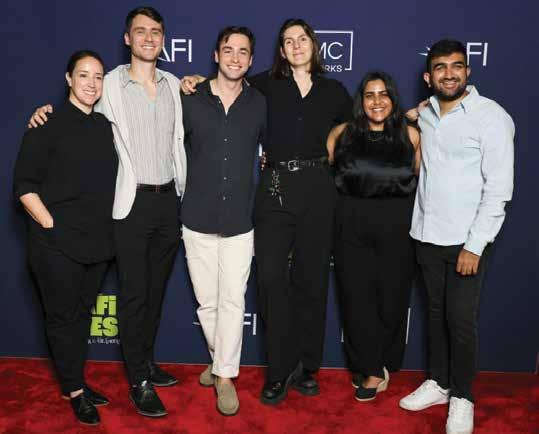
is a massive city that extends for many kilometers. AFI is a very international institution, with students from all over the world, so we were all in the same boat of moving to a new city and starting from scratch. I am very grateful that I found a good group of friends who support each other. Fortunately I have some family in the US, even though they are on the East Coast. I do manage to see the on holidays like Thanksgiving, Easter, etc.
AN: Tell us about the Masters’ programme you did at AFI?
Santi: The Masters’ is a two years programme which was very hands-on and different from the more theory based route that I had followed at UCT. They offer six disciplines, and I chose producing. As well as learning about contracts, I was constantly on set and created seven projects in my first year and four in my second year. You walk away with a vast array of experience, working on my own and other people’s projects. This allowed me not only to develop working relationships with a range of people but was also a valuable opportunity to experience how other people approach producing and filmmaking overall. Because I was only doing producing, I was focused in my field, getting good at developing those skills and becoming a professional with industry standards. Most people walk away from AFI with a reputation of being able to handle what the industry throws at them. You also get to create something for educational purposes and the film we made, using lots of crew and friends from AFI was a great time of collaboration, getting to make something fun and exciting with people you enjoy working with. We took some of my films to various film festivals where they did well and got recognition for different elements such as production, design, directing and acting. I also produced a couple of 35mm films one of which received an award from the American Society of Cinematographers. This was a huge morale boost to realise that I could make movies which were well received.
AN: And what are you currently involved with?
Santi: I have a full-time position at a production company called Submarine Entertainment where I do in-house production and development. This is a great opportunity because I have a stable income and work 09h00 to 17h00, which not many people in the film industry get, because it is mostly freelance work. Working at a small company has allowed me to be hands-on with the projects we are working on (mostly documentary at the moment). And I am also able to have some passion projects happening on the side. One of those is writing the full-length feature version of our thesis film. There is a South African who I am thinking of collaborating with on a few projects. He and I met at UCT and he sends over things he is working on and we are hoping to make that happen – but a lot of it is script development at the moment. Ironically, this is a realm that is lacking in the South African industry, because nobody is willing to pay anyone to sit around and write – for the development stage. As a result scriptwriting has to take place on the sidelines, which is a tough position because there are so many incredible projects and film makers coming out of South Africa, however
most people need to work other jobs to put food on the table. Very often, as a film maker I will look at a project and think that the project could have been one hundred times better if they had developed the script and done two or three more iterations of that script.
AN: What does work as a creative producer entail?
Santi: I am there to support the screenwritiing, directing the writing, advising, giving feedback. When I have a concept that I am deeply passionate about, I work with a screenwriter and a director to develop the idea.
As a producer, a big part of my job is managing personalities and navigating widely differing personalities. This is where my psychology major background is useful. Reading people and knowing what is within your control and what you have to just let happen.
AN: What has been your greatest learning over the last few years?
Santi: One of my biggest learning curves was to learn to trust your collaborators and relinquish control. I am an A-type personality (as many of us producers are) and like everything to be thought through and planned – and it takes a great deal to trust others and not micro-manage. Working out when someone needs more of a guiding hand when they are new to the tasks.
AN: What is life in LA like?
Santi: Initially it was a culture shock moving to a new country, but I have learned to love it more. The cost of living here is high, but there is a lot one can do for free and I have fun because the people make the place and I have made friends who feel like family. This has been a game-changer that makes life in LA enjoyable.
And of course, being in the film industry, it is wonderful to be in a city where there are always movies being made. You go down streets and you have road closures, which are inconvenient, but they are shooting Hollywood movies and I am close to many studios and I have been able to spend time at Warner Brothers with its iconic sets. There is so much creative energy and collaboration which is stimulating.
AN: What do you do for fun and to relax?
Santi: Ironically, I watch a lot of movies! And in summer I go to the beach and in winter I can drive for two hours to be in the snowy mountains. I am very grateful for the nature around me and being able to reconnect with it, which grounds me.
AN: And what is your dream/ plan going forward?
Santi: Currently I’m working o getting my work visa to spend a bit more time in the US – but it isn’t the final destination. In the next ten years or so I would like to be working between South Africa and the international market. I would love to be based back home again. I’ve had all these incredible opportunities and experience in education and I would really love to bring that back to South Africa in a way that fills a gap in the industry. There are so many creative people in South Africa, incredible producers, and wonderful stories that people have to tell, but a
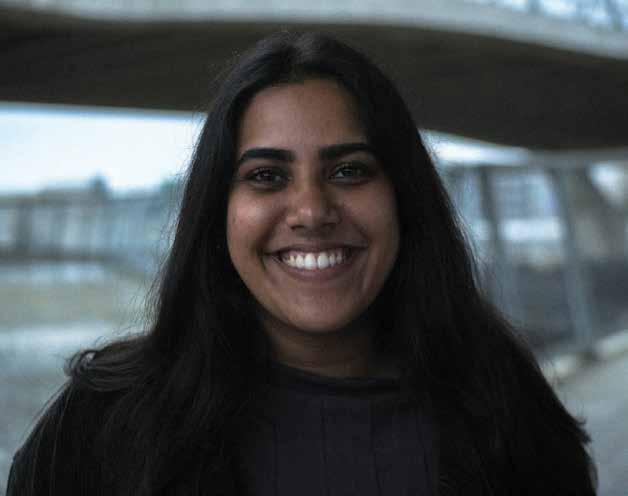
big part of producing in South Africa is logistics and finances. As a creative producer, you’re there from the inception of a project all the way until it makes it onto screens and movie theatres. The American industry have been very good at this, but South Africa has been struggling to some degree. So because South Africa is home and I love the industry and the stories that people still have to tell, I think there is real opportunity to work here with my international network and to help bridge the gap. I am excited about the opportunity to bring other productions from international people to South Africa and to take South African projects to the International Space because there is so much relatability in other cultures from around the world to the South African experience, that I think is overlooked.
AN: Any advice for aspiring movie producers and students?
Santi: I have two big pieces of advice: firstly, don’t be afraid to fail. Don’t be afraid to make something and have it be horrible, because you learn so much from making bad stuff that was a total flop – the process will have taught you so much. Secondly, find the right people you can work with, diversify the people you have around you and translate them into working relationships so that you have good collaborators. Not being in an echo chamber of opinions is really beneficial to the creative process overall. So be prepared to fail but try things over and over with different people and different perspectives. That is a surefire way to make your work in your creative process better.
You need a lot of patience and at times it can be rather devastating to your self-esteem!
While you are still at UCT and there are low stakes, make a film with your phone; collaborate with others, use the resources available.
AN: Thank you Santi for making time to do this interview. You have pursued your dream boldly and grasped every opportunity to learn and grow as a producer, making waves on the international film circuit. We wish you well and look forward to seeing your name up in lights and having an impact on the industry back home!

As South Africa commemorates 30 years of democracy, few individuals stand as tall in their contributions as Professor Wiseman Lumkile Nkuhlu – a pioneering figure whose contributions to education, finance, and leadership have left a mark that remains ineradicable on the country’s socio-economic landscape and history.
AUniversity of Cape Town (UCT) alumnus and a recipient of the 2004 UCT President of Convocation Medal, he is renowned for being the first black chartered accountant in South Africa, and his groundbreaking achievements extend far beyond this milestone. His experience spans over four decades, making him a symbol of resilience, purpose, and visionary leadership.
In this reflective interview, Professor Nkuhlu shared his life journey – from growing up in rural Eastern Cape during apartheid to leading the next generation of African leaders. His recent book, Purposeful Leadership for Africa in the
21st Century, cements his status as a thought leader whose insights are shaping South Africa’s future.
A life of breaking barriers
Born in the small village of Cala in the Eastern Cape, Nkuhlu grew up under the harsh realities of apartheid. His parents emphasised the power of education, instilling in him the belief that it was the key to both personal and collective liberation. “In the 1960s, African countries were gaining independence, but there were so few graduates to run these new economies. I knew that for South Africa to succeed, we had to prioritise education,” he reflected.
This understanding motivated Nkuhlu to pursue a qualification that had been inaccessible to black South Africans under apartheid: chartered accountancy.
In 1975, he enrolled at UCT, where he was one of only two black students in a class of 100.
“It was a lonely experience, and I often faced hostility and doubt. But I always remembered my parents’ teachings about perseverance,” Nkuhlu said.
Despite the apartheid regime’s efforts to limit opportunities for black South Africans, his determination never wavered. He recounted the challenges he faced, including having to obtain special permission from the apartheid government just to attend UCT. “We had to get permission from the Minister of Bantu Affairs to study at UCT. It was a form of defiance,” he said. “Every day I risked being arrested because I didn’t have a permit to live in Cape Town. But I refused to let that stop me.”
Nkuhlu overcame these challenges and succeeded. In 1976, he became the first black chartered accountant in South Africa, a monumental achievement that paved the way for others to follow.
Leading with self-mastery Nkuhlu’s leadership journey is a lesson in personal mastery, a concept that has guided him throughout his career. In Purposeful Leadership for Africa in the 21st Century, he explores how effective leadership starts with self-discipline and understanding one’s strengths and weaknesses.
“Accepting without qualifications that you are responsible and accountable for your conduct and behaviour and that your independent will, which is a distinct endowment you have as a human being, is strong enough to overcome your instincts and conditioning in which you grew up is the highest requisite to success as a leader.”
As South Africa celebrates 30 years of democracy this year, Nkuhlu reflected on the importance of education in achieving meaningful socio-economic transformation. He acknowledges the progress made in expanding access to higher education but remains concerned about the financial barriers many students still face.
“Students, especially those coming from poor backgrounds, need to have the necessary support in terms of finance in particular because one of the things that continue to make it difficult for black students to choose [to study in] Cape Town is the question of resources – not being able to afford the fees.
“It’s very important that the University of Cape Town continues to play an important role in making sure that as many black students as possible are given financial support to afford to study at the university.”

Chapter 9 of his book speaks directly to Africa’s leadership challenges. Nkuhlu argues that the continent must foster leaders with personal mastery and a vision beyond personal ambition:
“Leaders must have a cause greater than themselves. Personal mastery, combined with a scientific mindset, is essential to close the development gap between Africa and other regions,” he writes.
His latest book, “Purposeful Leadership for Africa in the 21st Century”, highlights the importance of education as a tool for transformation. Photo Supplied.
Nkuhlu’s passion for nurturing future leaders is clear in his work. He believes young Africans must rise to disprove outdated myths about the continent’s capabilities and embrace their responsibility to drive economic independence.
Beyond education, Nkuhlu’s vision for the future encompasses leadership across all sectors of society. Drawing lessons from countries like Japan and South Korea, he advocates for adopting meritocracy and pragmatic leadership principles to drive development across Africa.
Lessons for the next generation
Nkuhlu’s commitment to empowering the next generation shines through – it’s what keeps him motivated. But as he noted, the opportunities available to today’s youth also come with great responsibility. “Today’s youth have opportunities that were unimaginable in my time. But with those opportunities comes the responsibility to lead with integrity and purpose,” he said.
His advice to UCT students and young alumni is clear: use the privilege of education not just for personal advancement but to uplift others.
Despite his numerous accolades, from serving as an economic advisor to former President Thabo Mbeki, to playing a central role in the New Partnership for Africa’s Development (NEPAD), and currently the chairman of KPMG, Nkuhlu remains grounded in his belief that true leadership is about service: “I just hope that my endeavours to be a good role model can serve as an inspiration to others,” he stated.
As South Africa looks ahead, Nkuhlu’s reflections on leadership, education, and service offer a blueprint for a better future. His life’s journey is a powerful reminder that with determination, vision, and purpose, even the most formidable obstacles can be overcome.
His humility, wisdom, and unwavering commitment to building a better South African cannot be denied.

Meet Mpumelelo Mhlongo – inspirational accomplished professional athlete, chemical engineer, risk analyst and scholar, with a stellar trajectory and a passion to change the world.
Alumni News caught up with UCT alumnus Mpumelelo Mhongo while he was in Paris preparing to compete in the 100m, 200m and long jump at the Paralympic Games. Not only is he a professional athlete, but he is employed by Investec as a Structured Finance Consultant and he is also currently completing his PhD in Chemical Engineering at UCT. The pursuit of excellence and overcoming challenges is clearly part of Mpume’s DNA, evidenced by the collection of medals and world records he holds.
What made you choose to study at UCT?
I think it is every kid’s dream – it’s the best university in Africa and Cape Town is the mother city for our entire country.
In my matric year, I was in the Kearsney College Choir and we got to go to the World Choir games in Cincinnati in the USA. I remember being so far from home and hearing my mom’s voice saying, ‘If you really want to make something of yourself, you need to run as far away from home and have no safety net’. So, the furthest place I could think of from a university perspective was Cape Town! And the other reason is because the institution itself has such an amazing reputation for creating the most well-rounded graduates. My mathematics teacher at the time said that if you are going to study anywhere, you need to go to UCT and the window that opens the rest of the world for you, will happen.

What did you enjoy about your time at UCT?
I thoroughly enjoyed my time at UCT and most of all the community of friends I made. We had an amazing group of students who are still friends to this day. We supported each other and helped each other in our weaknesses and our strengths formulated part of how we grew up as individuals. We did lots of studying and parting together (maybe at times a little too much partying and a little less studying –but we had fun!) The biggest challenge when you are away from home is reminding yourself to be grounded by the disciplines you learned at home. And importantly, I met my wife on the second day of being at UCT. I was doing an engineering degree and she was doing a quadrupal major in the Humanities faculty.
I had the best lecturers in the world – they truly were the most phenomenal individuals I’ve ever met. They taught us more about who we want to be in life, using chemical engineering as a tool, rather than shoving content down our throats to get good marks.
I was on the UCT Athletics Club committee for many years and won the UCT Sportsperson of the year award five times in a row, until I had to say that I refused to be nominated because I need to allow others the opportunity to win and be rewarded for their hard work. It was a real blessing to have found this passion for sport at university and to have had the support to cultivate a world in which I was able to represent the country through the university support system.
What sparked your interest in sports?
If I go back to the foundational pillar of sport, it was really to differentiate myself. I was born with a deformity called
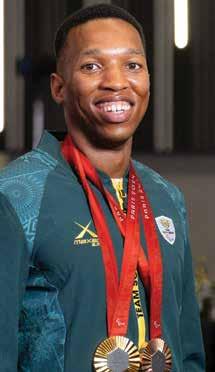
amniotic band syndrome, which created a deformed club foot and some missing finger digits. And in the mid 90’s at the dawn of democracy in South Africa, there was a big stigma attached to disability. My Mom said she lived in 2 different worlds: there was huge excitement about the new South Africa and the dawning democracy, but then her first-born child was born with a disability and the stigma attached to the disability was attached to witchcraft and black magic. This created a huge conflict between my mother and father and their families.
Facing these internal family dynamics challenges, created a sense within me that I needed something to differentiate myself.
This was also the height of the ’95 World Cup final and football was big with South Africa being in the African Cup. I told myself, ‘I’m going to be the fastest kid in my neighbourhood. If you’re the fastest kid, nobody cares about anything and whether you have a funky foot, or no fingers.’ This was the driving force where my passion for sport began.
You are clearly internally driven and push yourself to achieve excellence?
I’d love to take the credit, but my mother in particular, and both of my parents have worked hard to propel themselves out of poverty and created opportunities for their own children that they didn’t have. My parents are the protagonists of my childhood and a great deal of what I did was to replicate what they were doing in their lives and to make them stay proud of me.
In early childhood, I was only really fully functional in terms of walking and running at about five to six years of age, because I had to have extensive surgery to release the amniotic band syndrome. I also don’t have toes which play a big part in one’s stability and balance and missed the formative years of other children, who were already walking and running by the age of two. But I would like to think I caught up.
Tell us about your experience of winning at previous Paralympics and World Championships?
The medals are great, but it is more significant and rewarding to be part of a sport where people who are either born with or experience challenges in life that give them what would be considered career-ending injuries, turn that career ending injury into a professional sporting career. That resilience, perseverance and positive mindset that transforms what could be in many cases the end of parts of their lives, into the beginning of a new chapter, has captured my heart in terms of participating in this paralympic space. The medals, accolades and achievements, are really just the cherry on top.
How do you deal with the high-pressure environment of competing at world class levels?
Through the years, I have come to realise and acknowledge that the space you are competing in and the expectations to achieve, are often self-inflicted. It is all about the tools one has to deal with this pressure when it matters. I didn’t have specific psychological training, but I think my capacity to cope with it is a function of how I grew up, with one half of my house criminals and the other half police officers. I often go back to how I dealt with my father attempting to arrest my uncle who was hiding under my bed – and how I was able to deal with it and walk out without the trauma of those experiences. Seeing my uncle go to prison for twenty years and then come back and change his life around and become a good, honest citizen with work as a bus driver – gives one perspective that anyone, if they choose to, can do something significant in the community you live in.
Not one to shy away from challenges, Mpume, in addition to holding down a job in the financial services industry and competing in the international arena where he is representing his country, is also currently doing a PhD in Chemical Engineering.
I enjoy working in the banking and financial services industry and the process modelling and optimization. The derivatives space is very fast paced and highly pressurized and one needs the systems and processes that allow you to operate efficiently with the least amount of human error possible. It is exciting to participate in this market and assist the client and protect them from adverse market movements. A great deal of financial risk management is imbedded in how to create a sustainable world and we need to look at how the secular economy funds and contributes to society instead of taking away from future generations.
Words of wisdom/ encouragement to other students:
I think there are two fundamental pillars of being a student in the university space: The first is that you need to make playfulness a priority - having a curious mind about what excites and fascinates you; keep asking the question ‘Why’ and get to the core of what it is that recharges you as a person. The second is not to limit yourself. We often have ceilings that we create for ourselves. Dream big and think about the small steps it takes to be the person you wish to be in the future – that way it isn’t overwhelming. I ask myself every day, (a) who can I make smile today? (b) What kind words can I share today. And if you have those basic building blocks, you will find the life of fulfillment and be part of creating better humans in our society.
Family support for the journey to stardom
As a young child, my father was my hero – I wanted to be a police officer like him. My Mom did a lot of the hard grind work as a parent and as I’ve got older, I recognize that I didn’t give my mother the credit she deserved, as the responsible parent. But I
was privileged to have two phenomenal parents who are charismatic and have been extremely successful in their own rights, but who also had the humility to admit their failures. That has allowed us not to make the same mistakes and to recognize that we, ourselves, will never be perfect. Striving to be kind, more than anything else, is one of the values they have imparted and that is a life lesson I will pass on to everyone I meet.
Mpume was the South African Olympic flag-bearer at the Paralympics Games and brought home a gold and bronze medal along with two world and Paralympic records from Paris.
Mastering the art of imbalance
Looking at his impressive string of achievements in almost every area of his life (in addition to being a top athlete and pursuing a PhD, Mhlongo speaks six languages and has a talent for art), it’s natural to wonder how he manages to do it all.
“Unfortunately, there’s no balance,” he laughed. “One of my mentors sat me down a long time ago and told me that you can have everything in life – if you live long enough – you just can’t have it all at the same time,” he recalled.
“You have to forget about doing everything all at once and know that there are things that will take priority at certain points in your life and other things that will be important at other times. What’s important is that you communicate that well so that everyone in your life knows where you are and what’s important.
“That’s how you can go forward and achieve those singular milestones, with daily discipline. Then, in 20 years’ time, when you look back, you could be living out a reality you would not have been able to dream of.”
We are sure that he will continue to make his mark, not only in the international athletics arena, but in all that he takes on.

57-year-old UCT alumnus and socioeconomic activist Keith Boyd has broken a Guinness World Record by running from Cape Town to Cairo in 301 days – a gruelling 11 000 km –beating the standing 26-year record by 17 days.
He believes that his age was a factor in helping him break the record. “I managed to break the Guinness World Record not in spite of my age, but rather because of it.”
Keith believes his life experience which include trauma, inspiration, organisation, leadership, military training, endurance sport and African-specific knowledge built up over decades, had prepared him for this race. He said had he not had the motivation to reduce poverty with his NGO, Rainbow Leaders, and their youth empowerment programmes, he would not have made it through the most difficult parts of the journey.
The rationale behind Keith undertaking this race was to raise Rainbow Leaders’ profile. This NGO aims to create awareness among South African youth about the importance of voting, actively participating in democracy and reducing poverty.
The idea was that his run would receive attention-grabbing headlines – of the motivational and inspiring kind – from which several strands of publicity and awareness about Rainbow Leaders could get traction in both traditional and social media. Keith is currently writing a book about his race experiences. It has the working title of Running Africa and there is also a documentary being edited with the same name. “Both these projects are about raising awareness and increasing visibility which will bring corporate and individual donors on board,” he said.
Rainbow leaders
The idea for Rainbow Leaders came about when Keith was completing his Executive Masters in Business Administration (EMBA) at the UCT Graduate School of Business (GSB) in 2016.
The organisation started out as a way of informing young people about the importance of values in leadership.
However it dawned on Keith that South Africa’s real problem was not just about having honest people in leadership positions. “It is also about how they are elected into office and how to ensure that they are held accountable,” he said.
“We can’t claim to live in a vibrant democracy when only 7% of 18- and 19-year-olds vote and when less than 20% of under 30-year-olds vote. To put it another way the under 35-year-olds in South Africa make up almost half the eligible voting population, yet they only make up a quarter of those who vote!” he added.
“We’ve got young people saying they’re not bothered to vote – yet young people surely have the most at stake. So Rainbow Leaders’ mission is to convince young people that they have the power to make a difference in our country. We should have a vibrant democracy – we’ve got a progressive constitution, an independent judiciary, a free press, robust Chapter Nine institutions and an Independent Electoral Commission (IEC). No one can claim that any government that’s been elected since 1994 has not been freely and fairly elected. So we have all the right tools for a thriving democracy, but we can’t realise this when the vast majority


of under 35-year-olds do not exercise their right to vote.”
Right-sizing the economy
“I really do believe that if we elect better leaders and we grow the economy 2% faster than the population growth per year, we will right size the economy in 20 years.
It starts with us saying that we can do this, and then getting to work on it. By growing our economy by just 2% faster than the population growth annually we would generate an additional trillion rand in taxes per year and an extra two trillion annually going into the pockets of people in jobs. “If we can grow at this rate, we would have right-sized the economy within two decades,” he said.
Rainbow Leaders aims to visit more than 10 000 schools per year over the next 20 years to lead discussions on the importance of voting. “Right now we don’t have anywhere near the funding we need to get to those schools even once a year. We changed our method of engagement from visiting three or four schools a day to doing one school a day. You have your talk and question time, and then you stay in the playground during breaktime so young people can come and ask you more questions. It’s not an efficient method of engagement, but it’s highly effective in terms of converting non-voters into voters!” Keith exclaimed.
The run itself tested Keith to his limits. He started out every day at about 05:30 and eventually got into a rhythm of running 13km, fuelling and resting for 20 minutes, then running for 12km followed by a short rest and then running a further 11km,10km, 9km, and so on. Typically he and his support team would set up camp about 17:00 in the evening.
Lasting the distance
“I also walked a lot as the slower you go, the less damage you do in terms of joint impact. At my age, I had to make sure that my body would last the distance. I lost muscle mass, and had various repetitive stress injuries along the way, so varying my pace to deal with these issues and allow my body to repair whilst still moving every day, was key,” Keith said.
Looking back on his race Keith’s fondest memories are of his time in Zambia. “Zambian hospitality was outstanding. The country has a tourism industry that welcomes visitors with open arms. We were hosted for free in hotels and people’s homes regularly.”
He ran the first 125 days with no rest days. His first day off was
in Nairobi when he repacked the support vehicles.
“My plan was to keep moving, as I expected that we’d have some forced ‘rest’ days due to border delays, and the civil wars in Ethiopia and Sudan. As it happened, I ended up with five days of no running in Sudan due to a dreadful gastro infection, and I lost almost 60 days due to the war and criminal gangs in Northern Ethiopia.”
The last 780km in northern Ethiopia took a total of 75 days, instead of 16 days. “We were turned back by authorities on our first attempt. Then we were taken hostage, beaten, robbed on our second attempt. On our third attempt, the military prevented us from going further. On our fourth and finally successful attempt, I was kicked, threatened with my life at gun point, our team were all locked up overnight without charges, our guide was punched on the face and threatened by a soldier…the list goes on,” Keith recounted.
“If we had stayed at the same pace of 50km per day average, without those delays, the record would now be 240 days. Unfortunately, it took me 301 days.”
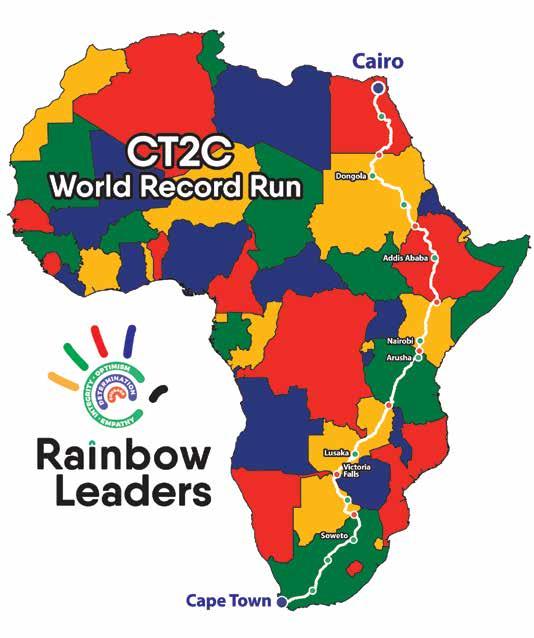
Inspiring scenery and culture
Keith was inspired by the scenic and cultural beauty he encountered on his journey. He believed central Kenyaspecifically Samburu county just north of the equator-possessed the most spectacular natural beauty of all.
“The proud and beautifully dressed Samburu people, the rock
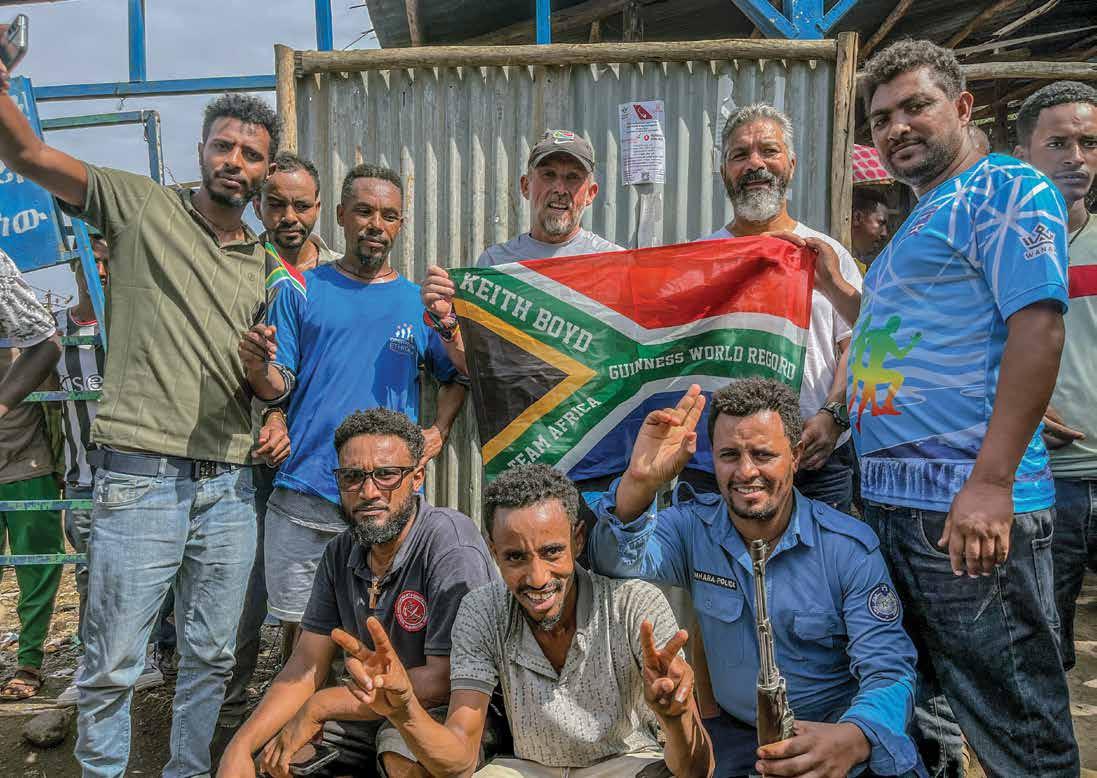
formations, trees, birds, rivers … it had it all.”
Samburu county’s beauty was closely followed by the majestic canyons leading down to the Blue Nile Bridge in central Ethiopia. However he pointed out that this beauty was somewhat offset by its ongoing brutal war, rampant crime and pervasive poverty.
In experiencing a bit of Africa’s dark side Keith gained a profound insight. “I witnessed repeatedly how ideologies –mainly customary and religious beliefs – are holding us back, and perpetuating tribal and civil conflicts, thus adding to the problem of slower economic growth and its close companion, poverty.”
“I have heard it said that ‘an idea is something that you have, whilst an ideology is something that has you’.” To Keith the losers of these customary and religious practices seemed to be women. “They are relegated to the back-breaking work of carrying wood and water, whilst the men take it easy herding and ‘protecting’ their livestock from theft… which almost never happens anymore in the majority of Africa.”
In many religious societies, women seem to be viewed as inferior beings, and are robbed of the opportunity to meet, work or socialise with men, without the express consent and presence of fathers or brothers. “The views expressed to me by the men
was that women were incapable of making good choices about partners, so those decisions were made by men.”
“However the biggest losers in society seem to be the men themselves, as they were isolated in all male workplaces and schools. That results in toxic masculinity, binary thinking, and an inferior quality of life. It struck me as marked that the societies most trapped in ideologies were the poorest, and often at war with each other.
From my lived experience, I would argue that women more often know how to collaborate and compromise, whereas men more often choose competition and confrontation, which is exactly how the civil wars in Ethiopia and Sudan started!”
Keith’s life experience has led to a central belief about himself and others which was affirmed by his race experiences: That people are immensely capable and empowered – their main limiting factor existing only in their own mind. “If we tell ourselves that we can’t do something great, we prove ourselves right… but if we just believed that we could do something, then took action, we could.” Keith’s suggestion is that we all take that first step on our own audacious journey, and just keep moving, no matter how tough it gets - we’ll get there in the end.
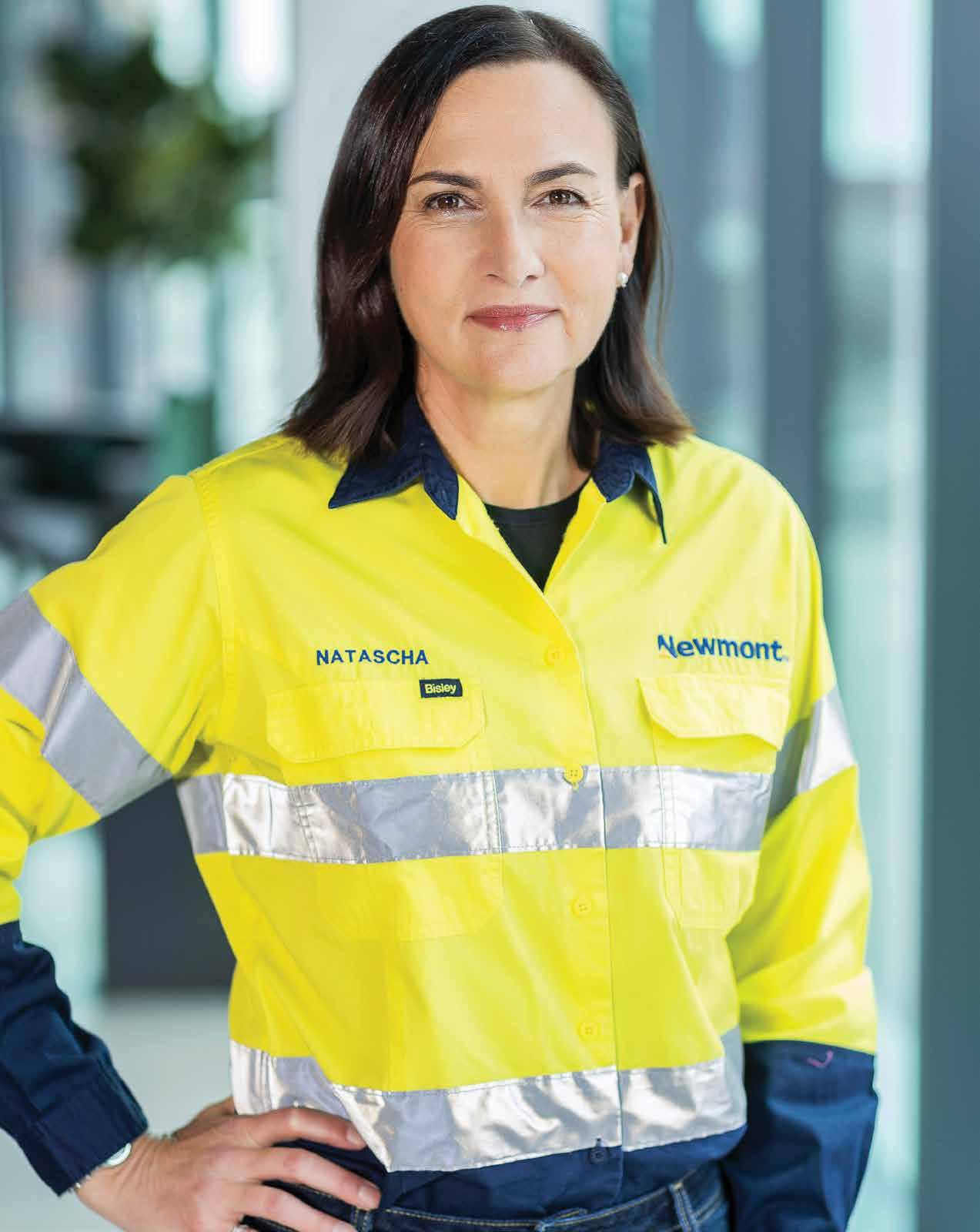
From watching her father work gold mine night shifts as a child, to being appointed the COO of the world’s largest gold mining company, veteran mining executive Natascha Viljoen has proved that profound early influences can inform later success.
Her interest and brilliance in math and science cemented her decision to study engineering and her academic accomplishments were crowned with an Executive Masters in Business Administration (EMBA) from UCT.
Following three decades in the mining industry, Natascha struck gold with her latest appointment as Chief Operating Officer (COO) and Executive Vice President of the world’s largest gold mining company – the US-based Newmont Corporation.
“It’s an absolute privilege to be part of Newmont’s leadership team. I’m really grateful that I managed to step into this role, and I don’t take it for granted,” she said.
The UCT alumnus, who grew up in a mining community, said her first exposure to mining was when she accompanied her father on his night shifts at a gold mine which had made an indelible imprint on her psyche.
She has both her parents to thank for igniting her ambition and resourcefulness and says her work ethic can be ascribed to growing up in a blue-collar family led by very hardworking parents.
“I think my philosophy in life was probably formed way before university. I think it was truly formed at home. Mom was a teacher, and dad did not have the opportunity to finish school. Both of them had very tough childhoods, something that did not prevent them from giving their two daughters the best opportunities to follow their dreams.
“The discipline they instilled in us was that there is no job too big or too small. You do the job at hand. That gave me
exposure to elements of the mining industry that I don’t think I would have had otherwise.”
“They were well ahead of their time. My sister is a veterinary surgeon, I’m an engineer. They supported us to do something that was considered controversial at the time. So, despite their humble beginnings, they definitely envisioned something very different for their children. So, my values in life truly started at home.”
When it came time to choose a career, during a period when opportunities for young women were often limited, Natascha’s mother played a pivotal role.
“At that time, girls were typically encouraged to pursue careers in teaching or other traditionally ‘softer’ fields,” Natascha recalled. “But my mother wasn’t satisfied with that. She believed I could do something different, which led me to explore engineering. That decision ultimately brought me to study at what was then Potchefstroom University. And the rest, as they say, is history.”
That history began with a two-year training as an engineer at the Vanderbijlpark works of the Iron and Steel Corporation of South Africa (ISCOR), where she started her career as a bursary holder. This was the standard path for an ISCOR-sponsored engineering graduate to gain practical experience.
From there, Natascha’s career took an impressive and varied trajectory over 32 years, ultimately leading to her current role as Chief Operating Officer at Newmont Corporation.
“My career journey has been diverse – I moved from ISCOR to gold, then to Platinum Group Metals (PGMs), followed by
chrome, coal, back to PGMs, and eventually returned to gold. While my background is in chemical engineering and initially focused on processing, I had numerous opportunities to step beyond my core expertise. Over time, I worked across much of the mining value chain, gaining experience in roles ranging from operator to General Manager of mines.
“It was during my time in chrome mining that I first began to truly delve into the operational side of the mining process.”
Her management capabilities were further demonstrated when she was appointed General Manager of the open-cast Klipspruit Mine, a role that added to her impressive portfolio of leadership experience.
“Throughout my career, I’ve had the privilege of working in many aspects of the mining business, including external relations, community sustainability, mining operations, and processing. This broad exposure has been invaluable in shaping my understanding of the industry.”

She recalls navigating numerous challenges, such as securing social licenses to operate, addressing operational and technical hurdles, and handling the complexities of her role as CEO of Anglo American Platinum in Johannesburg, South Africa. These obstacles provided countless opportunities to learn and develop her skills.
“Someone once asked me if I ever felt overwhelmed by the sheer volume of issues I had to manage. The truth is, I often took on tasks outside the scope of my official role. Each of those experiences became a valuable learning opportunity.”
By the time she stepped into a position of leading an entire company, she had gained firsthand experience at every level of the business.
“I wasn’t just observing when things happened – I had been directly involved in the work. That hands-on experience allowed me to build a deep knowledge base and the confidence to navigate uncertainty and lead effectively through periods of change.”
Natascha was a member of Lonmin’s leadership team in August 2012 during the Marikana massacre – a tragic event in which 34 miners were killed by the South African Police Service (SAPS) during a six-week wildcat strike.
At the time, Natascha was in the midst of completing her Executive MBA at the University of Cape Town (UCT).
“The Lonmin board asked me to take responsibility for managing all external relations and overseeing the company’s engagement with the Farlam Commission at the outset of the inquiry,” she explained.
“And through this work, as I engaged with the families of police officers, employees affected by the striking workers, and the families of striking workers killed by the police, I was confronted with the profound responsibility of purposeful leadership. In an industry deeply familiar with the complexities of global disparity, we have a unique opportunity to create value by serving as custodians of the natural resources we mine – resources that belong to the countries where we operate – while responsibly deploying our shareholders’ capital.
“In 2011, I began my Executive MBA at the University of Cape Town (UCT). What stood out for me was how the programme shifted my perspective on training and development – from a purely academic pursuit to a meaningful learning experience.”
Natascha reflected on her EMBA as a transformative period of personal growth.
“We, of course, had the academic component, but what truly set it apart was the engagement with fellow students and the exceptional quality of our lecturers and guest speakers,” she said. “I was originally set to complete the program in 2012, but then the Marikana tragedy occurred, which disrupted my studies.”
Due to the additional responsibilities she had to manage during that time, Natascha paused her studies and ultimately
completed her EMBA in 2013.
“I also focused my dissertation on the Marikana tragedy, which provided an opportunity to deeply reflect on the event,” Natascha explained. “It was one of those defining moments in the industry that profoundly impacted everyone involved.”
New ways of leading
Through her dissertation, she applied the tools and insights gained during her studies to explore leadership in the mining sector. “My thesis examined the idea that ‘the leadership that got us here, is not the leadership that will get us out of here.’”
Her central argument was that the traditional ways of operating and leading in the mining industry were no longer effective.
“It highlighted the need for a significant shift – a transition toward transformational and normative leadership. This kind of leadership is essential for the mining industry to truly understand its social impact and earn the social license to operate,” she concluded.
Prior to the Marikana tragedy, Natascha had experienced another life-changing tragedy in 2006.
“I had my first fatality in an operation I was responsible for,” she shared. “André Grobbelaar was just 19 years old, only six months out of school, when he lost his life.”
Reflecting on the event, she added, “In the mining industry, safety and injury prevention are always top priorities. But nothing prepares you for the moment you stand in front of a mother and tell her that her child is gone. It shifts your entire perspective on the work we do and the responsibilities we carry.”
Roughly a year ago Natascha joined Newmont. Her new role covers operations in nine countries, three jurisdictions, 11 assets and 3 big projects across the globe.
“It is a privilege to work across all these different countries and cultures.”
“My accountability stretches across all the operations. Firstly, the safety of everybody who walks through our gates, and then our operational cost and productivity performance on all the assets. The project team that is delivering these big three projects we have underway is also part of my accountability.”
Her extensive portfolio encompasses studies on future projects, project development and delivery, as well as operations, with a focus on health, safety, security, and environmental management.
Being in the midst of her Executive MBA studies when the Marikana incident occurred gave Natascha the chance to develop and refine some of her key work philosophies.
“What’s important for me in leadership is, how are we impactful? How are we really purposeful?”
Natascha said she enjoys the “humility in the boardroom” at Newmont.
“Mining is often characterized by high levels of ego, and
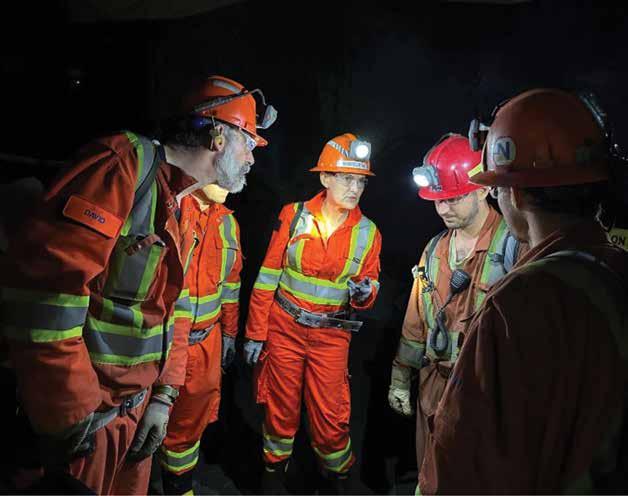
unfortunately, I believe that ego frequently influences decisions, rather than relying on critical thinking to find solutions to the challenges we face. This approach has not served our industry well over the years. And that is very different at Newmont. I think that’s the one thing that I really enjoy. The other thing is we’ve got an embarrassment of riches at Newmont. We’ve got really good assets. We’ve got some amazing teams, and we have exciting projects in our pipeline.”
Natascha stated that the company’s top priorities are to leverage its high-quality assets to maximize value for its social, financial, and government stakeholders, while also ensuring productivity and minimizing waste.
“Whether it’s the waste of mineral resources underground, the waste of shareholder funds, or the inefficient use of our team’s time, it leads to unnecessary environmental impact and prevents us from fully realizing value for the countries and communities where we operate, as well as for our investors. This is undoubtedly our biggest challenge – ensuring that we address these issues in a sustainable and responsible way.”
Natascha splits her time between Denver and Brisbane, where her family relocated in 2016. Reflecting on her journey, she said, “Home is where your heart is, and for me, that’s now Brisbane. But my work has taken me across continents, and I’m grateful for the opportunities I’ve had to make an impact globally.”
As she continues to lead as COO of Newmont Corporation, Natascha’s journey serves as a testament to resilience, ambition, and the transformative power of early influences.

Alumni News met with Jocelyne Kane-Berman, 91 year old UCT alumni legend who was Chief Medical Superintendent of Groote Schuur Hospital (GSH) for 13 years. Jocelyne was the second woman ever to take on this senior position.
At the age of 91 Jocelyne still keeps up to date with medical trends, attending seminars and webinars to get CPD points and maintain her medical licence and she also attends the Sports Science gym three times a week.
Meeting with 91 year old Jocelyne was an awe-inspiring experience. Here is a woman who was at the top of her game for many years, a woman unafraid to take on challenges that most would run from. And yet she downplays the impact and influence she had and the fact that she was a groundbreaking woman, who paved the way for other women. Her fearless determination and belief in speaking her mind are reflected in the fact that she was dismissed from her post as Chief Medical Superintendent of Groote Schuur Hospital in 1988 for suggesting in an interview that Nelson Mandela would make a good president of postapartheid South Africa and that Mamphela Ramphele could be minister of health.
Alumni News met with three generations of the family at the interview: Jocelyne’s daughter Gaby Ritchie and her granddaughter Anja Ritchie, both of whom are UCT Alumni. Gaby did her undergrad and a Master’s in Archaeology at UCT and is currently finishing off a PhD, while working as Communication & Marketing Manager in the Faculty of Law at UCT. Anja completed a B.Soc Sci at UCT, followed by a postgraduate diploma in Business Communications,and is currently working as a social media manager. Jocelyne’s son, Mark, attained a B Soc Sci and and a postgraduate diploma in Industrial Relations at UCT, while her youngest daughter
Mandy completed her MBA at UCT’s Graduate School of Business in 2016.
Jocelyne, grew up and went to school in Johannesburg, and headed South to UCT, partly for the freedom from family and because several friends were going to UCT. She was immensely grateful to her grandfather who paid for her fees. She stayed in Fuller Hall residence, which she describes as a wonderful place, centrally located on campus, where she met and made good friends and thoroughly enjoyed her time there. Although she did comment that she was often in trouble for coming in late and other minor misdemeanors, which meant that she was sometimes summoned before the House Committee and gated! She met her husband to be Bill, in the first two weeks of term… he was in Smuts Hall and was studying architecture. She and some friends went to Architecture School “to broaden their horizons” and met Bill there. Smuts and Fuller arranged dances most weekends and the swimmng pool was a great attraction with the team swimmers and water polo players much in evidence – Bill was one of them. Jocelyne and Bill also played tennis regularly on Sundays in later years and had a very busy social schedule.
When asked why she studied medicine, Jocelyne commented that her father was keen on the idea and she thought it would be a challenging course to follow. She was initially attracted to the laboratory and scientific subjects, as she wasn’t sure if she was keen to deal with patients. She
didn’t particularly enjoy the first year courses of her MBChB, including Chemistry and Physics, however when it got to second and third year, she found the medicine related courses more interesting and stimulating. Jocelyne was one of only ten women in a class of 110 – and enjoyed most of her classmates making good friendships that lasted many years.
Marriage and first medical posting
The day after graduating with her MBChB, Jocelyne got married to Bill, with a reception at the Vineyard Hotel. She commented that she had waited six long years for that day!
Her first post was as an intern at Rondebosch Cottage Hospital, followed by six months in paediatrics at Groote Schuur Hospital which she really enjoyed because she had a very good teacher. Thereafter, she and her husband moved to the UK where she worked as a senior house officer and registrar at Whipps Cross Hospital. She explains, “We went to the UK because my husband had got a position there and I decided I would embark on my training to become a paediatrician, but it was a lot more difficult than I had anticipated to get a training post. I was travelling to hospitals outside London to run clinics but it wasn’t very satisfactory. I was raw as a clinician and there were no teachers. I would be sent out to places where there was nobody but me as the expert. So eventually I got a post as a pathology registrar – which wasn’t in my plan but I was also able to register as a student at Great Ormond Street and obtained the Diploma in Child Health. After our son Mark was born, we came back to South Africa on a Castle liner, which was fun - we danced up a storm most evenings on the ship!”
On their return to South Africa, once fully settled in Cape Town, Jocelyne had three more children, all girls. Jocelyne, was doing lots of part time work, including sessions at Red Cross Hospital, where she throughly enjoyed working with children. She was planning to specialise in paediatrics, however HannahReeve Sanders (who was the first ever female Chief Medical Superintendant of Groote Schuur Hospital) asked her to join her in running the Society of Medical Women. This group played a significant role in looking at where women were put to work, how they got to the areas where they work and what recognition they received etc.
While working with Reeve Sanders their relationship developed and they became good friends and colleagues. After some time, and with encouragement from Dr Sanders, Jocelyne settled into Groote Schuur Hospital, working as a medical superinendent, which she really enjoyed. She comments, “I was new, young and enthusiastic and got involved in interesting projects, such as the computerisation of the medical record where I was the chairperson of the Computer Advisory Committee. There was always something challenging to do and I enjoyed the admin”. Not one to shirk from challenges, Jocelyne became involved in the planning and commissioning of the new Groote Schuur Hospital. She found this stimulating and rewarding and enjoyed the multiple new challenges, such as medical informaticsinstalling computers in the wards and setting up systems. “It is easy to stagnate and I was always willing to try new things,
whether I knew anything about it or not. I had a hunger for knowledge: to learn, grow and expand my horizons. The academic input and taking on the challenges made my job very rewarding and I was able to register as a student and was awarded an MA for my thesis on Hospital Administration”.
When Reeve Sanders was promoted to a senior role in the provincial government’s Health Department, she recommended that Jocelyne apply for the vacated post. Jocelyne received encouragement and support from her male colleagues and was appointed to the position. “I enjoyed being chief medical superintendent – there were so many challenges and opportunities and it was so rewarding to see the difference that could be made. We had a big team – there were six or seven of us and we worked well together, finding solutions to problems”. She describes lots of engagement with unions, standoffs, striking staff, and police as some of the challenges in the 80’s.
The two biggest projects Jocelyne was involved in at Groote Schuur were the computerisation of the medical records and the planning and commissioning of the new hospital. Medical informatics and computerisation meant travelling to see best practice in other countries, bringing the system into the hospital and getting it accepted by staff and figuring out the best way to manage complexity. The planning of the new hospital she found exciting and rewarding. Jocelyne comments, “For the most part, the job was enjoyable. People were cooperative and it was a great hospital to work in”.
On being removed from her post as Chief Medical Superintendent
“In 1988, I suggested in a newspaper interview that Nelson Mandela could be president of post-apartheid South Africa and that Mamphela Ramphele would make a good minister of health. I was immediately dismissed from my post as Chief Medical Superintendent and sent to work in Bellville. The day I was dismissed was the most miserable of my career, however the medical school and my colleagues supported and backed me completely and were outraged by this action of the apartheid government. I had to just get on with things and do my job well. I embarked on an intense and lengthy legal battle and after two years, while ‘standing on the court steps’, we won the case and I was reinstated to my position, to my great delight”.
Business Woman of the Year award
While chief medical superintendent, Jocelyne and her team implemented budget saving strategies at the hospital. There was never sufficient money to run the hospital and they allocated the departments’ budgets and requested them to prioritise their needs, shedding what was’t critical. “I was awarded Business Woman of Year award in 1991 for budget saving strategies at GSH. At the award ceremony, I felt somewhat out of place – the other women were much more sophisticated than I was and they were definitely much better dressed!”
Powerful women in the family line
Jocelyne’s friendship with Reeve Sanders clearly impacted her bold approach to taking on the role of chief medical superintendent. Along with that, Jocelyne comes from a line
of trail blazing women – her grandmother (her father’s mother) was chief commandant of the Red Cross Society. She says she grew up with the image of groundbreaking women who did a whole lot of good things and got an organisation going – had an impact. I thought it would be satisfying and rewarding to do something like that.
Gaby, Jocelyne’s daughter describes her mother as an impressive powerhouse of a woman, who is forthright, nononsense and doesn’t suffer fools. She comments, “When I was in high school, my mother would be up working late at night on her Masters degree in Public Administration. When I was a student and admitted to Groote Schuur hospital by ambulance after a motorbike accident and soccer injury, I would phone Mom and say ‘I’m fine but I’m coming to GSH in an ambulance’. The staff would have to call Mom out of meetings to come and see me, her daughter as the patient.”.
What was it like to be working in a very male dominated environment
Jocelyne downplays the fact that she was a maverick and groundbreaker making great strides as a woman in her field and appears to be more impressive to her children than to herself. She comments, “I just got on with the job – it didn’t occur to me that I couldn’t do things because I was a woman. I had great support from the Dean and most heads of departments and I was always treated as an equal. I didn’t ever have to compete as a woman against the men. I was just part of the group. I didn’t experience the ‘no’ and closed doors. I owed so much to most of the men I worked with – they were always there for me and supported my application for promotion.
Health care had been separated along apartheid lines, however Reeve Sanders refused to segregate the wards in the new hospital and embarked on changes to ensure the new wards were integrated and I continued that. She didn’t interfere with what I was doing and always supported me.”
Jocelyne spent two terms on UCT’s Council and was one of the few people who read every document and was always well-prepared for meetings, asking questions and not letting anything slide by. She commented that she found the issues for debate interesting and enjoyed the interaction with other council members.
William Ritchie (Bill) – Jocelyne’s husband and an influential part of UCT’s architechtural history
Jocelyne’s husband Bill qualified as an architecht at UCT and really enjoyed working in the field and went on to become a partner at Revel Fox Architects. Like Jocelyne, he was also very much at the top of his game, becoming president of the Cape Institute of Architects in South Africa. He was part of the team responsible for the design of the Kramer Law Building (then the School of Education), the Woolsack Residence complex and the old Neville Alexander building on UCT’s Upper Campus, and for upgrading the Breakwater Prison into the UCT Graduate School of Business.
When asked how they both managed busy careers and a big family, Jocelyne said that she and Bill were very supportive of each other’s careers and that they tried to ensure that important

family and work responsibilities were properly attended to and managed to make time to socialise and go to parties.
Life outside the hospital
“My husband Bill and I were very sociable and loved parties and dancing. For the last four or five years while still at GSH, every time we went out to dinner, we and our friends would end up dancing. Much of our social life was dedicated to having fun”. Gaby, one of Jocelyne’s three daughters, describes how the children used to line up and watch their parents leave the house to go out dancing on a Friday or Saturday night.
When asked how she liked to relax and how she dealt with a very demanding career, Jocelyne recounted how their family holidays in Sedgefield, and taking four weeks off provided the respite needed to some extent.
Gaby describes how their home was a very engaged and stimulating one to grow up in. “The family sat around the dining room table in the evenings and supper would go on for a long time. My parents would talk about their day. Groote Schuur Hospital and medical school were very much part of our lives growing up – we knew the names of all the professors and the goings on in the building . My father would draw diagrams on his cigarette box. Friends would come round to fetch us and sit around the table having discussions. My mother and I would have fantastic arguments – I would think – I have got you now –and my mother would come back with a great argument”.
Anja, Jocelyne’s granddaughter describes her grandmother as a maverick and groundbreaking and inspiring leader. When Anja was accepted to study at UCT, Jocelyne was the first person she phoned to tell the good news to and she was at her first graduation at UCT. She describes how her friends have such admiration for her grandmother and find it amazing that her grandmother not only went to university, but had such an impressive career.
What an inspiration to meet someone who had a remarkable impact, was not afraid to speak out against injustice and led a huge hospital with such grace, courage and lack of ego! And to see the trickle down effect in her daughter and granddaughter!
The “200 Young South Africans” awards, presented by the Mail & Guardian, is avn annual recognition event celebrating the achievements of young South Africans under the age of 35 across various fields. The awards celebrate the dynamic and

Category: Entrepreneurship
Organisation/Company: Splash
Coatings Africa
Profile: Bonga Masoka, 33, is the founding director at Splash Coatings Africa, one of South Africa’s fastest-growing paint brands, an affordable premium paint manufacturing, retail, applications and services company. Bonga who was raised by a single mother who sold food on the roadside and died before she could build a home of her own, completed his BSc at UCT. His motivation is to provide his family and the company’s employees with more choices in life, such as where to live, their children’s education, healthcare and security. His initiative
One Bucket Splashed Dreams, renovates grade one classrooms in Soweto. “I made an intentional decision when I started the business seven years ago to build a brand that stretches beyond “just paint” to one that embodies the belief that everyone deserves a home that allows them to dream in colour.”

Category: Film & Media
Organisation/Company: GroundUp News
Profile: Daniel Steyn was one of the journalists at GroundUp who broke the Thabo Bester story in 2023 that sent ripples through the nation. Daniel has co-authored a book, titled The Thabo Bester Story, and consulted on a Showmax Original docuseries called Tracking Thabo Bester. Daniel who has a BA Honours in Film and Television studies from UCT, is currently working on his second book. His academic background in film and television studies has also enabled him to direct two episodes of the Showmax Original docuseries The Illuminated, which explores alternative and often controversial religious movements in South Africa. Daniel is motivated by investigating issues in South Africa that expose how decisions made by powerful people affect the most vulnerable, and uncovering truths that result in holding powerful figures accountable for their actions. “Breaking the Thabo Bester story has been the highlight of my career. The months of following and exposing Bester’s escape from prison were a whirlwind. I learnt a lot about investigative journalism, the daily choices one makes that impact a story – from the questions you ask sources and the places you look for information, to what you decide to put in the article and what you decide to leave out”.
promising future of South Africa, driven by the energy, creativity, and dedication of its youth. UCT is proud to have so many of our students and alumni recognised for their talent and dedication in their fields.

Category: Arts & Entertainment
Organisation/Company: Self-employed
Profile: Dalin Oliver, 35, completed a BA in Politics, an Honours in History and a Postgraduate Certificate in Education, at UCT. He completed a five-city tour of Australia, where his solo show, 90 Day Comedian won a Best Weekly Comedy Award at one of the world’s biggest Fringe Festivals in Perth. Dalin is preparing for his next comedy stint in six countries and 14 cities in England, Ireland, The Netherlands, Germany, France and Spain, which is self-managed, -produced and -funded. Dalin previously starred in the South African actioncomedy movie Finders Keepers, and also hosted numerous online shows including Late Tackle with the Springboks. Dalin’s comedy is inspired by his experiences as a South African. “Having worked across the country and performed for audiences from all backgrounds and walks of life, I’ve learned the power and beauty of comedy in allowing people to find humour in the best and toughest of times. As South Africans we love laughing and find the funny in any situation. My job is to find the funny in every possible situation and bring laughter to the Mzansi and the world.”
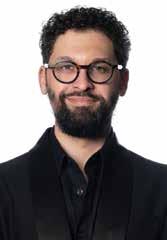
Category: Arts & Entertainment Organisation/Company: Joburg Ballet
Profile: As the chief executive of Joburg Ballet, 34-year-old Elroy Fillis-Bell oversees everything from its finances to its development programmes to staff well-being. He has learned how to create a working team culture by carefully observing the way others do things and focusing on mutual respect when dealing with his colleagues. Elroy has an Honours in Drama Education & Theatre Directing from UCT. He is proud of the collaboration with the team to stabilise the Javett Art Centre at the University of Pretoria in the period just after the Covid pandemic. Together they were able to steady the organisation in a period of great uncertainty, partly by experimenting with building new and strong revenue streams at the same time as providing accessible and community-focused educational programming. Elroy says that the youth have no option but to take up the reins in running every aspect of South Africa – from politics to social development to artistic innovation – and be the change they want to see in this world.

Category: Legal Services Organisation/Company: Splash
Coatings Africa
Profile: EEmogine Bohitile, 26, who has a Masters of Law in Intellectual Property Law from UCT, is a candidate legal practitioner at ENSafrica, the biggest law firm in Africa, responsible for legal drafting, research, trust registrations and estate administration. Emogine was a recipient of the Golden Key International Honour Society medal for being in the top 15% in the Master of Laws in intellectual property law in her year. Golden Key is a global network of high achievers committed to academic excellence, leadership development, and making a difference in the world. She is curious about how technology, especially data and new innovations like AI are changing the dynamics in the world. “The challenge of navigating complex legal landscapes and safeguarding innovation inspires me. Knowing that my efforts protect creators’ rights and promote fair use of technology keeps me striving for excellence,” she says. From these experiences, I have learned the importance of perseverance, continuous learning, and the value of being part of a supportive and ambitious community. These achievements have reinforced my belief in striving for excellence and making a meaningful impact in my field.

Category: Business Organisation/Company: Future Forex
Profile: Harry Scherzer, 31, who has a BBusSc, Actuarial Science from UCT, co-founded Future Forex in 2020, and with his business partner has grown the company to a team of more than 70 professionals across the country. As chief executive, he leads Future Forex’s growth, business development and strategic direction, while building relationships with clients and partners. He is proud of the success of Future Forex’s crypto arbitrage investment product, which has processed more than R25 billion, resulting in about R290 million earned by clients. One of the Future Forex initiatives Harry is excited about is its online forex platform, which is aimed at enhancing the way businesses and individuals transfer money into and out of South Africa. He aims to develop new products and solutions that not only advance the financial services industry, but enhance transparency, efficiency and service delivery. The youth are the future leaders and workforce, so Harry believes investing in their education, skills development and entrepreneurial aspirations is vital to boost economic empowerment and sustainable development. Their crypto arbitrage continues to significantly outperform traditional investments, such as the JSE All Share index or the S&P 500. “We have been able to deliver exceptional returns for our clients. It is immensely rewarding to see how many South Africans we’ve been able to assist in boosting their investment portfolios” said Harry.

Category: Business Organisation/Company: Sanlam
Private Equity
Profile: Preparation gets you through half the battle, and perseverance gets you through the rest. This motto has sustained Gift Pule, 32, through his career, especially when he decided to change his career from medical research to finance and asset management. Gift has a BSc (Human Genetics); BMed Honours and PhD in Human Genetics from UCT. As a private equity principal at Sanlam Private Equity he invests in well-established mid-market companies. After investing in SkipWaste, Gauteng’s largest waste logistics business was able to increase its waste diversification from below 30% to 50% in just three years. In the past four years, he helped put R1.5 billion in equity risk capital into medium-sized local businesses, sustaining jobs in several sectors and growing them in others, generating returns for his investors.
“Through my job at Sanlam, I was appointed to the board of several investee companies, which assisted companies such as the Cavalier Group to sustain over 1 400 permanent jobs during the peak of the pandemic, as well as increasing employment to 1 850 since 2020. I also oversaw the implementation of the diversification strategy into quick service restaurants, as well as driving environmental and social impact through efforts to reduce water usage, reliance on electricity through investments into solar alternatives and improving recycling to over 60% of input packaging materials.”
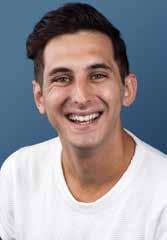
Category: Tourism & Hospitality Organisation/Company: LIFT Airline
Profile: Haydn Henning, 27, is the brand manager at airline company Lift, responsible for executing the personality of the airline by ensuring it is consistently presented across all channels of advertising, marketing, social media, and customer communications and stays ahead of the trends. He is the driving force behind the “upLift SA” programme which aims to uplift South Africans by providing them with opportunities and a platform to excel. This programme has allowed thousands of South African artists to not only get from point A to B across the country, but has also give them a physical platform to showcase their talents.
In partnership with Proudly South Africa, Haydn held a fashion show on a flight where the country’s top and upcoming fashion designers presented their newest collection. He also hosted two silent discos on a flight, the first one launched the career of Divine Mahara and the second with Zolani Mahola. In collaboration with Zolani, he produced the Lift Anthem, a song of hope for South African children. Hayden, who holds a Bachelor of Music from UCT, blended his passion for music and aviation to inspire others to dream beyond their qualifications. Along with artists, he is constantly looks for ways to support local industries and ensure that passengers are exposed to South African brands.
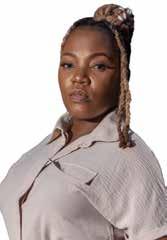
Category: Business Organisation/Company: Rothko Brand Partners
Profile: At 33, Inam Qoma is the chief executive and co-owner of Rothko Brand Partners. Her job involves helping people and organisations achieve business goals through strategic content marketing. She oversees the strategy, creation and execution of tailored campaigns across diverse industries, including education, sustainability, finance and research. She uses her experience in strategic communications to help business-to-consumer and business-to-business entities, as well as corporates and nonprofits, achieve their objectives. She also drives Rothko’s commitment to social responsibility and inclusivity, championing young Africans.
“The lessons I learned are the importance of backing yourself, being proactive about creating opportunities and not being afraid to take calculated risks. After approaching the founder of Rothko Brand Partners about becoming a shareholder at just 26 years old, I stepped up as CEO in March 2024 at the age of 33.”
Inam has a Bachelor of Arts in English, Media Studies, Film & TV Studies from UCT.
I’m also immensely proud of the brands we’ve worked with, such as The Allan Gray Centre for Africa Entrepreneurship, The Nelson Mandela School of Public Governance and Oxford University Press Southern Africa. Helping them create meaningful content that drives awareness and engagement on critical topics shaping our future has been incredibly fulfilling. This journey has reinforced the power of storytelling to drive positive change.

Category: Technology & Innovation Organisation/Company: Discovery
Profile: Jess Rees, 29, who has a Bachelor of Business Science from UCT found her niche as a lead data scientist for Discovery, heading up a team that researches, develops and implements machine learning, data science and AI solutions. She also works with natural language processing models, to maintain customer service excellence.
Jess and her team are working on a project called Research and Development of the use of Large Language Models for use in operations and have prioritised science and responsibility in their approach, evaluating the AI to make sure it is working accurately and safely.
I have learned that if you are investing in an approach that you truly believe is better and safer, even if it feels like you’re going a bit slower at first, that investment will pay off and you will soon be moving both faster and in a way that is aligned to your values. I have also learned that listening is often more important than speaking and getting input from and debating with many knowledgeable (and strongly-opinionated) people can only benefit your work.
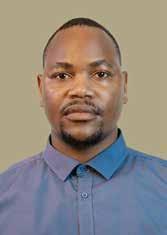
Category: Film & Media Organisation/Company: University of Cape Town
Profile: Information sharing is at the centre of Itumeleng Mpofu’s work. He has a BSocSci and Diploma in Library & Information Studies from UCT. He is responsible for archiving institutional research, open educational resources and electronic theses and dissertations. He is involved in the African Platform for Open Scholarship, which contributes to the growth and development of local research, fostering advancement in African society. Itumeleng founded Break It Down, a social media platform that simplifies complex political, economic and social issues. It is a tool for social activism, utilising social media to engage directly with the youth, educating the public and inspiring social activism to foster active citizenship. Some videos have reached over 10 million views. He said, “The unanticipated reach of Break It Down has been a significant lesson in the power of digital media, showing that there is a tremendous hunger for well-researched, accessible information, and that digital platforms can be incredibly effective in fostering informed and engaged communities”. Itumeleng also co-founded I Care SA, where he is responsible for writing recommendations for the parliamentary committee to ensure policies reflect the needs of citizens, particularly those from marginalised communities. As a member of the Wikipedia Chapter of South Africa, he focuses on expanding its reach to township schools to promote educational equity and enhance social justice.

Category: Technology & Innovation Organisation/Company: Botlhale AI
Profile: Sange Maxaku is the co-founder and chief product officer at Botlhale AI. The BSc Electrical and Computer Engineering graduate from UCT heads up product development, focusing on creating solutions that seamlessly integrate African languages. This involves researching user needs, designing user-friendly interfaces, developing code and overseeing the implementation of the company’s languageinclusive product suite. He is currently overhauling Botlhale AI’s chatbots. “We are integrating powerful large language models to enable more natural and engaging conversations,” Sange says. Two things that inspire him are bridging the digital divide caused by language barriers in Africa and the potential for AI to drive positive change. He comments, “Developing our flagship product – a no-code chatbot-building platform that enables businesses to easily create and deploy chatbots in South African languages across various social media channels, all without needing coding skills was very rewarding. We initially focused on a one-size-fits-all approach, but user feedback revealed a strong need for customisation and personalisation. This taught us the importance of iterative design and user-centric development in creating successful technological solutions”.
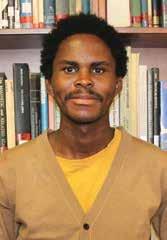
Category: Education
Organisation/Company: Acornhoek
Institute for Science and Technology
Profile: As the director of the Acornhoek Institute for Science and Technology, which he helped build from scratch, Sibusiso Mdhluli, is responsible for overseeing the planning, execution and evaluation of all projects, ensuring that they promote science, technology, engineering and maths education and digital skills training in rural areas. He helps develop new projects to support high schools and to provide digital skills training for unemployed youths. Sibusiso, who has a BSc Honours in Physics and Astronomy from UCT, is instrumental in organising science clubs at local schools, maths competitions, summer school for grade 11 pupils and web-development bootcamps. He says that growing up in a rural area, he faced problems of limited resources and information. “These experiences instilled in me an understanding of the obstacles young people face, and this fuelled my determination to make a difference.”
He has successfully raised funds to support various projects, enabling them to run impactful programmes that focus on science and maths education in rural high schools. Through their work, many high school students from rural areas have improved their proficiency in science and maths, enabling them to attend and graduate from tertiary institutions. He comments, “Our initiatives have made significant contributions to the community, addressing educational disparities and fostering a culture of learning and development in rural areas”.
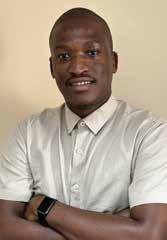
Category: Energy Organisation/Company: Reonet
Profile: Tshilidzi Samuel Ramunenyiwa, is a project energy engineer at Reonet, which focuses on smarter management of water and energy resources. He is responsible for conducting energy audits and designing, developing and implementing energy-efficient systems. He collaborates with cross-functional teams to integrate renewable energy sources and optimise existing systems. He is proud of the rollout of inverter battery systems at rural health clinics in the Western Cape at the peak of load-shedding. He learnt that adaptive problem-solving and engagement with and understanding a local community’s needs is essential for the initiative’s success. The experience underscored the positive effect of sustainable energy solutions on public health and community well-being.
Tshilidzi, who holds a BSc Electrical Engineering from UCT, is involved in initiatives crucial for the advancement of renewable energy adoption, including the City of Cape Town’s independent power producer programme; the rural primary healthcare hybrid inverter initiative; the Western Cape department of health’s Race to Zero climate change plan; and the implementation of solar photovoltaic systems at health facilities.

Sthabile Kolwa
Category: Education Organisation/Company: University of Johannesburg
Profile: Thirty-five-year-old Sthabile Kolwa, who completed her BSc and BSc Honours in Astrophysics at UCT, is lecturer in the physics department at the University of Johannesburg and is responsible for curriculum design, teaching and running undergraduate physics and honours-level astrophysics modules. She is also doing research involving galaxy formation and cosmology. “I learn about how galaxies have evolved over the known universe’s existence,” she says. Her job involves publishing her research in journals and giving talks on it at department seminars and astrophysics conferences.
Sthabile, who has a PhD from The Ludwig Maximilian University of Munich, communicates concepts and discoveries in astronomy in online articles and also focuses on women and non-binary people who have been effective in the science, tech, engineering and maths fields. She says a challenge has been social isolation in terms of gender and race. As chair of the early-career science committee of the African Astronomical Society, Sthabile is involved in efforts to raise funds for master’s, doctoral and postdoctoral students, for equipment and research-related travel.
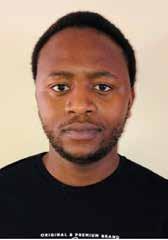
Category: Technology & Innovation Organisation/Company: Council for Scientific and Industrial Research
Catalysis Society of South Africa
Profile: Zama Duma is working in the fields of catalysis and materials science, which are changing how we power the world. In his work for the Council for Scientific and Industrial Research, he is converting carbon dioxide to green methanol and other useful products such as feedstocks for the petrochemicals sector. He also works as a media officer for the Catalysis Society of South Africa. He’s part of the Green Methanol Corridor Blueprint Project, which aims to localise decarbonised methanol production in the Vaal and has the potential to create over half a million jobs., Through working on this project, he’s learned the importance of conducting research that has socioeconomic benefits for all.
Zama who is currently completing his PhD in Chemical Engineering at UCT, says the green methanol project where carbon dioxide and renewable hydrogen are converted to green methanol, is his proudest work. This has many uses in maritime travel and in the production of formaldehyde, biodiesel and various other value-added chemicals that are key to the global economy. The Blueprint Project by Green eFuels Producers will result in the construction of a plant with a capacity of 17 500 tonnes per year of green methanol from sewage sludge and renewable hydrogen. The Blueprint project is earmarked to create up to 600 000 jobs in the Vaal Special Economic Zone.
Breast cancer researcher and awareness activist, advocate for improving educational and emotional support for students and finalist in Miss World South Africa pageant.
Alumni news met with UCT alumnus Jesmika, a dynamo currently juggling multiple roles - working on a PhD in breast cancer research, advocating for educational support initiatives for school children, content creator, brand ambassador, tutoring and recent participation in Miss World South Africa. Whirlwind Jesmika is inspirational, determined, passionate, a perfectionist not afraid of taking on big challenges.
Tell us about your studies at UCT and what made you choose UCT?
I love Cape Town and my sister was living in Cape Town, but the tipping point was that I knew I wanted to study breast cancer from the angle of human genetics and the UCT human genetics division and researchers who work at UCT are world renowned. Growing up, I always wanted to go to UCT, but when my mom passed away, it took a while to get back into the swing of things, so I stayed in Durban for my undergraduate degree. My honours year in Human Genetics at UCT was great – we had a good support system, Following this, I had the opportunity to complete my Masters in the Professor Stefan Barth lab that focuses on Cancer Biotechnology and Immunotherapy. The insights gleaned from working with Prof Barth have been invaluable. I grew as a scientist, and on a personal level.
The rollercoaster ride of your Masters
My masters’ years were really challenging. Initially I thought I would finish my masters in a year but when I got to the end of the year, my supervisor said that I needed to continue and do more experiments. I had dips in my mental health and experienced stress, living far from my loved ones in Durban. I am so passionate about the work that I do, I put everything into my research, working crazy, long hours – sometimes finding myself in the lab at 3am in the morning! But then I
received 93% for my thesis, which is relatively unheard of and this completely shocked and delighted me. What I’ve learned through this experience is that if you keep persevering and moving forward, working hard at something you care about, you can achieve and get to the level you dreamed of. It is always very hard before it gets easier. Once you overcome this hurdle, you will be extremely proud of yourself.
You have been involved in many outreach initiatives over the years, tell us about some of those?
During my high school years, I struggled with confidence and at the time that my mother passed away, I wasn’t doing well in mathematics. I started working with a tutor and encouraged me and this ignited an interest in mathematics for me. This inspired me to work on my own and I started helping my friends who were struggling with their work. My teacher noticed this and that my marks were increasing and suggested I apply to be a tutor, which I did and after a few months I became head of mentors because I was so invested in seeing others development.
When I was doing my undergrad degree, I started an organisation called Women for Change – providing support to university students around the country for their commute to campus, advice or emotional support for goals. While at UCT I tutored at James House in Hout Bay. Being with the children was a breath of fresh air and a welcome break from my studies. There was a young boy I met there who was extremely introverted and wouldn’t ask or answer questions because others made fun of him. Every day I would engage with him on his own and motivate him and give him space to ask questions. Slowly I saw the transition as he gained confidence and learned to speak up. Seeing the change in him was a special moment for me and made me realise why I enjoy tutoring – it is not just about the educational support and teaching skills, but it is about providing emotional
support and building confidence. During my Masters year at UCT I was involved in mentoring students within my research lab. My supervisor brought many international students to the lab and I mentored students from France, Germany, Belgium and many other countries, which I enjoyed.
I have also been involved in a project in Durban sponsored by Inqaba Biotech, where we give out hampers that cater specifically to the needs of the children. It is also a stationery drive where I want to promote the idea of working hard and getting into STEM careers. I believe that without access to the basic needs and necessities for school, students can’t focus and reach their full potential. These hampers included educational support through stationery, sanitary pads, and food and emotional support through toys, underwear, socks and sweets. We are currently working on expanding this initiative and making it a longer-term initiative,
I have been amplifying my projects ‘Bright Futures’ by joining my passions for the educational and emotional support to school students and breast cancer awareness. This has entailed giving motivational talks, speaking about my personal journey, educational talks on pursuing careers in STEM and breast cancer awareness. I have been able to partner with organisations like Breast Health Foundation (assisting them on awareness programs, access to equipment and support), Mina Foundation (providing students with free menstrual cups to alleviate period poverty and reduce the impact of menstruation on access to education), NPO BRCA SA where I show people how to do breast exams and how to access free care packages for individuals who have been diagnosed. At Padel4Good, I hosted a padel tournament in support of breast cancer awareness. I wanted it to be a space where individuals could come together as a community to offer support to each other and talk about their personal experiences. I set up a box where people could write anonymous letters to lost loved ones or about their personal triumph over the disease. I aim to host these tournaments going forward to continue raising awareness and affording people an outlet to talk about their experiences, losses and triumphs of either dealing with cancer themselves or seeing a loved one deal with it.
What made you decide to enter the Miss World South Africa pageant?
It has always been a dream of mine to do modelling and enter a pageant. There is a video of me, aged five, modelling on the side of a pageant that my sister was doing, because I was too small to enter!! However, for a long time, I have wanted to make a difference and impact the world around me, but didn’t know how to achieve that. I saw the Miss World South Africa platform as one of leadership that could catapult initiatives like mine and bring awareness for issues that are pressing and affecting South Africans. I entered the pageant specifically because I liked their focus and the ultimate impact that they have on our

country. I want to drive awareness and support for breast cancer as well as champion the need for improved educational support for children, thereby being a change agent who can kickstart initiatives to influence the world around me. I have dedicated my career to improving the lives of breast cancer patients and been a tutor to students for more than eight years because of how deeply I care about the educational and emotional support of school students. Truthfully, in the time I spent as a finalist my initiatives and reach grew exponentially higher than I could have ever dreamed. Through my work I want to impact policy changes, raise awareness for my causes and have a lasting impact on South Africa and the world.
The Miss World organisation is amazing– they promote the idea of beauty with a purpose and provide a platform for you to make a difference in people’s lives. They saw me and valued what I could offer with my project and they saw my physical side and didn’t worry about the fact that I am not tall. Their focus is on empowering women, encouraging leadership, bringing other women into the leadership space and giving them a voice. My involvement in the pageant was not just about my beauty with a purpose project. I deeply wanted to bring awareness and change for causes important to me, but I also want people to

see my story and realise that you can forge a new path, regardless of what has been done before. For me, entering this pageant was essential because I know people of all ages use their insecurities as reasons not to take on their dreams. My insecurity was that I wasn’t as tall as previous pageant entrants, but I used that as my strength- it made me unique and stand out. My being on the stage, breaks records. I wanted my story to be seen as a stepping stone for other people to see that so much is possible with self-belief and a lot of big dreaming. I believe that everything we do should be built on- that is how we grow as a society.
Tell us why you are embarking on a PhD to design a dedicated South African cancer consortium?
I have dedicated my life and career to finding more affordable and accessible treatments for breast cancer through research. I am currently embarking on a PhD at the University of KwaZulu Natal: one of my supervisors is from there and the other is from UCT and my research and lab work will take place across both universities. The PhD is aimed to have a lasting impact on South African patients. My supervisors are a female-led team comprising Prof Colleen Aldous (UKZN), Prof Sharon Prince (UCT) and Dr Tarryn Wilmer (SAMRC), who are spearheading the idea of a cancer consortium.
My mother was diagnosed with stage four breast cancer when I was ten years old and passed away when I was fifteen years old. I saw the progression and how the treatment took a toll on my mom. I didn’t know what the treatment was for, but I knew that she was constantly trying different treatments, and nothing was working. Watching my mom’s deterioration and having a keen interest in science, I knew that I wanted to make a difference and wanted to stop or prevent any other family going through what my mom went through. I knew I wanted to work with, and hopefully cure breast cancer. Working in the field for a few years now, I have realised that breast cancer is not just a single thing and that I need to shift my goal to tackling breast cancer from
different angles. So now I am looking at it from different fields of human genetics, biotechnology, cell biology and epigenetics. I want to make breast cancer treatments more accessible and to bring awareness so that people don’t have to get to the point of diagnosis at late stages. Early detection can truly save lives, so we need to be doing monthly screenings- everyone, not just females.
The cancer consortium is important as we see, on many levels, that research in isolation has little impact. We need to come together as researchers, breast specialists, oncologists, radiologists etc.- all with differing backgrounds and specialities and put our understandings and findings together in order to create lasting impact. Consortiums like this, can propel our understanding and handling of breast cancer in South Africa and the world to a new level.
Any advice / encouragement to current students from the lessons you have learned?
Follow whatever you’re interested in and passionate about. The path you are on is not necessarily the path others are on. You can do everything you set your mind to. You can be a model, you can enter a pageant, you can be a mentor/ tutor, you can do research, you can save lives, you can be a science communicator. You can do different things, but you need to find your stepping stones that lead you in the direction you want to go. Find your motivation and believe in yourself wholeheartedly- regardless of what other people think you can and cannot achieve. What you are currently achieving is not your limitation, your limitation is how high you believe you can go. Always go out and try things in life – you miss all the shots you don’t take!
You will encounter struggles along the way – like I did with my Masters, which took its toll on me. But then I received my results and was accepted into the Miss World pageant. I realised that the struggle and suffering along the way made overcoming those hurdles more rewarding. When you are going through something really tough, often waiting for you on the other side of the tough times, is something better than you could ever have imagined. So, push through and remember to take breaks, because burnout can impact your life in a big way.
Life is not always an easy cruise: you work hard, try and fail sometimes, pick yourself up and carry on again. The failure motivates you to do better and is a learning experience – it is what drives me. Sometimes the failure means that either it’s not meant for me, or that I need to work harder and put more effort into something. The failure could be leading you to a greater success.
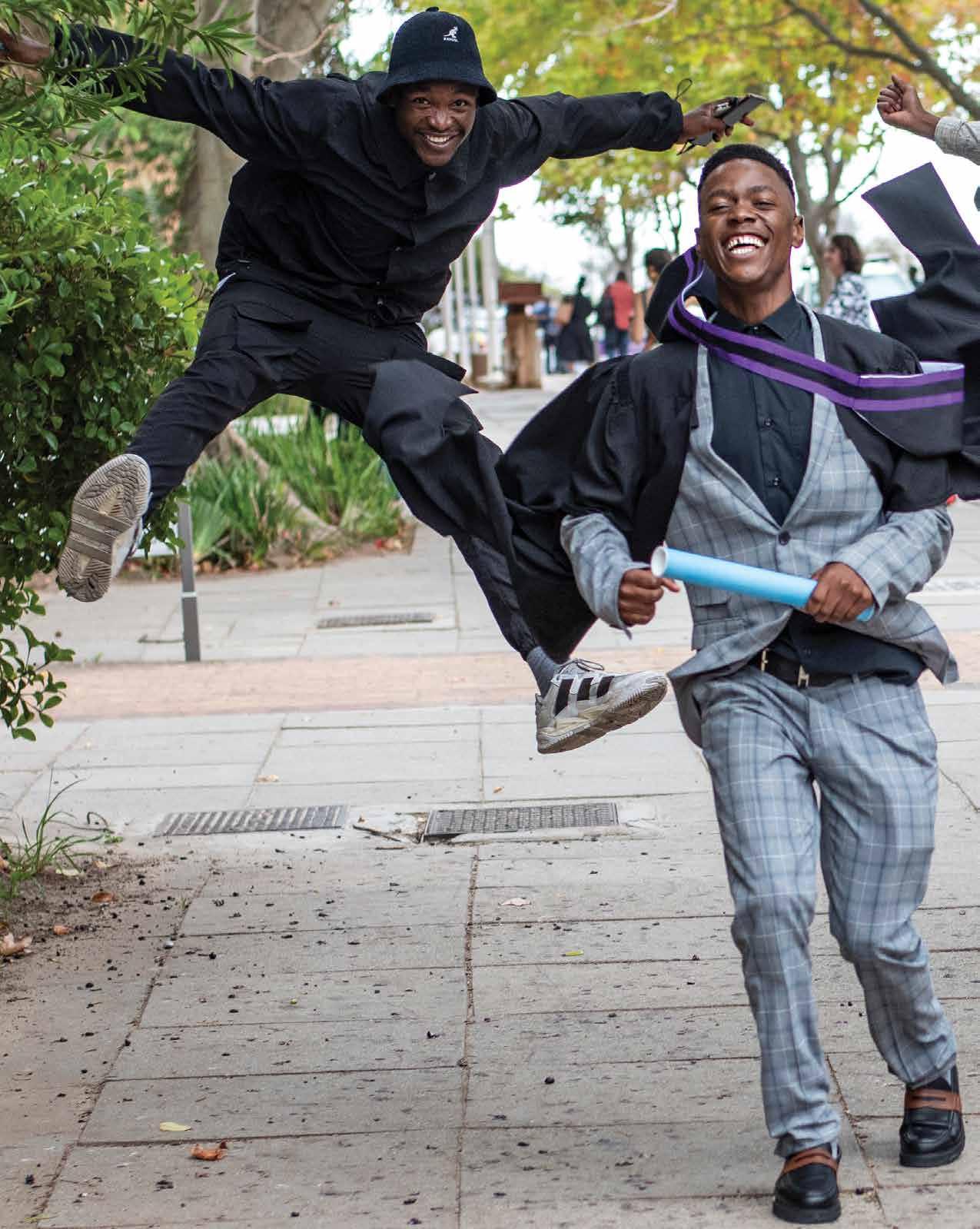


Dr Joan Louwrens has practiced medicine on all seven continents, often in poorly resourced circumstances, or from moving consulting rooms on a ship or bicycle. Here she shares the adventures of her life in the fifty years since graduating from medical school at UCT.
Medicine was a choice, while travel was a passion, which I thought was optional, but soon learned was an integral part of what I needed in my chosen profession.
These requirements were woven through my life, which served up a surplus of surprises. Decisions were often made emotionally, and with undue haste, but the focus was fixed and steady: keep a forward motion, keep learning and keep serving.
Having practiced medicine in such a range of environments, problems that should have been ordinary and easily solved became towering black clouds of despair.
But the joy of solving easy problems in difficult situations and extracting the lessons, potentially to be utilised again, led me to seek out what I started to call “adventure medicine”. This resulted in my having a parallel profession –that of an author. My latest published book entitled A Wilder Life – journey of an adventuring doctor.
Recalibrating my life path
I graduated in 1975 and like most of my classmates, I had a vague plan as to what to do with this medical degree that only now, I realise gave us more choices than we could have ever dreamed of. I thought I wanted to follow the academic route. I enjoyed studying. I wanted to specialise, but decided I would wait a few years to get some life experience. That experience was painful. It included the death of my young husband Peter, from metastatic melanoma at the tender age of 32 years, leaving me as the single parent of two young girls, aged four-and-a-half months and four-and-a-half years. I pulled in my horizons, sent up grateful thanks for my medical degree and resorted to whatever jobs I could find, usually part-time in the early days, which allowed me to be breadwinner and mom.
I was overwhelmed by my status of unchosen single parenthood, and swung between acceptance and angry
rage. This was not in the plan. But I held onto the one obscure advantage, that I could make all the decisions. Dreams I had held since childhood, about travelling to the Antarctic, China and traversing Africa resurfaced, sometimes just to get me through inordinately stressful days.
The other hooks I hung onto were that timing is seldom perfect, and saying YES to an opportunity always yields better results than saying NO. At very short notice, in December 1991, I was offered the job as the solo doctor on the remotest inhabited island in the world: Tristan da Cunha, which is in the mid-Atlantic Ocean. I had ten days in which to get permission for my children to have leave of absence from their school for 6 months, and for myself from my jobs at St Lukes Hospice and the oncology department of Groote Schuur Hospital. As departure day neared, I became overwhelmed at my inadequate knowledge and experience and persuaded some colleagues to give me quick training in spinal anaesthesia and caesarian sections.
Setting off for distant shores
I assembled the contact details of all my specialist friends, being unaware that the telephonic communication from the island was via the ship network of Cape Town Radio and hugely unreliable. It took a very bumpy eight days in a small Danish cargo vessel to get to Tristan de Cunha. I learned something new about myself – that I was pathetically susceptible to seasickness. As we approached Tristan, it became clear that weather conditions were such that landing was impossible.
We had to wait it out in the lee of a nearby inaccessible island and I had two days to get my head right. I may not have been the best doctor in the world for the 300 residents approximately eight days from the closest hospital by ship, but I was determined to give of my best, backed by my solid UCT training. My biggest fear was that I would not be good enough should one of my children fall dangerously ill.

We all survived. There were two births and two deaths, and quite a lot of drama, with asthma outbreaks and the need to medically evacuate a patient with obstructive jaundice. Weather was always a key player. After the six months, I had learned a great deal about myself and my medical ability, and I surprised myself by discovering that I revelled in underresourced, unpredictable, unconventional medicine in wild places. I now had a wandering albatross guiding my course. The foundations for my future path in medicine were laid.
Pursuing a dream of cycling from Cairo to Cape Town
Having gained the stamp of approval from the British Government, my next two island locums were on St Helena Island, again accompanied by my long-suffering children. Miraculously and all too quickly, they emerged as independent, resolute young adults heading off to university.
Recognising that medicine had been incorporated into my DNA, I realized that I needed a sabbatical … time off from the demands of medicine. It was time to reach for my other dream – to travel overland through my own continent, Africa. My husband Pete and I had been planning a trip in our aging Land Rover. He was a

skilled mechanic, but I was not. However, I could keep a bike together and had strong cycling legs. January 2006 saw me in Cairo with a group of like-minded cyclists who had joined an adventure offered by Tour d’Afrique, looking south to our destination of Cape Town. I was not employed as the doctor. Mike, a nurse from the frozen north of Canada who filled that role.
Predictably, when intractable gut-rot ravaged through the cyclists, and heat stroke and dehydration set in, I became honorary medical consultant. I enjoyed the role and soon realised I could practise this kind of medicine, building a new confidence. Could seeking out medical positions on expeditions be a new career?
When I returned from Tristan, I realised that my lack of knowledge and experience in anaesthesia was a handicap if I wanted to work as a doctor in remote places. I embarked on a Diploma in Anaesthetics at 2 Military Hospital, Wynberg, and it was here that I learned that the SA Antarctic programme, serviced by the ice-strengthened vessel the SA Agulhas needed shipboard doctors. Shortly after graduation in 1976, in a rush of blood to the brain, I wrote to the SA Antarctic Programme and asked if I could apply to be the doctor who overwintered on Antarctica at the SANAE base. I was politely informed that females were not permitted in that hallowed space (it was not until 1996 that a SA female, Dr Aithne Rowseis was permitted to overwinter in the Antarctic. Other nationalities had already had females reaching the South Pole). I made sure my name went on the list of potential SA Agulhas doctors and decided that if I could not make it to Antarctica, Marion Island was a good second.
Ships doctor on the SA Agulhas
My trip to Marion Island happened in April 2007, at very short notice. This necessitated my having to find a willing doctor to take over my locum position. Hasty, somewhat ill-prepared departures were becoming commonplace, but my wandering albatross approved as I became the ship’s doctor on the
SA Agulhas as we smashed south through the Roaring Forties. I became an expert in treating seasickness: my own, the 40 crew and the 98 passengers and scientists from all over the world, who comprised the Marion Island team for the coming year. What pushed my medical capabilities to the brink was that after a hurricane, we were the rescue vessel sent to retrieve a small Australian yacht that had pitchpoled, losing one crew member overboard and injuring the remaining three.
Cycling the Silk Route as medical support
This voyage sealed my medical fate. I wanted to work in the Antarctic, Gough Island, the Arctic, and anything with a shoreline in between. But China, a destination often in my dreams, still lurked. Perhaps there are not too many doctors who desire to cycle for nearly 5 months along the Silk Route, but I considered myself lucky when the cycle company with whom I cycled down Africa asked me to be the medical person on the expedition from Istanbul to Beijing. My inadequacies were again highlighted when faced with some infectious disease problems, so on my return I enrolled for the Diploma in Tropical Medicine and Hygiene at Wits Medical School. Knowledge gained assists at the most unexpected times. On my first trip down to the Antarctic ice edge on the SA Agulhas with the famous polar

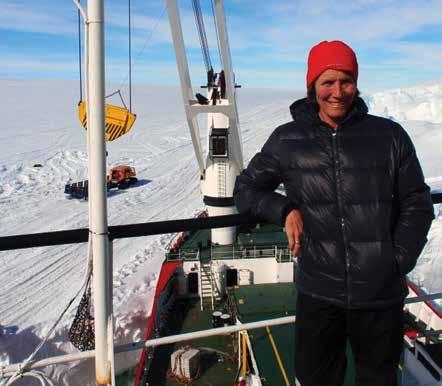

adventurer, Ranulph Fiennes, who was planning to walk across the continent in winter, I was able to diagnose a young trainee crew member with malaria. It was an unlikely diagnosis as we were sailing at a latitude of 55 degrees south, in sight of icebergs, but this young man from Sierra Leone had 12 days earlier embarked with his parasite in situ.
Polar travel in a medical role became an addiction that recently culminated in a north-west passage transit on the world’s largest ketch in August 2023.
Have these adventures given me any special qualifications? A conventional studious road may have yielded better knowledge and been less stressful, but I took the “hands on, unpredictable” approach, and this less travelled road still beckons.

The voice and talents of Sandile Gontsana, whose musical journey began in Gugulethu Township in Cape Town and continued at UCT’s College of Music, has been gracing London’s West end stages for the last ten years in the musical show the Lion King.
Sandile who is a go-getter who grabs life’s opportunities with both hands, developed his musical skills and talent thanks to his grandmother who taught him to love music. He won a Grand West Jazz Idols Competition in 2010 which set the stage for moving on to greater limelight and centre stage performances.
Alumni News: Where did you grow up and what sparked your love of music and singing?
Sandile: Gugulethu is where my musical journey started because I grew up with my grandmother, who taught us to sing. Every evening our family had prayers and my grandmother would ask ‘Who’s going to start the song tonight?’ My Mom, my sisters and nieces and I would sing and that is the way my love of music started. I was singing from a young age and have always been surrounded by music, in school choirs, choral music at church. Every Sunday there would be a gospel show playing on the radio and when I got home from school, there would be music playing in the house. Music was the constant backdrop of my life. AN: And what made you decide to study music at UCT?
Sandile: By the end of my high school years, I was singing in local groups. One of my big brothers, Vuyo Myoli is an Afro-pop singer and I had always done backing singing for him. My friend (Ndumiso Mthombeni) and I both led worship at our church and one day we said to each other, ‘we’re really good at this and we should go to UCT’. I’ve always known about UCT School of Music because of people like Jimmy Dludlu, Judith Sephuma, Tutu Puaone etc. who come from there and around that time I was exposed to their music. I found the jazz style of singing (and playing) that they used, really interesting. Speaking to musicians they all agreed that if you wanted to embark on a career in music, the UCT School of Music was THE place to go – they said don’t go anywhere else. I did my research on the lecturers/ teachers
at the College of Music and I heard that they had so many brilliant teachers, such as Andrew Lilley, Prof. Mike Campbell and Daryl Andrews.
When I applied to study Jazz in 2004, I didn’t get in, because the programme was full. Fortunately for me, I met one of the administrators at the College of Music, Sheila Taylor, who went on to become one of my favourite people. Sheila recommended I apply for African music so that I could still be at the College of Music and switch to Jazz the following year. I followed her suggestion, starting African music in 2004 and I switched to Jazz the following year. There I worked with Professor Mike Campbell, Dr Mike Rossi and my vocal teachers Amanda Tiffin and Abigail Petersen.
My musical journey all started at home, but I think my full-time music career started at UCT. I was influenced and groomed by so many wonderful people who impacted my music. While at UCT I learned not only music, but about the industry, how to put a band together, how to organise a gig, how to write an invoice and all of those other aspects that impact your life as a musician.
AN: And after completion of your degree, what was next for you? Sandile: I took a break after finishing my degree and went to Spain in 2008 where I did some of those Motown tribute shows in hotels for an entire year. And then Angie Scheepers from UCT’s Music School sent me an e-mail telling me that they had bursaries for people who want to do post graduate studies and said that they had thought of me. I realised that I really did want to continue with a postgrad and I went back to UCT.
Postgraduate Studies in Music at UCT
During my time in postgrad, I was one of the lead singers for the UCT Big Band, Mike Campbel Big Band, Standard Bank National Youth Jazz Band (2010 with Prof Mike Campbell and 2011 with McCoy Mrubata) and did work in numerous gigs in Cape Town, including at The Famous Green Dolphin Restaurant in the Waterfront. The wonderful Gavin Minter
used to book me gigs and I got valuable experience while still a student, playing with some of Cape Town’s Finest Musicians. Cape Town had a great jazz scene by then and I became part of a really awesome community of musicians, who look out for each other and book each other for gigs.
Life in Johannesburg
And then in late 2011, I moved to Johannesburg because I got a really great opportunity to do a national tour with the late Sibongile Khumalo. I’ve always loved her and seen her as the queen of not only jazz, but of singers. Having an opportunity to tour South Africa with her was an amazing experience because I knew I would learn so much from her – not only the singing but also the business of music. I was surrounded by legends, which was so enriching.
I did a variety of things such as Pop, R&B and Gospel in Joburg, which has a very different music scene to Cape Town. It was challenging at first because I had to find my feet there and everyone tends to be doing their own thing, but it did create good opportunities for me too. I’ll forever be grateful to Musicians/Friends like Thembinkosi Banda, Lucia Mthiyane, Swazi Dlamini, Gloria Bosman who looked after me, believed in me and my talent.
The Lion King takes off Disney creatives always come to South Africa to open call auditions for the Lion King show because the show is surrounded in an African story, and they want African singers and dancers to be part of the show. I went for the auditions at Bassline in Johannesburg and got given a part and the opportunity to be part of Disney’s The Lion King Australian Tour (Antelope Tour) from October 2013 to February 2016.
AN: Tell us about the experience of being on tour in Australia with the Lion King for four years?
Sandile: When you mention going abroad, people don’t often mention Australia. When I told my family I was going to Australia, they said, ‘you’re going to where?’. But I had a truly great experience, starting in Sydney, going to Melbourne, Brisbane and Perth. With the Lion King, Disney hire people from all across the world, so there are many international people who have never done the show before coming together to create something exceptional. That is why this show is so close to my heart, because you don’t only get to work with people from your country, but you get to experience people from all over the world. We are in a team with Brazilians, Americans, Jamaicans, Australian, creating such a great experience for all of us. It was an incredible experience to be part of a show that is always sold out!
While I was in Perth, I got a call to come to London and be part of the West End production, which is a dream come true for everybody and definitely was for me.
Sometimes I think about these things – how incredible it is that a young black man from Gugulethu Township in South Africa, could land up at the West End’s Lion King! It is such a wonderful experience and opportunity too to be in a big cosmopolitan city like London where there is so much talent. I don’t take it for granted – it is such a big blessing. It does also

have disadvantages such as being far from home.
People say you get used to being away from home but having been away for more than 10 years now, it’s not true – you never get used to it. I miss out on my friends getting married, my nieces and nephews’ birthdays. I miss my sisters, celebrations and milestones. I miss out on my jazz friends at home launching their albums. Attending events and funerals by zoom is not the same, and you don’t get used to those things.
But I make the most of being where I am in a global city and I attend other people’s gigs, shows and as many concerts as possible. And I enjoying doing lots of shopping! I have also enjoying travelling to Europe as often as possible because travel really opens up your mind. That is the other beautiful thing about being in Europe and in London - everything is close.
And when I do come home, which is twice a year, I do as much as possible. I make sure I go to all the gigs and make an effort to see all of the people I care about.
Being part of a highly successful musical show
AN: What is it like being in a sold-out show like The Lion King, which has non-stop performances?
Sandile: We have eight shows a week and in the school holidays we squeeze in another show and have nine shows. It is exhausting, but I am so grateful for the training that I had. I always say that my journey goes back to my childhood: my grandmother teaching us harmonies, then going to UCT and studying music where I didn’t just study jazz at UCT. I studied life. Amanda Tiffin and Abigail Petersen taught me how to take care of this instrument of mine, my voice.
Taking Care of my instrument – my voice
Vocal health is so important is the reason why I’m still doing the show after ten years and haven’t suffered a vocal injury. It’s because of the things Amanda and Abigail taught me, as well as my older friends such as Mimi Mtshali, Mzwakhe Kheswa and Lindiwe Maxolo who taught me how to warm up before singing and take care of my voice by resting and drinking lots of water. The importance of taking care of your body is something I prioritise and apply in my life constantly. My life is exhausting, but I still go back to my foundation.
Other South Africans in the Lion King AN: Are there other SA’s in Lion King in West End?
Sandile: There are 13 of us in the show from South Africa, but I’m the only one from UCT.
The good thing about the South Africans in in the cast is that we are all from different parts of South Africa, some from Durban, Pietermaritzburg, Joburg and Cape Town. This includes both singers and dancers and it is wonderful to have South Africans in the cast because it feels like a family.
The story of the Lion King really resonates and comes from home, as does the language that’s used in the show. Most of the songs are in IsiXhosa, IsiZulu, SeSotho and SeTswana so it feels like home for us every time we do the show. People ask me why I have been in Lion King for so long. The reason I have stayed is because I have had so many great opportunities being part of the show. When I started, I started as the antelope and now I’m a singer swing, which means I take on seven other parts in the show. And I’m also a dialect coach in the show and teach the language to others in the cast. This is a great opportunity for me, and I feel like I’m growing as an artist, being part of the show.
Future Plans
AN: What is your dream for your future?
Sandile: One of the things that I would love to do and which I am working on, is to record my own album. I feel like being in the UK is such a perfect place for that because I’ve met so many incredible musicians here. Recording an album with them will be such a dream, so that’s definitely one of my big dreams.
Acknowledging the successes
AN: Your family and friends must be so proud of you to see you living your dream.
Sandile: They are and it’s such a great experience. Sometimes I pause and I look at my life and think, wow, this is this is great. I often feel that we are scared to do that: to sit down once in a while and look at our lives and say well done. And while congratulating myself, I also make sure to thank the people who
have contributed to my life. I wanted to do this interview because I feel that I don’t express my appreciation often enough to the people, especially those at the College of Music, who have made a huge impact in my life, through their teaching and grooming of me. So many of my friends across the world, such as Sunnbody Dlalda and Pretty Yende all say the same thing about the College of Music staff who groomed us and made us the people we are now – we are forever grateful. We belong to a family who got our groundings at UCT College of Music and took flight on wings across the world.
Greatest Learning: Work on your craft and yourself and be enough. Be satisfied with yourself
AN: And what would you say is your greatest learning for yourself over the last few years?
I have been learning to be satisfied with myself, my achievements and where I am. Our industry is tough and competitive and it is easy to constantly compare yourself to others. Throughout the years I’ve learned that I am enough. That’s one of the greatest things that I’m learning about myself and about my journey - that my journey is enough. I am at the right time at the right place. I am good with what I have. I am good with the people that I have with the, with the job that I have. I am enough. That’s what I’ve been learning. I’m at the point of saying: I am enough, let me work on my craft and myself, not only on my instrument, but on myself as a person.
My wish for all young upcoming artists, is that they learn this lesson too. I learned this lesson from Amanda who always said to me, ‘it’s good to realize and notice what’s happening in the world, but focus on your own craft, work on your craft, voice, style and tone. And when you work on those things, someone out there will see you and embrace that’. I am still learning that lesson. When you get to that point things start settling, you see more clearly, and you can ask ‘What’s next? Where should I go next?’
You know there’s more focus when you are satisfied with where you are and who you are.
Giving back to young artists
AN: Any goals further down the pipeline for you?.
Sandile: One of the things I really want to do is to give back to young artists. Whenever I am back in the country, I speak to the College of Music and offer to speak at a master class at college. It’s really encouraging for younger students or artists to hear from someone who has travelled that road and lived that dream and who is asking where they are going with their music degree. The reality too, is that people need to realize that while we might all be studying music, we will not all end up on the same stages –each person has a different journey.
AN: What encouragement, inspiration, can you give to other students or alumni?
Sandile: You are enough. And for younger students and other alumni’s, my message is that we should continue the spirit of community, which is very, important. Do this by attending other people’s gigs, showing up for other people, buying tickets for their concerts. Go out and root for other musicians, share their events on social media. Word of mouth and telling other people what is happening out there in the world is powerful.
Professor Robert J Wilkinson, from the Department of Medicine at UCT has been named an Officer of the Most Excellent Order of the British Empire (OBE) for services to infectious disease research. The award highlights the global impact of Prof Wilkinson’s work in tackling a pressing health challenge, namely tuberculosis.
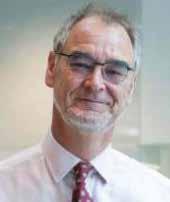
Reflecting on his achievement, Professor Wilkinson commented, “Although awards are made to individuals, in my case, this reflects my fortune in working with hundreds of excellent people over many years to foster high-quality research and a good
research culture. In my acceptance of this award, I ask that my colleagues view this award as an endorsement of their great contribution in tackling infectious diseases in Africa”.
His pioneering work has focused on the intricate relationship between the immune system and tuberculosis. His research has significantly advanced the diagnosis, management and outcomes of this life-threatening disease, bringing him international acclaim and impact.
UCT Vice-Chancellor Professor Mosa Moshabela comments: “Professor Wilkinson’s OBE is a testament to his remarkable contributions to science and humanity. His dedication to infectious disease research has not only saved lives but has also elevated Africa’s role in solving global health challenges. At UCT, we are immensely proud to have him as part of our community, and this award reflects the values of excellence and impact that we strive for. His work has
enhanced the quality of life of individuals and communities and addresses key challenges facing society. We extend our heartfelt congratulations to Professor Wilkinson and his collaborators on this well-deserved recognition.”
In addition to his research, Professor Wilkinson, who is the founding director of the Wellcome Discovery Research Platform for Infection at UCT, has championed science capacity building in Africa. He has supervised or co-supervised numerous postdoctoral scientists and doctoral students, most of whom are women and many from underrepresented groups.
Professor Wilkinson’s OBE is a powerful affirmation of UCT’s Vision 2030, which aspires to “unleash human potential to create a fair and just society.” His achievements should inspire a new generation of scientists and reinforces UCT’s role as a global leader in research excellence.
London’s Worshipful Company of Musicians awarded its 2024 William Willson Cobbett Medal to virtuoso Leon Bosch for his services to chamber music. He is the first double bass player and Black musician to win the annual medal since its inauguration in 1924.
Leon is the first double bass player and first black musician to win the prestigious award. He is the artistic director of the mixed instrument ensemble I Musicanti, and founder of the Ubuntu Ensemble, which comprises fellow South Africanborn musicians now based in the UK. Born in Cape Town, Leon studied the
double bass in his BMus performance degree at the College of Music at UCT. He later moved to the UK to study at Manchester’s Royal Northern College of Music and debuted with the Philharmonia Orchestra.
“It is an honour to receive this medal, not only because of the long history of illustrious previous recipients, but also because chamber music has been a central part of my musical life throughout my career. My first meaningful chamber music experience was at 17, when I deputised for my teacher, Zoltan Kovats, in a performance of Schubert’s Trout Quintet with his professional colleagues in Cape Town”.

Boardroom is a dating app designed specifically for busy professionals seeking meaningful connections and potential life partners. The app leverages LinkedIn for profile verification and requires users to upload clear photos and complete detailed profile prompts. It prioritizes quality and safety, creating an environment where people with shared values and interests can connect. Boardroom was cofounded by Wisani Shilumani, Derusha Naidoo, and Serisha Barrat in Cape Town in June 2023.
Meet Boardroom’s Founders
Wisani Shilumani – Chief Technical Officer & Head of Product Wisani moved to Cape Town in 2012 to pursue a Mechanical Engineering degree at UCT. After graduating, he started working at Allan Gray, where he continues to work today. Passionate about using technology to build community, Wisani has eight years of experience as a Software Engineer and has worked on various startups, including WeSit, Tribyst, Muso, and Vooiced. His experiences with these ventures have been crucial in shaping his role at Boardroom.
Derusha Naidoo – Chief Marketing Officer
Derusha completed a BSc in Mathematics and Economics before starting at Allan Gray in 2014. She later pursued a modular MBA at UCT GSB in 2022, where she met Wisani. They worked closely on MBA assignments, building a strong understanding of each other’s skills and leadership styles. Derusha spent nearly a decade at Allan Gray before joining Momentum Money as an executive associate. She also has over a decade of experience in influencer marketing and brand campaigns.
Serisha Barrat – Chief Executive Officer
Serisha has a legal background and over a decade of experience founding tech startups, including “Lawyered Up,” which uses AI to make legal services more accessible and affordable for startups and small businesses. She is also involved in initiatives like Arts of Charity and provides pro
bono legal aid to victims of gender-based violence through “Lawyered Up.” Serisha is dedicated to fostering inclusivity and equity in the tech industry.
Wisani and Derusha met Serisha at UCT GSB’s “Women in Business” conference in 2022. They shared their entrepreneurial stories, not expecting to partner on a venture only a year later!
Wisani initially conceived the idea of a dating app for busy professionals and, after some testing, invited Derusha and Serisha to join as co-founders. In October 2023, while Wisani and Derusha were at UCT Graduate School of Business for their entrepreneurship courses, Wisani shared a post on X about Boardroom which ended up receiving 5 million impressions and hundreds of comments. The Boardroom team, seeing this as a validation of the product, decided to leverage the virality and organic interest as much as possible to push forward with the business.
Since starting, some key highlights for the team include winning a “Best Startup” award at the Africarena Grand Summit, hosting successful in-person events for professionals in Cape Town and Johannesburg, reaching over 20 000 downloads, and receiving PR exposure from major South African news publications and broadcasters such as News24 and SABC Morning Live.
Wisani explains, “During COVID-19, professionals everywhere in the world were struggling with loneliness. Since then, I’ve been fascinated by the loneliness pandemic, whose research has shown that loneliness is as bad for people as smoking 15 cigarettes a day. Before building Boardroom, I had just gotten out of my own relationship and this problem became more front-of-mind for me. This issue particularly impacts busy professionals who relocate to cities for economic opportunities and end up living alone in apartments. It made sense to connect professionals who were very busy and didn’t have a great deal of time on their hands. It was
thus a compelling motive to connect people and find a way to encourage sustainable, long-term relationships for people from 25 to 50 years old.”
Boardroom’s very specific target market is professionals who have more than likely been in previous relationships and are now looking for something serious. The Boardroom team posited that the below factors hold importance for busy professionals looking for a life partner:
(a) Someone who understands and aligns with my lifestyle
(b) Someone I can co-create a shared future with
(c) Someone I can easily engage with about my ambitions and interests
(d) Someone who shares my core values
The Boardroom team knew that in keeping with its mission to help professionals find love and to bring safety and quality to the online dating experience, they would need to build features to support this mission. The core differentiator is LinkedIn verification, which discourages fake profiles on the app and keeps the user base focused on professionals. In January 2024, the team introduced a bold new feature that limits users to a maximum of three chats at any given time. This encourages more meaningful engagements. Wisani comments, “We live in a time of instant gratification, demand, and excess—and we are saying PAUSE.”
The team listens closely to feedback from users and has introduced confidentiality features that hide a user’s place of work until they have matched with someone. When dealing with professionals, it’s important to understand their specific needs and concerns.
The Experience Building the Business
Wisani describes the experience of working on Boardroom as a breath of fresh air and a pleasant contrast to his highly pressurized career in corporate. He enjoys connecting people, and seeking to understand what matters to users on the app. Derusha expresses, “I absolutely love the learning that happens every single day of running a startup, and the autonomy of being able to test new strategies and methods to get the best outcomes. Things move quickly in a startup and you have to wear multiple hats!”
From a marketing point of view, the team knew it would be important to understand where their target market was spending most of their time and try to position Boardroom in those spaces. LinkedIn was an obvious channel to focus on for online ads, but the team took an iterative approach testing other social media platforms as well. Strategic partnerships were also a key focus area and the team partnered with content creators who already have engaged communities of professionals that Boardroom could tap into.
The team has tested various pricing models with the latest being weekly subscription options, which offer users a chance to try the app for a week before committing to a full monthly subscription. Wisani comments, “It is bittersweet when we see people going off the app after they have bought their subscription, but the reason is because they have found
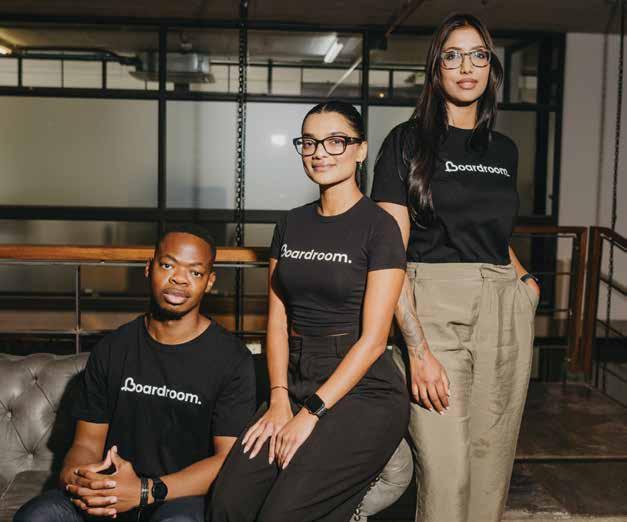
someone on the app, which is great news!” The team is of the view that if the app is successful in helping professionals find a match, the positive word of mouth from that will help drive business growth.
South Africa is home to Boardroom and proved to be a great place to start given the team’s existing networks; however, the goal has always been to scale Boardroom globally and help professionals everywhere find love. True to this mission, the team has begun testing the market in the UK, identifying that it has a dense population of working professionals who already use dating apps. A key priority for Boardroom will be to continue enhancing the experience for users and building on the safety and quality features on the app.
Did the MBA Help?
Derusha and Wisani concur that embarking on their MBA was a transformative journey that encouraged them to “think big” when it came to starting a business. The MBA provided them with powerful tools and networks to leverage in their entrepreneurship journey. Wisani comments, “The focus on leadership in the MBA is invaluable and gives a thorough self-understanding, teaches self-leadership, and requires us to question how we show up in the world.” Derusha notes, “We are building a global company and need to have a mindset that enables that vision.”
Wisani remarks that some of his friends have even found matches on Boardroom and are grateful for the connections the app has provided. Derusha comments, “I’ve learned that if you have an idea and a solid team backing you, other people will get behind you and support you – users and investors alike. It is all about believing in what you have created.”
Tom Dawson-Squibb, former Ikey Tigers head coach has just published a book, Humanball, in which he weaves a story of life at the UCT Rugby Football Club where people care equally about each other and excelling on and off the field.

Tom Dawson-Squibb, a performance coach, who was the head coach of UCT’s Ikey Tigers for the last five years, has just written a book Humanball – A leadership journey in South African rugby. It is an inspiring story showcasing how a team can be more than just the sum of its parts. The book includes inspiring stories from this leadership journey – having captured the thoughts of players, staff, members of the executive and of course Tom’s own account.
Sport is life to Tom, and the work he does with passion, insight and humour is that of developing leaders in all people to create high performing teams. In addition to being the Ikeys head coach, Tom has worked as a performance coach for the SA Proteas Cricket team, the Stormers, Western
Province and the Melbourne Rebels, as well as a range of corporate clients. He studied Business Science at UCT and then went on to complete his Honours and Masters in Organisational Psychology at UCT.
Tom on choosing a career path in sport:
“I started coaching when I was 16 years old. In matric in my role as head boy, I became fascinated with how effective leadership can pull people together to do great things. I then realised that I loved the idea of collective euphoria — getting people to do amazing things together as a group.
I am obsessed with sport and my initial roles supporting head coaches in the sporting world were unpaid labours of love for me while I cut my teeth as a leadership consultant
in the corporate world. Fortuitously, these two areas collided to create an interesting career path for me as a performance coach. The term “performance coach” wasn’t even around back when I started doing this and I was referred to as all sorts of things such as a mental coach, or Afrikaans circles, the Kopdokter
The sports leadership industry has grown to be a substantial one, and something that would have never been suggested as a potential career for me when I was back at school. I am privileged to have spent a great deal of time trying to bring people together on three levels:
1. If I am coaching an individual, I partner with that individual to help them become a more together individual.
2. Building a connection between two people and
3. Bringing people together as a team and getting them to perform, such as I have attempted to do with the Ikey Tigers. I am unashamedly competitive, and I love people to perform and succeed.
I am unashamedly competitive, and I love people to perform and succeed.”
Tom on being Head Coach to the Ikeys
“Being head coach of the Ikey Tigers felt like I was doing a job that didn’t feel like a job. It felt like a place of joy, working with young, intelligent, aspirant men who can make a valuable contribution to society. Being part of this dynamic team and having input in their development was an amazing experience.
But of course, the job is not all sunshine and roses. In sport, a great deal of what we do is unsexy and a sheer slog and it’s no different working in this space at UCT. But I am a romantic at heart and I love being part of something remarkable and worthy of story. For me my work is about creating stories for others to tell about themselves. Stories have different levels and I discuss the concept of your Triple Story in the book: the first story is where you come from and how your past has shaped who you are today; the second is the narrative we tell ourselves about where we are today; and the final story is the one we were for ourselves in the future – it’s the path we wish to manifest into existence for ourselves. My hope is that when people play for the Ikeys, they feel like they’re writing a really good story for themselves – something that they take pride in. As a team we definitely weren’t perfect, but I don’t think perfect is what one should be chasing – being as excellent as you can be, should be the focus.
Tom on working with diverse individuals and pulling them together as a team
“The real strength comes in the individual connections and oneon-one conversations. You need to understand where people are at, what they are thinking and why they are thinking what they are thinking and feeling.
Performance is the ultimate goal in any team sport. While fostering camaraderie and the philosophy of “if the players love each other, they’ll win”, hold some truth, they’re only part of the equation. The primary focus should be on what we need from each other on and off the field to contribute to the collective effort. The more I know about myself and the player next to me from a performance perspective, the more we will be able to help each other.
This can definitely happen organically, but the problem arises when you are hoping for these connections to spontaneously occur, and they don’t. In my view, what you need is what I refer to as Performance Connections, teammates don’t need to be close friends to be great teammates.

That is the power of the team. And I was lucky to work with staff who could do that. As head coach, you are a bit like a chairman, gathering information and using that information and your skill to decide what the group needs. But without the collective of our management team - the team doesn’t function. I don’t believe one person is more valuable than another and any success we had can be largely attributed to the fantastic people I was privileged to work alongside.”
Tom on his greatest strength as a coach
“I’m really enthusiastic and I think people are drawn towards my energy. My manager once said to me that I am really hard to say no to! I really care about the guys and am obsessive about building strong, genuine relationships in the team.
The UCT RFC has been around since 1882 and I am just one of an extremely long line of coaches and players who have played a role in the club’s history. We all put our own spin on things and bring both our imperfections and qualities to the space. UCT rugby is always seems to be in a state of survival. People say you should thrive, not survive, but survival is very much part of the work we do, part of who we are and makes us special. One of my biggest fears is that this special club struggles to get the support it requires to keep doing what it is doing for the community at large.”
The other thing I suppose I have become good at is simplifying complex ideas. We introduced a theming approach at the campaign level and for each match which I discuss in detail in the book – the idea behind theming is that you can use storytelling to communicate important ideas to the team bringing them to life. For example, our 2024 Varsity Cup campaign was themed Explorers which was heavily inspired by Ernest Shackleton’s Endurance expedition. The reasoning was that we wanted to push boundaries and go where we’d never been before, both on and off the field. Wo we used stories each week of explorers and mavericks who changed the game they were playing, drawing parallels between their journeys and ours as a team.
I get moved by stories because they connect people together with experiences they may have had. With the themes, we worked backwards from the technical side of what we needed people to do and pull that into a story or meaningful narrative that make people feel they are doing something even more special.”

One of the stories in Humanball tells the story of a player who noticed that the rest of the team was getting to practice earlier and earlier – up to 45 minutes before training started. This was so that the team members could hang out, talk rugby, talk about life and laugh together. The sense of camaraderie, breaking down barriers and connecting in an unforced, organic manner, for the pure joy, was evident. Tom asked another player to tell him what his favourite part of rugby was, expecting him to say running with the ball or tackling, but he was surprised when he said, ‘the time before practice when we sit together in the change room and have banter’.
Tom has clearly had an impact in building a strong team who are invested in each other’s lives as well as the game. He describes how many of the coaches go above and beyond the call of duty, giving generously of themselves, their time and resources and leading by example. Tom comments, “As a coach you need to be honest with the players. Make it relaxed but recognise that the players want to win. Everyone wants to be part of something where they can get better and they can win. And the second thing is that people want to feel like they belong. Those two things can work hand in hand and don’t have to be mutually exclusive. If you are always thinking about those things, you can do well.”
What comes next for the Ikeys and for Tom “When I took on the head coach job with the Ikeys, I thought I would do it for three years, but then I did a fourth and a fifth year. I felt it was now time to step down while I was still enjoying the job and while people still wanted me here. I felt it was time for some fresh blood. Robbie Fleck, who was the assistant coach, will take over as coach. He has been head coach of the Stormers and he’s played for the Springboks and I think it is awesome for the Ikeys to have him taking over from me.
My work at UCT was more than full-time work, but not with full time pay. Some of the time that was my own fault, because I spent time doing things I didn’t need to do, but I was obsessed. People say I am passionate about things, but I wasn’t passionate – I was obsessed! I was thinking about rugby on Christmas day, I was thinking about it when I got married and when I was on honeymoon I was communicating with the team. On the day
my dad died tragically of a heart attack (early in the morning) I was at practice by midday, because I preferred to be there than anywhere else. It has been a privilege to be part of something where you feel so consumed and obsessed. I don’t see this as something that requires praise or adulation, it is just a fact - I think I was very lucky to have an opportunity to do something like this that captured me in so many ways.
I am feeling energised and think my role might morph somewhat. I would love to coach again and to work in building teams. My strength lies in the people space, more than in finance or coaching hockey, rugby or cricket. Managing people, getting them on the same page and creating a unified language is what I am good at and I continue to hope that I will find opportunities to use my skill sets.”
It is fitting that Tom, who has a passion for stories and giving people a voice, has written a book, which gives voice to the players, coaches and other important people from UCT rugby. Humanball was written in collaboration with Nic Rosslee, an entrepreneur, lawyer, fellow UCT alumnus and former UCT RFC club captain. Tom comments, “Nic’s creativity, planning and grit turned the dream of me writing this book into a reality. I discuss the concept of Performance Connections in the book and this was it — we worked exceptionally hard on this project and got the best out of each other to create something that exceeded both of our expectations. Nic is a master at crafting stories, and I believe that this book will set into motion a wonderful writing career amongst his other interests (he runs an online flower delivery business called Julep with his wife, Jules).
When I reached out to Nic to see if our story was one worth telling he quickly got behind the idea. I know for him a big part of his motivation was to attempt to lock as many of the great things we believe club stands for in a time capsule of sorts. I am so proud of the book and the legacy of telling the story about the many stories of the people in it.”
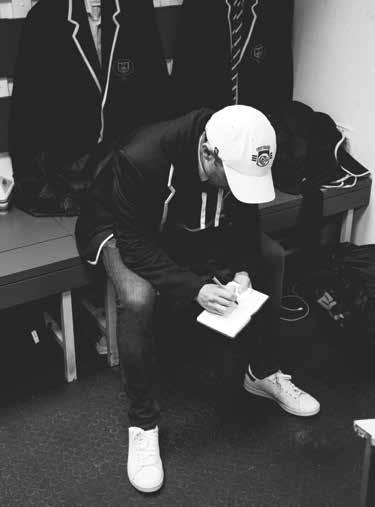
UCT’s seven graduates among 11 Southern African Rhodes Scholarship recipients for 2025
The University of Cape Town continues to shine as a beacon of academic excellence and leadership, with seven of its graduates named among the 11 recipients of the prestigious Rhodes Scholarship for 2025 in the Southern African cohort. This remarkable achievement underscores UCT’s reputation as a premier institution that nurtures not only academic talent, but also future leaders committed to making a global impact. The seven scholars-elect were selected after a rigorous and competitive process and will

Niamh Ahern (22) Niamh graduated from UCT in March 2024 with a BA in music, psychology and Afrikaans (with distinction), and is currently completing a BA Honours in Afrikaans at UCT.
She is exploring hauntology, place and enfreakment in a comparative study of Afrikaans and Appalachian gothic novels for her honours thesis, and has additional research interests in the medical humanities, digital humanities
join more than a hundred scholars from around the world at the University of Oxford in October 2025.
The Rhodes Scholarship, established in 1903 and widely regarded as the most prestigious graduate fellowship, has awarded nearly 1 000 scholarships to Southern African students over its 121-year history. This year, UCT’s dominance within the region’s selection process reaffirms its role in producing scholars who excel in academics, leadership, service and innovation. National Secretary for Southern Africa Ndumiso Luthuli said,
“We believe that the Rhodes ScholarsElect announced will make us proud at Oxford University and go on to become changemakers who will impact positively on our continent and the world.”
UCT remains a leader in fostering intellectual growth and equipping its students with the skills and drive necessary for transformative leadership. The achievements of these seven UCT graduates further solidify the university’s standing as a hub for nurturing talents who are ready to contribute to Africa and the world’s lasting change.
and libraries and archives. She works as an editorial assistant at New Contrast and has previously volunteered at a local public library.
Niamh was awarded a merit bursary from the Suid-Afrikaanse Akademie vir Wetenskap en Kuns and the Prof JJ Smith Scholarship from UCT’s Afrikaans and Netherlandic Studies Section in support of her honours degree, and received a Student Leadership Award (Team category) for her work as deputy editor-inchief of Varsity Newspaper in 2024.
She is an active student leader currently serving as managing editor of Varsity Newspaper, social sciences director of the African Research Society, chairperson
of the UCT Student Psychiatry Society, technical officer of the UCT Cortex Club, and Student Parliament representative for the Students with Disabilities’ Forum. She was a member of the UCT Symphony Orchestra during her undergraduate studies.
Outside of these pursuits, she is a writer, musician, therapy dog handler and occasional ceramicist.
At Oxford, Niamh hopes to pursue an MPhil in global and area studies, in which she aims to cultivate expertise in African studies and develop research skills that will enable her to influence public library policy, special collections practice and African archival integrity.
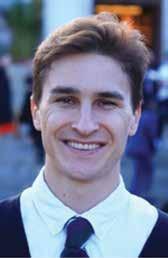
Dr Christian Cotchobos (27)
Christian grew up in Cape Town and studied an MBChB at UCT and graduated with first-class honours in 2022. During this time, he also completed

Inae Kim (26)
Inae is a South Korean-South African junior doctor currently working at Groote Schuur Hospital with a passion that lies at the intersection of clinical science research, specifically in viral hepatitis and hepatobiliary diseases, and global health. She is currently involved in research projects within the hepatobiliary surgery unit at

Jacob Lund (22) Jacob graduated from UCT in March 2024 with a BSc in mathematics and applied mathematics and is currently in the process of completing a BSc Honours in mathematics at UCT.
He has taken on mathematical projects in a broad collection of fields, ranging from categorical topological, to quantum complexity, to classical chaos. He shares his enthusiasm for mathematics by teaching, and has run mathematical
a BSc Honours degree, specialising in infectious diseases and immunology. He is currently a junior doctor in his second year of internship at Livingstone Hospital in Gqeberha, in the Eastern Cape. As an aspiring clinician-scientist, his goal is to improve surgical care through innovation research.
His current focus of clinical research is on improving intimate partner violence care provided by orthopaedic
practitioners. He is completing a Master’s thesis on this topic with UCT’s Global Surgery Division.
Christian is a keen runner. At university, he was a national level 800m athlete and chairperson of UCT athletics. He relaxes by spending time in nature, hiking or trail running with friends, and playing guitar. At Oxford, Christian hopes to pursue an MSc in musculoskeletal sciences.
Groote Schuur Hospital.
She obtained both MBChB and BMedSci (Hons) specialising in infectious diseases and immunology as part of the intercalated programme at UCT with first class honours. During her studies, she has obtained various awards and scholarships including multiple class medals and the Faculty of Health Science Surgery Prize in her final year of studies.
lnae has held various leadership positions during her studies such as in International Association of Student Surgical Societies, executive committee of South African Surgical Student Societies
and vice president of the UCT Surgical Society. She was awarded the KlausJurgen Bathe Leadership Scholarship for demonstrating high intellectual power and leadership potential.
At Oxford, lnae hopes to harness both her passions in global health and clinical science research by pursuing research in liver diseases, whilst also pursuing studies to understand how to take research and use it to advocate for changes within the healthcare sphere. She hopes to champion and celebrate diversity through her own identity.
thinking workshops for first years, with the aim of breaking down “maths-anxiety”.
He has received the class medal for all core mathematics courses during his undergraduate, and all applied mathematics courses since second year, and was awarded the Harry Crossley Research Fellowship for his honours year, based on his research potential. His thirdyear project, “The early universe as an open quantum system: decoherence and complexity”, was published in the Journal of High Energy Physics.
Jacob is also a co-creator and moderator of isiXhosa.click, a free online open-source dictionary which has received a grant as a
part of the South African Centre for Digital Language Resources’ Digital Humanities Open Educational Resources Champions initiative.
In his free time, Jacob can usually be found on a mountain or in the climbing gym.
At Oxford, Jacob hopes to pursue an MSc in mathematical sciences, followed by a DPhil in mathematics with the intent of exploring the nexus of pure and applied maths, particularly on how insights from traditionally pure fields can be used to solve pressing problems.
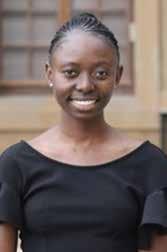
Dr Tshegofatso Masenya (26) Tshegofatso is a medical professional with a deep commitment to healthcare, social equity and educational access. Currently an intern at Charlotte Maxeke Johannesburg Academic Hospital, Tshegofatso is known for her work both in clinical settings and in community-driven projects that aim to address systemic inequalities. She is currently pursuing a postgraduate diploma in health economics from UCT, where she also earned her MBChB degree.

Phemelo Matie (22)
Phemelo is a finalyear LLB student at UCT, where she graduated with distinction in 2023 with a BA in law and isiXhosa communication.
As an Allan Gray Orbis Foundation candidate fellow, she co-founded Legal Standpoint, an award-winning legal tech

Jeremy Simpson (24)
Jeremy graduated from UCT in March 2024 with a BCom (Hons) in economics and a BSc in economics and Mathematics. Currently, he is working as a management consultant with Boston Consulting Group. In this role, Jeremy has worked in Global Health
She is the founder of GoShare, a donation-based crowdfunding platform dedicated to assisting “missing middle” students in securing the funds needed to settle their outstanding university fees. She also leads a health education series under the Golden Key International Honour Society, promoting health literacy among young adults. Her previous leadership roles include heading health promotion with SHAWCO Health, coordinating outreach for the Rural Support Network, serving on the Health Sciences Students’ Council, and serving as head of entrepreneurship with the UCT chapter of the Association of Black Securities and Investment Professionals.
Recognised as one of South Africa’s Top 10 GradStar students, Tshegofatso
is a member of the Global Shapers Community, part of the World Economic Forum’s network. She will represent South Africa at the World Economic Forum in Davos, Switzerland, in January 2025.
Outside of her professional life, Tshegofatso is a voice-over artist, a Formula 1 enthusiast and an avid reader with a particular interest in African literature.
Tshegofatso will be heading to Oxford University, where she aims to deepen her expertise in health systems and policy, empowering her to drive impactful change with a focus on advancing universal health coverage in South Africa’s public health sector.
start-up aimed at increasing access to legal education in South Africa. Though she has since stepped back from the startup, her commitment to making the law more accessible remains strong. Phemelo is actively involved in her church’s campus ministry, serves as a children’s church teacher, and tutors legal writing in the law faculty. She has also held various roles in student governance within her residence, faculty and UCT societies.
Phemelo believes businesses can and should be a force for positive social impact
and development, and aims to pursue an MSc in sustainability, enterprise and the environment at Oxford. Through this degree, she hopes to harness business as a tool for positive transformation, driving sustainable change, investment and development in communities.
In her spare time, Phemelo enjoys attending music concerts and cherishes spending quality time with her family and friends.
as well other strategy and business transformation engagements. While at UCT, he won two class medals in his honour’s year and placed third in his cohort. In his final year, his thesis explored the informal sector’s role in South Africa’s macroeconomy using a dynamic stochastic general equilibrium model.
Jeremy was also an active member of Varsity Newspaper while at UCT, serving as a news reporter, deputy editor-in-chief and eventually its publisher. Jeremy is an avid music lover and a singer, having
sung in the Cape Town Youth Choir at university. In addition to choral music, he loves musical theatre and every opportunity he gets to perform it in the car with his sister.
While at Oxford, he hopes to pursue studies in economics and energy systems with a focus on using multidisciplinary methods to address the challenges that developing countries will likely face from the Just Energy Transition.

The University of Cape Town’s Cricket Oval, situated on middle campus, was full of activity on Friday, 25 October, as the second iteration of UCT Day was marked off the calendar – in aid of the Unlocking Futures Bursary and the Food Sovereignty Programme.
Each year, UCT has a list of students who have completed the full academic requirements but cannot receive their degree certificates, and that’s where the Unlocking Futures Bursary finds expression, while the Food Sovereignty Programme is aimed at assisting food-insecure students with a daily meal. The programme was later refined to a broader interaction that sought to provide monthly grocery packs which contained nonperishable food items, and toiletries every second month.
There were multiple events leading up to the day, including a benefit concert and a phonathon, while on the day, people could take part in archery, bubble football, an amazing race challenge, attend a film festival and so much more. Professor Dizu Plaatjies held his benefit concert on 3 October, while from 16 September to 1 October, 15 dedicated UCT students managed the oncampus call centre to raise funds for the support programmes, raising over R500 000.
On the day, various UCT departments pulled together to see to it that the day was as successful as it can be with enthusiastic dancing with the cheerleaders, hitting the target with archery,

trying not to lose one’s footing during bubble soccer and attempting to outfox your opponents during the amazing race and tug-of-war challenges.
For children, jumping castles and face painting were available before a film screening scheduled especially for young ones was shown at the Kramer Law Building. UCT’s Development and Alumni Department (DAD) were the main hosts of the day.
“It’s a day to celebrate excellence at UCT, but also about bringing all our stakeholders together – staff, students, alumni and donors. It’s a way to give people a moment to feel like they belong at UCT and to keep rooting for UCT and for UCT to thrive.
The other reason is to support our students,” said DAD executive director, Sarah Archer.
“The students themselves who worked the phones found it to be a rewarding experience for them.”
“Our students are what the university is about, and this is a good time to celebrate in October because it is UCT’s birthday month. Both [initiatives being supported] are important because it’s exam time and students are pushing through and being able to do well is dependent on them having enough sustenance,” said Archer.

“We’ve been successful this year; we had a goal of half a million rand and the people doing the phonathon spent time calling and engaging with alumni to encourage them to pledge support. The students themselves who worked the phones found it to be a rewarding experience for them. We are grateful and proud of the people who pledged support.”
‘Awesome’
As the day drew to a close, clad in a bucket hat, tracksuit pants and a golf shirt, Vice-Chancellor (VC) Professor Mosa Moshabela arrived together with executives as they lay down the gauntlet to take part in the obstacle course, which included a brief stint on the raging bull.
“It’s awesome [being here]. I’m getting to engage with students in a different way. I was feeling young with all the games I took part in. It’s a nice environment to get together and connect and build a more united UCT culture,” Professor Moshabela reflected.

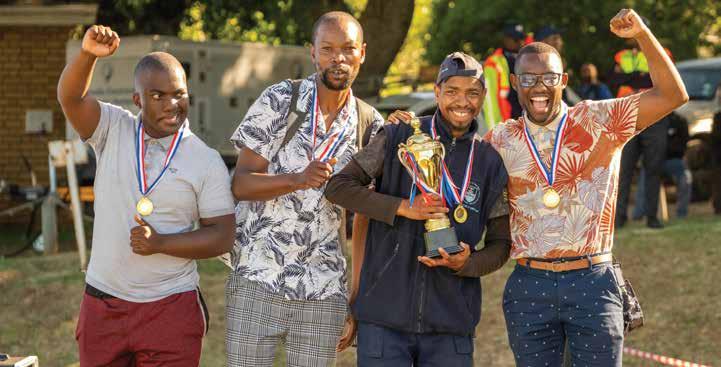


Taking stock of his efforts with the festivities, he revealed that the tug of war and raging bull left him bruised, but it was nothing he couldn’t handle.
“We want people to have a lot more generosity and for those who are having a tough time to be able to know that they can lean on [the UCT community] and know how to navigate the environment and get support.”
Moshabela noted that UCT Day came during his 13th week as VC and it’s the most fun he has had. The army green team took the amazing race bragging rights while the blue team won bubble soccer.
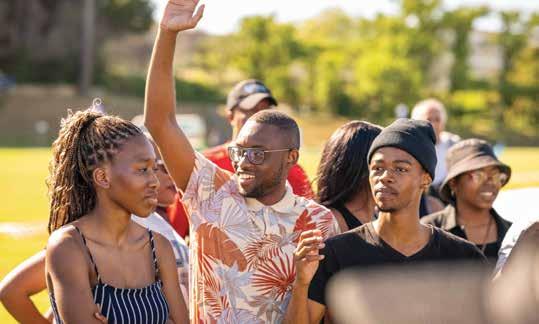



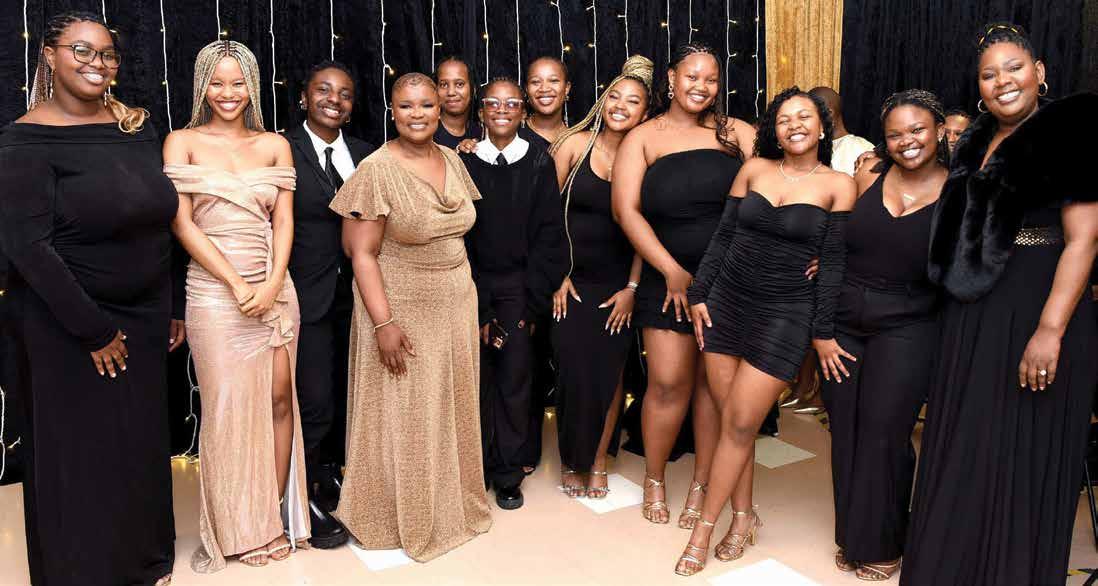
Ahome-away-from-home for generations of young women, in 1974 the University of Cape Town’s Tugwell Hall first opened its doors, two years ahead of its brother residence, Leo Marquard. Destined to be 17 storeys high, but reduced to 11 after neighbourhood objections, the 45.22 m iconic tower that dominates lower campus has been a welcoming home to generations of ‘Tugwellites’ ever since. On the first weekend of October 2024, Tugwell marked #50YearsOfGreatness.
who spilled over two dining halls, had dressed accordingly.
The evening also served as a celebration of excellence, and students were awarded for academic achievement, sports and cultural participation and student leadership. In the words of warden and Tugwell alum, Dr Khosi Kubeka: “I am so full of pride at our young women, our Tugwellites, as we celebrate and recognise excellence and leadership.
“We pride ourselves on our ability to create a safe space and home for our Tugwellites. Our secret weapon is our student leaders who are committed to serving others and ensuring all Tugwellites succeed academically, and their health, safety and well-being are taken care off,” Dr Kubeka said.
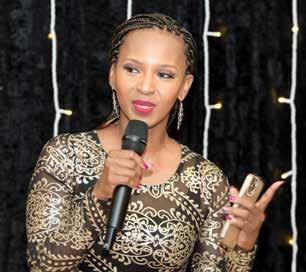
“Our building provides a community, a home-away-fromhome and an opportunity for growth, and it has done that for 50 years. That is what we celebrate tonight,” said Tugwell Hall warden, Bonani Dube, in his welcoming address to those gathered for the Tugwell Hall 50th Anniversary Celebration and Excellence Dinner, which preceded a fiesta the following day on the UCT rugby fields. With the theme being Tugwell’s colours of black and gold, the guests,
“When the bus comes to lower campus, it is not called the lower campus bus; it is called the Tugwell bus!” said Dube to a roar of applause.
Celebrating inclusiveness
“For the longest time, residents were known as the Queens of Lower Campus, and our motto was ‘my sister’s keeper’, but as a space for growth, we looked at our identity and realised not everyone identifies that way, so we came up with ‘glow, grow and graduate’. Everyone who walks through the door must feel at home,” Dube said.
Singer and entertainer Tandie Nkosi preluded her song with
the memory of gathering with Tugwellites to watch Generations in the TV room, one of the many soapies in which Danke coincidentally performed. “I joined this world alone. I left with sisters.”
Award-winning actress and alumni Katlego Danke was the guest speaker. “Tugwell has a unique place in my heart, as it was the first place I called home as a young woman,” said Danke, an award-winning actress, radio DJ and TV presenter who graduated in 2001 with a BA in Theatre and Performance. Danke described her initial welcome by the sisterhood, and the support she had when her heart was broken for the first time, all part of a growth journey. “It is the little things that created a sisterhood, ubuntu, those moments when our lives knitted together, not just in education, but in the beautiful moments over dinner, or in the laundry.”
Watching television together in the days before streaming is something many alumni remember, along with sun tanning on the roof. “It was here I experienced my first job interview, learned how to carry myself in different environments and how to use the right words when addressing others,” remembered alum Sikhonathi Thimbela in a special edition Tugwell publication. “But the most precious gift was friendship.”
Write your own
Listen to the stories of alumni, was the advice of Professor Moshabela, who encouraged students to write their own stories.
“One day you too will recount your own stories,” Moshabela said. “You may not think you have a story in the present moment, but we are all writing the stories of our lives. Because you are at UCT, your future is already bright, but when we write a story, we are always anxious about where we will land up. Our alumni know that a qualification from UCT is a powerful instrument. The sun will rise tomorrow, but where you will be depends on decisions you make today.”
His advice was to be intentional, and to remember that our stories are also written within a network of those closest to us, therefore the community with whom they share a residence is part of their stories. He advocated for kindness, inclusivity and social justice in a diverse world and the importance of a sense of belonging. We are a legacy institute and that is why we look to the future. Write your story well.”

Professor Ramugondo confessed upfront to being from rival Fuller Hall but said that when it came to the protests for the end of apartheid and the release of Nelson Mandela, it was the Tugwellites who were by their side.
She encouraged students to internalise their academic achievements when they know they have done well, but to refuse it when they know it is undeserved.
“Don’t emulate mediocrity. When you are good, you must know you are good,” she urged ahead of handing out certificates to Tugwell achievers.
As an evening that celebrated the power of community, belonging, safety, support, personal growth, leadership, fun and high achievement drew to a close, Dube announced the start of a new scholarship for future generations of Tugwellites.
And as every day ends at Tugwell, so the dinner ended, with the words: “Good night, Tugwellites” and uproarious applause.


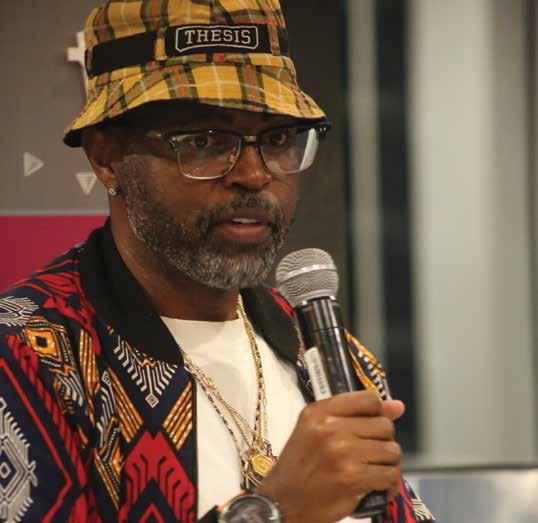

The fundraising team hosted a Fundraiser Golf Day at the Country Club Woodmead in Johannesburg. The successful event was sold out and had 104 players enjoying the experience, having fun, connecting and raising money for a good cause.
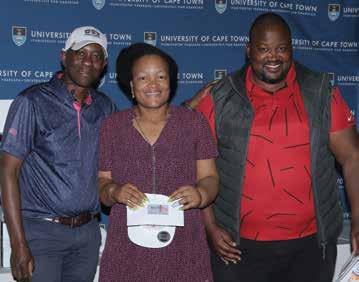
Prof Mosa Moshabela hosted an event for alumni in Johannesburg where he shared his vision for the university going forward, as well as listening to ideas from alumni on ways to bring the broader university community closer to the university.
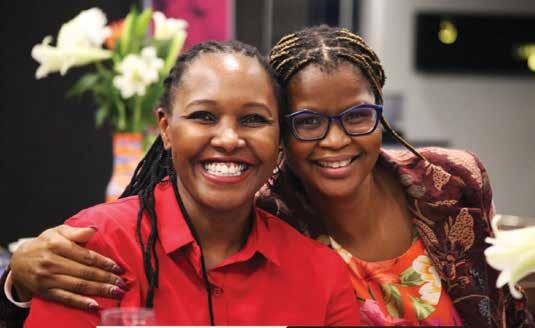



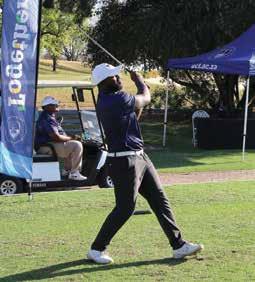
The UCT 100-Up project and the Disability Services were the beneficiaries of the fundraising, and we were thankful to the headline sponsor Tsatsile Consulting. The day also provided UCT the opportunity to connect with alumni and friends.


Vice-Chancellor, Professor Mosa Moshabela joined former Vice-Chancellor, Dr Max Price to discuss lessons from the past and progress towards equity and diversity. Professor Moshabela’s focus was on the task of sustaining a great institution in the face of competing demands from different constituencies, and within a higher education sector that is both complex and volatile, Dr Price looked back to the lessons delivered by the Must Fall movement to tailor his conversation, as he was head of the institution then.
A memorable day of golf and fundraising was held at the Erinvale Golf Club. Alumni and friends enjoyed playing golf and connecting with each other on the course and over dinner, while raising funds to support UCT students.
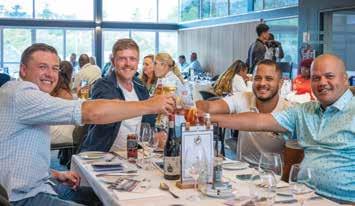


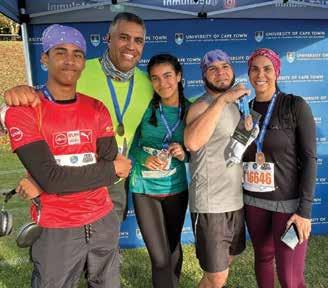



Annual UCT Memorial 10km race
The Development and Alumni department encouraged alumni, friends and family to join the UCT Athletics Club and take part in the annual UCT Memorial 10km race which honours the legacy of 3 UCT alumni athletes. This year’s event celebrated the memory of Isavel RocheKelly, one of South Africa’s best marathon athletes. The Alumni Relations team had a gazebo at the end of the race and enjoyed the opportunity to connect with alumni and re-establish connections.

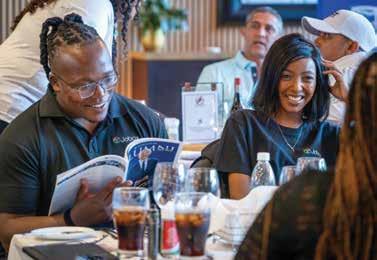
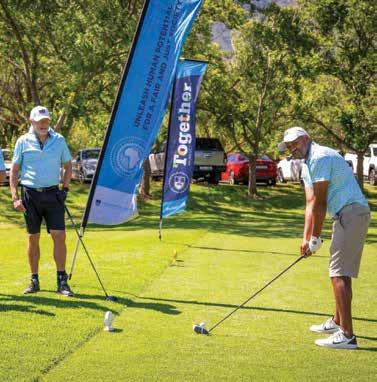
The Vice-chancellor hosted a dinner event with donors, alumni and friends in October to thank them for their ongoing support for UCT and to engage with them on UCT’s areas of excellence. The guests included representatives from the Hasso Plattner Foundation, the Atlantic Philanthropies, as well as other German dignitaries.




The Vice-chancellor hosted a breakfast event held in collaboration with the Mozilla Foundation. The gathered guests were representatives of USAID, the Mozilla Foundation and UCT. Discussions at the breakfast focused on “Responsible Computing – Curriculum and Beyond”. The event brought together stakeholders from academia, industry, and government for a collaborative dialogue focused on the current state of computing education in South Africa.
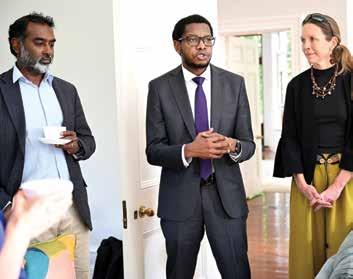


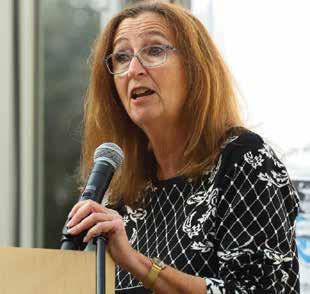
The Development & Alumni department organised a special event to showcase excellence in research at UCT. Academics and students presented TED Talk-style overviews of the ground-breaking work they’re involved in that align with UCT’s Vision 2030 and its three key pillars: excellence, transformation and sustainability. Academics, students, donors, as well as the vice-chancellor (VC) interim, Emeritus Professor Daya Reddy, listened to presenters discuss the significant impact their research endeavours/ projects have on the country and the continent. Presenters were from centres such as the Children’s Institute, the African Climate and Development Institute, the Future Water Institute and the Centre for Infectious Disease and Molecular Medicine.
DAD hosted a group of young professional women who are UCT alumni for an evening of engaging dialogue and networking under the theme ‘The importance of impactful and inclusive leadership’. The speakers were Naadiya Moosajee, co-founder and innovation lead at WomHub, Advaita Naidoo, the Africa Managing Director for Jack Hammer Global, Tracey Chambers co-founded Taking Care of Business Nazmeera Moola is the Chief Sustainability Officer at Ninety One.


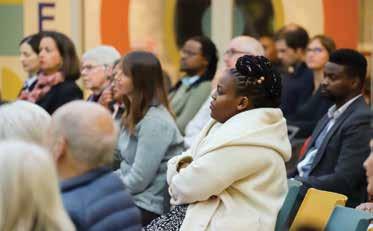



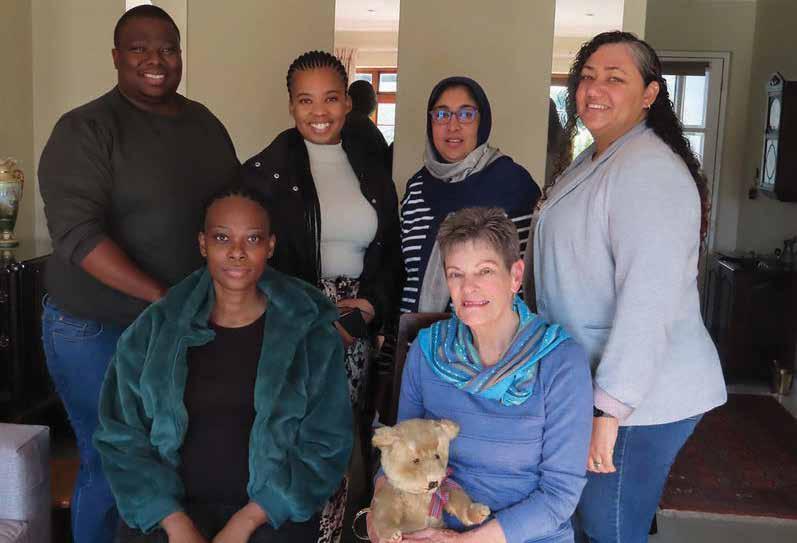

Each year, the Garden Route draws thousands of visitors to participate in the Knysna Marathon and Oyster Festival. Capitalising on these festivities, the Alumni Relations team embarked on a four-city roadshow to meet with alumni who had recently celebrated milestone birthdays as well as to host an event in George and Knysna.
UCT’s Presence in the Garden Route District, George:
At an event in George, Dehran Swart, a UCT alumnus, who heads up the Clinical Training programme for final year UCT MBChB students in George, discussed the UCT in Eden project, started ten years ago in partnerships with government and funders such as Hasso Plattner. He descried the expansion plans for the projects, which have enabled incredible service learning, research and capacity development and are making a huge con-tribution to the community in George and the surrounding areas.
Choose UCT: the legacy lives on and Adventure Medicine: The Road Less Travelled, Knysna
At in an event held in Knysna, Gcinumzi Haduse, from the Admissions office at UCT shared his insights on why the University of Cape Town remains the premier destination for talented students from across South Africa, the continent and abroad.

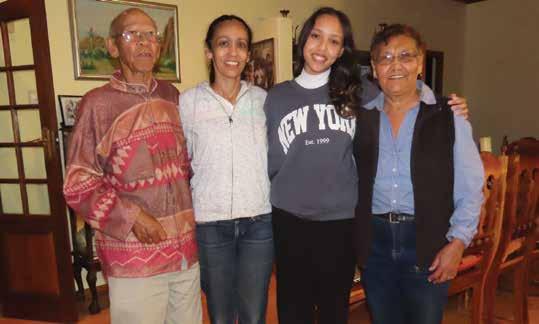
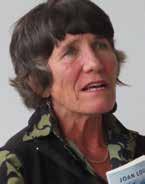
Dr Joan Louwrens, a UCT alum who graduated with an MBChB in 1975, and is the author of two books, shared fascinating stories from her life in adventure medicine – where she thrived working in underresourced, unpredictable places, such as Tristan da Cunha, Marian Island, Antarctic, practicing unconventional medicine. Joan’s passion for travel and adventure were reflected in stories of hiking in the Himalayas, cycling 12 500km from Cairo to Cape Town and being the doctor for a 10 000km cycling expedition along the Silk Route
UCT Legacy Society President, Emeritus Registrar Hugh Amoore hosted a lecture with guest speaker Professor Mark Solms, who delivered a fascinating lecture on the importance of play for humans.


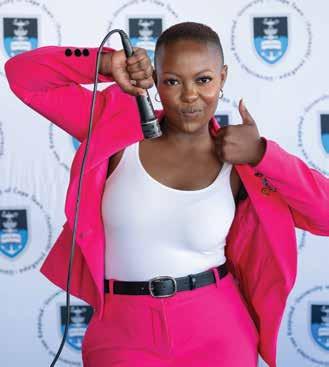

DAD hosted a cocktail networking and match viewing event for alumni and donors at the annual Ikeys/ Maties rugby clash on the Green Mile. Alumni, rugby players and coaches from across the years (many of whom hadn’t been on campus for several years) enjoyed being on the Green Mile and supporting the Ikey Tigers.
Delighted alumni who attended said they were blown away by the experience as a spectator - by the presence of
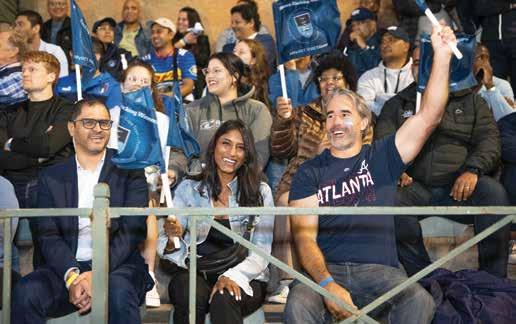

so many and very well-behaved wonderful students of all backgrounds; the incredible number of female supporters and the overwhelming sense of transformation at UCT.
Despite losing on the night 10-15 to the Maties, the Ikeys who won the World University Rugby Invitation Tournament (WURIT) in Bordeaux in 2023, made it to the final of the Varsity Cup, where they lost narrowly to the UFS Shimlas in Bloemfontein.
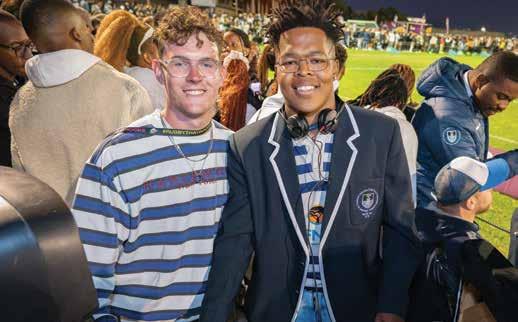

The UCT Trust hosted world renowned South African comedian, Nik Rabinowitz, in September at a venue in Westminster, central London. The night was attended by 60 alumni and friends (young and old) and was full of much laughter and fun. Nik brought with him some “home spirit”, and a LOT of hilarious South African humour, reminding us all of the relaxed, happy-golucky and friendly nature of our beautiful home country. After the comedy show guests enjoyed reconnecting at a drinks and canape reception.


The UK office welcomed 70 alumni and friends to The Royal Society to hear Prof Val Mizrahi and Assoc Prof Deshen Moodley present a talk “Leading from UCT: Africa-centred research with global impact”. They spoke about the world class research being conducted across numerous faculties at UCT. The evening concluded with a drinks and canape reception, where guests had the chance to connect, meet and mingle with fellow alumni and friends, both old and new.


Alumni and friends gathered in London for a panel discussion, “The Power and Impact of Inclusive Executive Leadership”, which was part of a global conversation series involving women alumni in executive leadership. Three UCT alumni who hold senior leadership positions across a variety of industries: Nhlamu Dlomu, Global Head of People at KPMG International, Dr Camilla Kingdon, former President of the Royal College of Paediatrics & Child Health and Claire Blackwell, Chief Client and Reputation Officer for St. James’s Place, talked about styles of leadership, experiences across various industries, highest and lowest points of their leadership journeys, offering advice on how to empower and build the next generation of leaders.


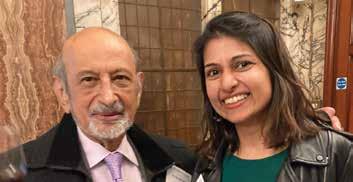
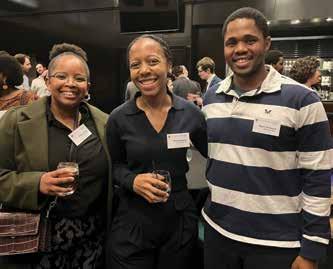
The UCT Trust UK hosted the annual Oxford Welcome evening, to connect with alumni in and around Oxford, and to welcome the new cohort of Rhodes Scholars to Oxford University. The event was attended by 53 UCT alumni and friends. It was an opportunity for those who are new to Oxford to meet and mingle with fellow UCT alumni “family” both old and new.
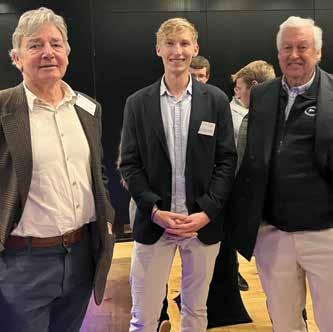


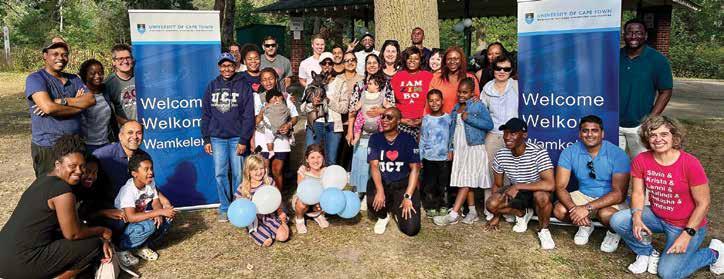
UCT Canada Alumni and Friends of UCT hosted an end of summer UCT picnic in High Park. Despite the rain, traffic, and a highway closure, it was an enjoyable event where alum reconnected, welcomed new faces, and strengthened the UCT community in Canada.

Taking advantage of the Interim Vice Chancellor’s visit to the US, we hosted a reception for alumni and friends in New York City at Paul’s on Times Square. Most of the guests were relatively young alumni who had not attended UCT events before. The purpose of the event was to engage and steward alumni in New York City, who are the most active constituent group in the USA.



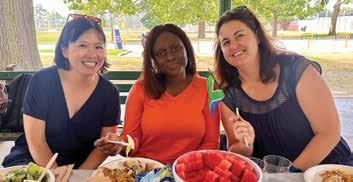
DAD hosted an intimate cocktail reception for UCT alumni and friends at Roofer’s Union, in Washington, D.C. This was the first alumni event that we have hosted in Washington DC and it was great to engage with alum who live in the area. They shared stories about their time at UCT and how the experience impacted their lives.
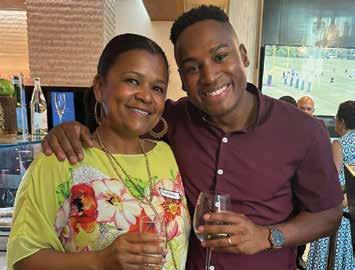




In May, alumni from Kenya had an opportunity to reconnect with their former classmates and engage in conversation with our Interim Vice-Chancellor, Prof Daya Reddy, in Nairobi. This provided an opportunity for alumni to hear firsthand about the Alumni event in Nairobi, Kenya
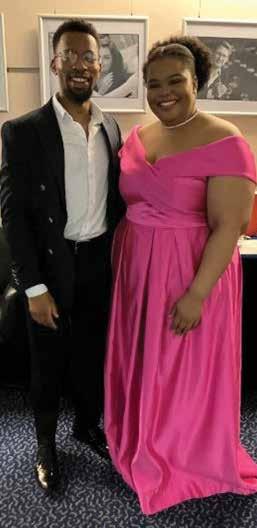
latest developments and initiatives taking place at UCT. It was also a chance for UCT to get feedback on the perspectives and experiences of alumni in order to strengthen our alumni community and build engaged alumni chapters.
During May, we invited alumni in Frankfurt to see two Opera school alumni perform at Opera Studio Soiree at the Frankfurt Opera. Nombulelo Yende (soprano) and Sakhiwe Mkosana (baritone) are based in Frankfurt and performing in the 2023/4 season. Following the captivating performance, attendees had the unique opportunity to engage with Nombulelo Yende, as well as with Sarah Archer, and Andrew Wigley from DAD, at an intimate networking dinner.

The 2024 annual Summer School programme showcased a wide range of topics and brought together participants from far and wide, including the United Kingdom, United States, Namibia, Canada, Afghanistan, Switzerland, Somalia, Thailand, France, Belgium, Sweden, China, Zimbabwe, Germany, Swaziland, Argentina, Italy, Nigeria, Australia.
The Centre of Extra-Mural Studies (EMS) offered numerous wellattended courses over the year, as well as a variety of excursions and workshops. Some of the highlights included a three-hour workshop, Geneaology, researching South African family history, Professor André Venter, a neurodevelopmental paediatrician with a passion for children with developmental delays and other handicaps, presented two lectures at Summer School in January on ADHD and on autism. Popular writer and lecturer, Sally Cranswick, presented a ten-hour course, ‘Write a family story that people want to read. ’Due to popular demand, the d-school offered a guided tour of their facilities.
Summer School participants had a unique opportunity to visit Hong Kong that focused on art. Those who went on the tour had an immersive experience visiting art galleries, meeting working artists in their studies, exploring the landscape and cityscape and learning about local culture and food.

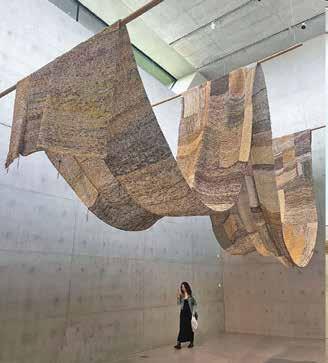


Emeritus Professor John Parkington accompanied a group to the Cederberg on a field excursion to look at rock art. Participants looked at some of the more detailed and explicit paintings to try to understand the painters’ intentions and to discover the painted landscape they created, without ever, apparently, painting a tree, a river or a mountain.
The Hong Kong Tour group and some of the art they viewed
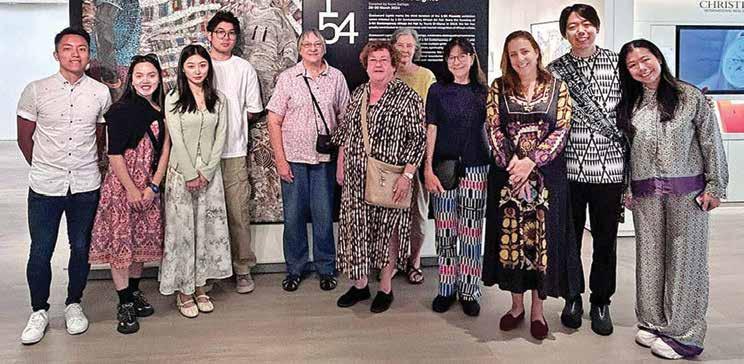

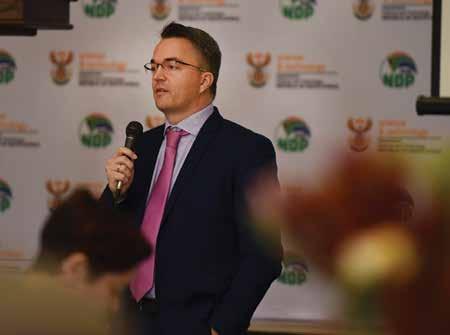
Emeritus Professor John Compton led an expedition to examine the geology of Table Mountain. Professor Patrick Woudt led a 3-day excursion to Sutherland where participants experienced viewings through the telescopes, lectures and two planetarium shows.
EMS hosted a Saturday Summer School for grade 10, 11 and 12 learners in Masiphumelele. This is to assist them to get good grades and prepare them for tertiary studies. The Saturday class epitomised the spirit embedded in Masiphumelele’s name – to strive for success. Despite facing significant socio-economic challenges, initiatives such as this, young learners have the opportunity to gain valuable knowledge and inspiration to pursue their dreams.



The South African production of Shakespeare’s Othello, with a stellar cast and crew premiered at the Baxter in May. Lara Foot, CEO and artistic director at The Baxter Theatre, adapted and directed the Shakespeare classic. The production was performed in English, isiXhosa and Afrikaans.
Foot focused on Othello’s inner life, adding an African perspective, staging the play in several languages, relocating it to the time of German colonialism, to the time of the Herero uprising in German Southwest Africa, to present-day Namibia.
The production was hailed as a triumph by critics, audiences and academics. High praise was received from Professors Pumla Gobodo-Madikizela and Thuli Madonsela, as well as from others like Dame Janet Suzman, Dr John Kani and the Western Cape minister of Cultural Affairs and sport. Some 10 000 audience members and nearly 3 000 learners from over 50 schools throughout the Western Cape attend the highly acclaimed production.
Professor Shose Kessi, Dean of Humanities at the University of Cape Town commented, “The adaptation of Shakespeare’s Othello by Lara Foot was an ambitious and provocative

decolonial interpretation of the original piece. Set in Namibia (then German South-West Africa), it invites audiences to grapple with the legacies of the brutal violence of colonization hinting at the Herero and Nama genocide in the early 20th century.”
Other productions which featured at the Baxter included:
Philip Miller’s highly acclaimed Nkoli: The Vogue-Opera, made its Cape Town debut with a cast of more than 26 top singers, dancers, voguers and musicians. The highly contemporary production contained a mix of rap, opera, protest songs and archival audio clips.
Land justice and affordable housing were the themes highlighted by the award-winning Tiisetso Mashifane, in the world premiere of Neighbourhood at the Baxter Theatre in August.
Below: Neigbourhood

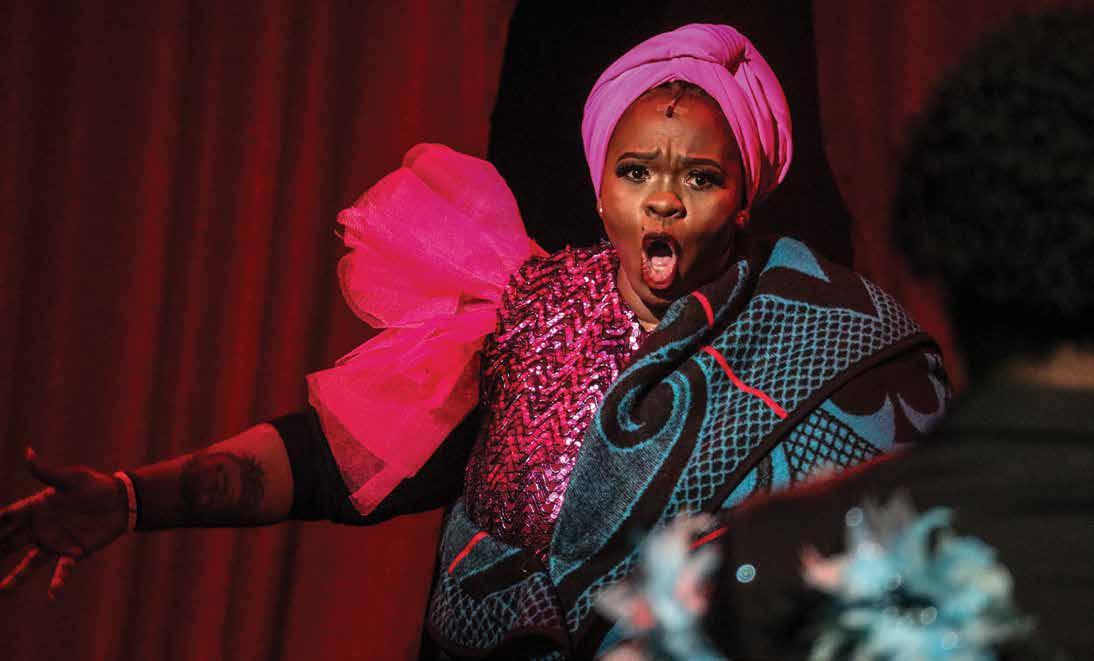
The 2024 Baxter Zabalaza Theatre Festival Best Production winner, Invisible Scars, tackled gender-based violence. It traced the world of a young, reckless soccer star - once celebrated for his talent on the field - who slowly spirals out of control, from alcohol and drugs.
Joburg Ballet presents Scarcity, a quartet of exhilarating dance works. The ballet explored the social context of our lives, addressing the absence of natural and material resources and the loss of memory, identity, and self.
The award-winning TV, film and stage actress, Shannon Ezra, starred in Susan Miller’s, My Left Breast, the poignant story of a gay mother dealing with cancer.


DEVELOPMENT AND ALUMNI DEPARTMENT:
Sarah Archer
Executive Director: Development & Alumni Department
Sarah.archer@uct.ac.za +27 21 650 5458
Melverna Joe
Deputy Head of Philanthropy
Melverna.joe@uct.ac.za +27 21 650 4419
Cindy De Oliveira
Head of Alumni & Stakeholder Engagement
cindy.deoliveira@uct.ac.za +27 21 650 4825
Katherine Wilson Communications Manager
Katherine.wilson@uct.ac.za +27 21 650 2574
Nomcebo Msweli
Alumni Relations Manager
nomcebo.msweli@uct.ac.za +27 21 650 4140
Lu Nteya
Alumni Relations Coordinator
lu.nteya@uct.ac.za +27 21 650 1201
FACULTY ALUMNI RELATIONS MANAGERS: Commerce
Helga Halvorson
Helga.halvorson@uct.ac.za +27 21 650 1593
Engineering & the Built Environment
Justin Marthinus
justin.marthinus@uct.ac.za +27 21 650 4108
Humanities
Morongoa Mothiba morongoa.mothiba@uct.ac.za
Health Sciences
Linda Rhoda
linda.rhoda@uct.ac.za +27 21 650 6686
Law
Gabrielle Ritchie
gaby.ritchie@uct.ac.za +27 21 650 5602
Science
Hishamodien Hoosain
Hishamodien.hoosain@uct.ac.za
+27 21 650 1400
INTERNATIONAL OFFICES:
UK
UCT Trust
Angela Edwards uct-trust@tecres.net
Europe
Andrew Wigley andrew.wigley@uct.ac.za
USA
UCT Fund Inc
Porcha Dodson porcha.dodson@uct.ac.za
Megan O’ Neill megan.oneill@uct.ac.za
Canada
UCT Regional Office
Samantha Mandigora sam.mandigora@uctcanada.ca
Australia
UCT Australian Trust
Ruth Thornton australiantrust@uct.ac.za
Follow us @UCTAlumni
Would you like to join an existing UCT alumni chapter or affinity group in your region, or initiate a new one?
Please contact: nomcebo.msweli@uct.ac.za

Ways to donate are:
• Electronic Funds Transfer (EFT)
• Secure credit card payment
• SnapScan
• Payroll pledge (for staff)
Canada
Samantha Mandigora
Email: info@uctcanada.ca
Website: uctcanada.ca
You can also choose to set up monthly payments for added flexibility. Whether you prefer to donate to UCT as a whole or to a specific project close to your heart, your generosity makes a difference. All donations to UCT are tax-deductible, and
United Kingdom
Angela Edwards
Email: uct-trust@tecres.net
Website: ucttrust.org.uk
tax receipts will be issued within two weeks for single, once-off donations and annually for monthly contributions.
To start your donation journey, please see the contact details below.
Europe
Transnational Giving
See contacts below
United States
Porcha Dodson or Megan O’Neill
Email: info@uctfund.org
Website: uctfund.org
Belgium
King Baudouin Foundation
Tel: +32 2 549 0231
Email: tge@kbfs-frb.be
Netherlands
OranjeFonds
Tel: +31 30 656 4524
Email: tge@oranjefonds.nl
South Africa
Email: giving@uct.ac.za
Website: alumni.uct.ac.za
Australia
Ruth Thornton
Email: australiantrust@uct.ac.za
Website: ucttrust.org.au
France
Fondation de France
Tel: +33 1 442 187 60
Email: tge@fdf.org
Spain
Fundación Carlos de Amberes
Tel: +34 9 143 522 01
Email: tge1@fcamberes.org
Germany
Maecenata Stiftung
Tel: +49 30 2838 7909
Email: tge@maecenata.eu
Switzerland
Swiss Philanthropy Fund
Tel: +41 2 273 255 54
Email: tge@swissphilanthropy.ch
* A minimum donation of CHF500 is applicable CLICK
